In Our Power is a series of stories produced by the Ecology Action Centre of ordinary people and diverse communities in Atlantic Canada working to create a just transition to a green economy. The people in these stories — artists, students, businesspeople, civil servants, activists, people in faith communities and more — have not shied away from the realities of climate change. Instead, they are stepping up to change how we get our energy, and reduce how much we need, while maintaining a world in which people can thrive. We hope you enjoy learning from these communities as they work to switch to renewable and more efficient energy sources — and ensure their communities are strong and resilient.
Follow the Ecology Action Centre on Instagram, Twitter or Facebook to get notified of new posts from In Our Power! Or subscribe to the Culture of Efficiency newsletter.
Recent posts

Introducing The Great Adventure of ESBy the Electric School Bus, an Ecology Action Centre Children's Book
by Aby Lefebvre
The Ecology Action Centre is releasing a kids book!
What if your school bus could help change the future? The Ecology Action Centre is thrilled to announce the release of a brand-new children’s book that brings climate action to life through the story of one small but mighty electric school bus, hoping to change the future.
ESBy Inspires Nova Scotia to Welcome Electric School Buses | Feb. 26, 2026
The Great Adventure of ESBy the Electric School Bus follows the journey of a resilient little electric school bus from British Columbia who travels all the way across Canada to Nova Scotia. Along the way, ESBy meets new friends, overcomes challenges, and shares an important message about clean transportation and climate leadership.
With heart, humour, and determination, ESBy hopes to inspire Nova Scotia to welcome more electric school buses and to show young readers that big change often starts with small, courageous steps. At its core, the story is about friendship, perseverance, and the power we all have to shape a healthier future.
 Written by the Ecology Action Centre’s Senior Energy Coordinator, Chris Benjamin, and illustrated by Energy Coordinator Abby Lefebvre, this book was created to help youth connect with environmental issues in a way that feels personal and empowering. By focusing on something many students experience every day, school transportation.
Written by the Ecology Action Centre’s Senior Energy Coordinator, Chris Benjamin, and illustrated by Energy Coordinator Abby Lefebvre, this book was created to help youth connect with environmental issues in a way that feels personal and empowering. By focusing on something many students experience every day, school transportation.
The story opens the door to meaningful conversations about climate action, renewable energy, and community leadership. The book is available free of charge in both English and French. Copies can be picked up at the Ecology Action Centre between 9 a.m. and 4 p.m., and will also be available at select community events, including an upcoming book launch.
Stay tuned to our social media channels for launch details and happy reading!
The Housing Construction Council's Training Programs Are Building a Green Transition Workforce
by Chris Benjamin
A few months ago, the EAC Energy & Climate team hosted a Better Building Speaker Series event on the economics of building efficiency, how we need to understand that while building efficiently comes with expenses, the savings and benefits are far, far greater.
One of the speakers was Jessica Ward of the Housing Construction Council of Nova Scotia, who spoke about their Housing Construction Training program, which by the end of this year will have given hands-on home-building training to 80 equity-deserving candidates, people who have struggled but through this program have shown themselves to be capable individuals with excellent contributions to make to the green transition.
They will have completed 13 net-zero houses on the mainland and in Cape Breton. I was so inspired, I had to sit down and interview Jessica for this post. Her work shows that the construction industry can be a home for workers from all backgrounds and situations.
Lived Experience with Barriers Informs Solutions to Training Needs | Jan. 22, 2026
Jessica Ward, HCC
Chris Benjamin: How did these three programs come to be?
Jessica Ward: The sector council participated in developing training with Nova Scotia Community College. We developed an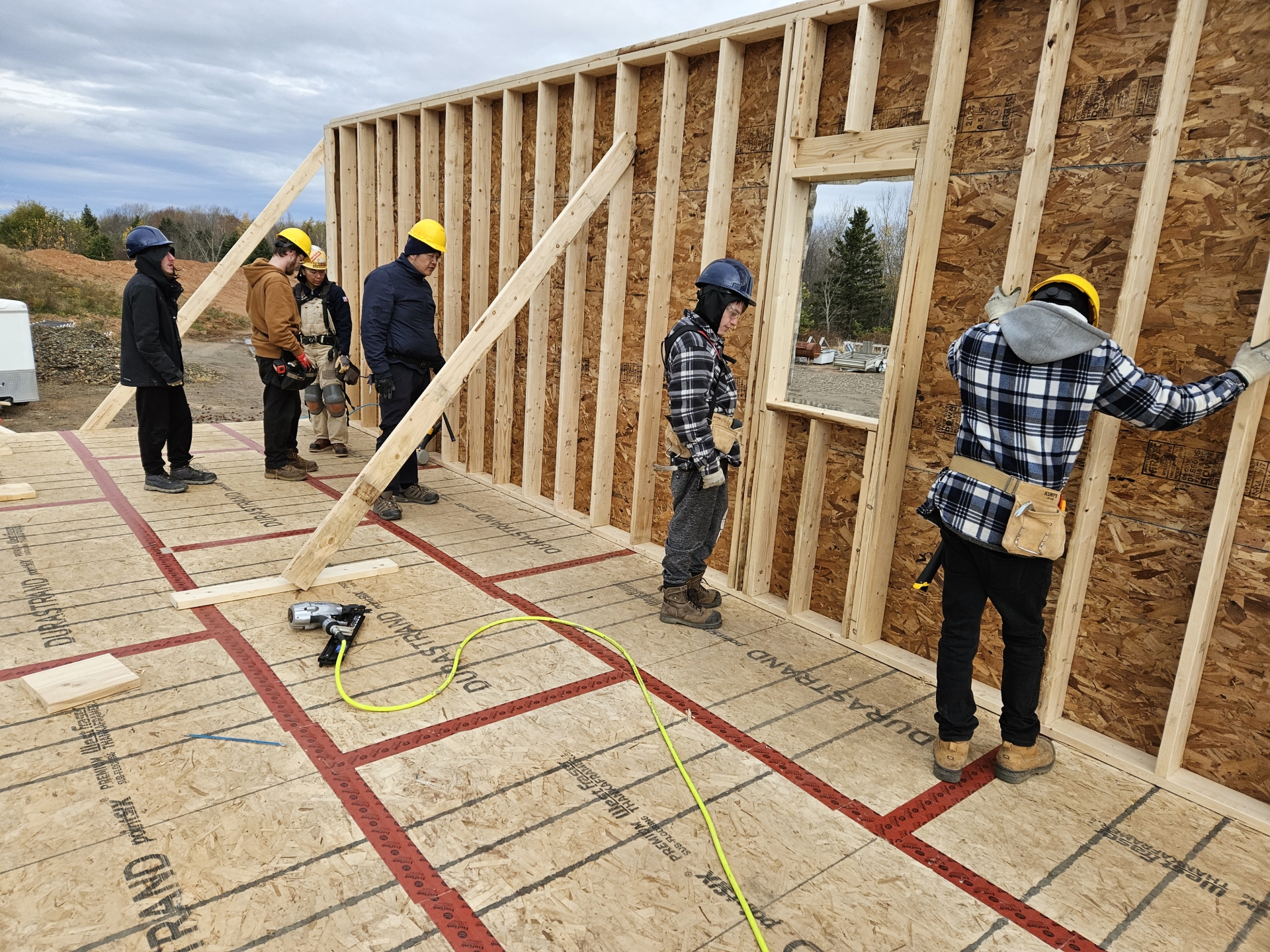 eight-week training program on housing-construction fundamentals. It was skills developed on various construction projects ranging from building picnic tables to finishing walls. It didn't have a full construction piece.
eight-week training program on housing-construction fundamentals. It was skills developed on various construction projects ranging from building picnic tables to finishing walls. It didn't have a full construction piece.
We knew there was a need for training but it wasn’t as successful as it could have been so we went back to the drawing board. That’s when I started working for the Housing Construction Council. And this part of the story gets a bit personal. My son had experienced homelessness for a long time. I was always his main advocate. We reached a point where he could enroll in a program like this. But he had a lot of barriers. He didn't have Grade 12 so he could not have done the micro-credential with NSCC. He had started his GED (high school equivalent) but then it was nationalized and he had to start over. He lived in rural Nova Scotia and did not have access to reliable transportation. He was very representative of folks who are unemployed.
All this lived experience really informed my work. And we took what was helpful from the first program, for example working with partners like NS Works, who are employment experts. We needed more wraparound supports. We needed to provide proper tools because many learners don't have any. We worked with a red seal instructor and they needed more support in teaching, especially for learners with learning disabilities.
We put all the pieces together and built out a curriculum. Then in 2024, the Province allowed development of micro-credential with post-secondary and industry working together. But we partnered with secondary schools, regional centres for education, and Cape Breton University, which had experience in micro-credentials in net-zero and affordable housing with the Nova Scotia Nonprofit Housing Association. All three organizations partnered on curriculum.
And we met with industry to ensure we met their needs. They identified gaps in learning, sometimes how to swing a hammer, or properly install windows, energy efficiency and net-zero knowledge. Passive house knowledge. Keeping up with new building codes. We updated the curriculum with the 2020 building codes. 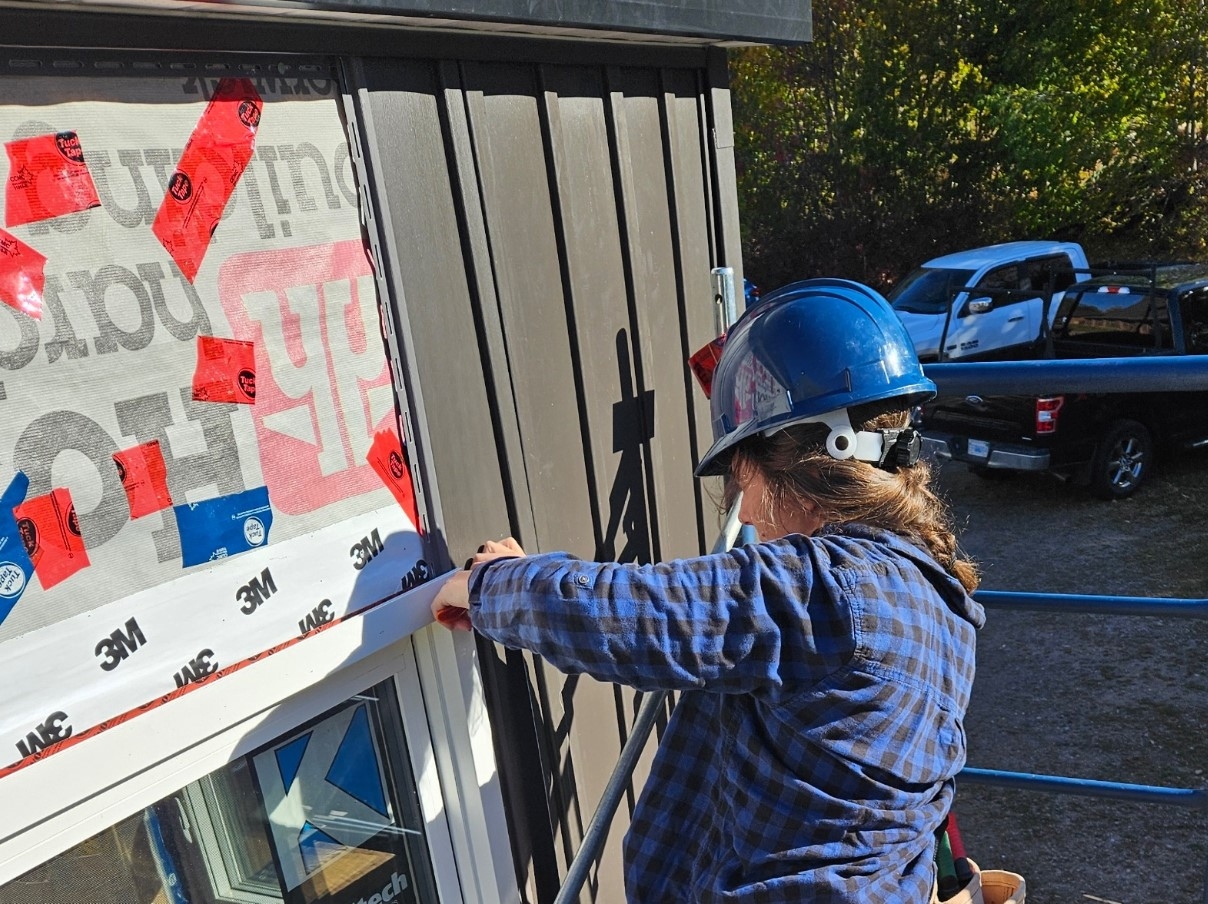 All that led to our Annapolis Valley pilot project from September 2024 to June 2025. My son was one of our first graduates. He was chosen to be in the program, but they didn’t know we were related. He’s been working in construction ever since. He may want to become a heavy-machinery operator.
All that led to our Annapolis Valley pilot project from September 2024 to June 2025. My son was one of our first graduates. He was chosen to be in the program, but they didn’t know we were related. He’s been working in construction ever since. He may want to become a heavy-machinery operator.
You could insert any person with barriers. It helped that I had lived experience with his challenges: lack of rural transportation, accessing income assistance. needing warm clothes for the job site. Understanding that the privileges some of us have don’t exist across the board. Everybody in our programs gets boots and warm clothes.
CB: What have been the outcome?
JW: We trained 24 individuals from September to June, in three cohorts. Nineteen graduated. All 19 went to work or onto college.
They built three net-zero energy ready homes last year. This year we are running three curricula concurrently, in Cape Breton, King’s County and Annapolis County.
We’ll have trained 80 people by year end, completing 13 houses. Our goal is 280 trained by next year in all seven regional centres of education. We're getting the pieces in place. We have to get the school boards in. a red seal to cover the area, which involves travel within a 100-130 km radius. We have to be enough services available for wrap around supports. We can’t do it on our own. The status quo wasn’t going to work with the housing need right now.
CB: Who lives in the homes?
JW: In Cape Breton, the units are part of New Dawn’s affordable housing portfolio. We have six 2-bedrooms in Lawrencetown. We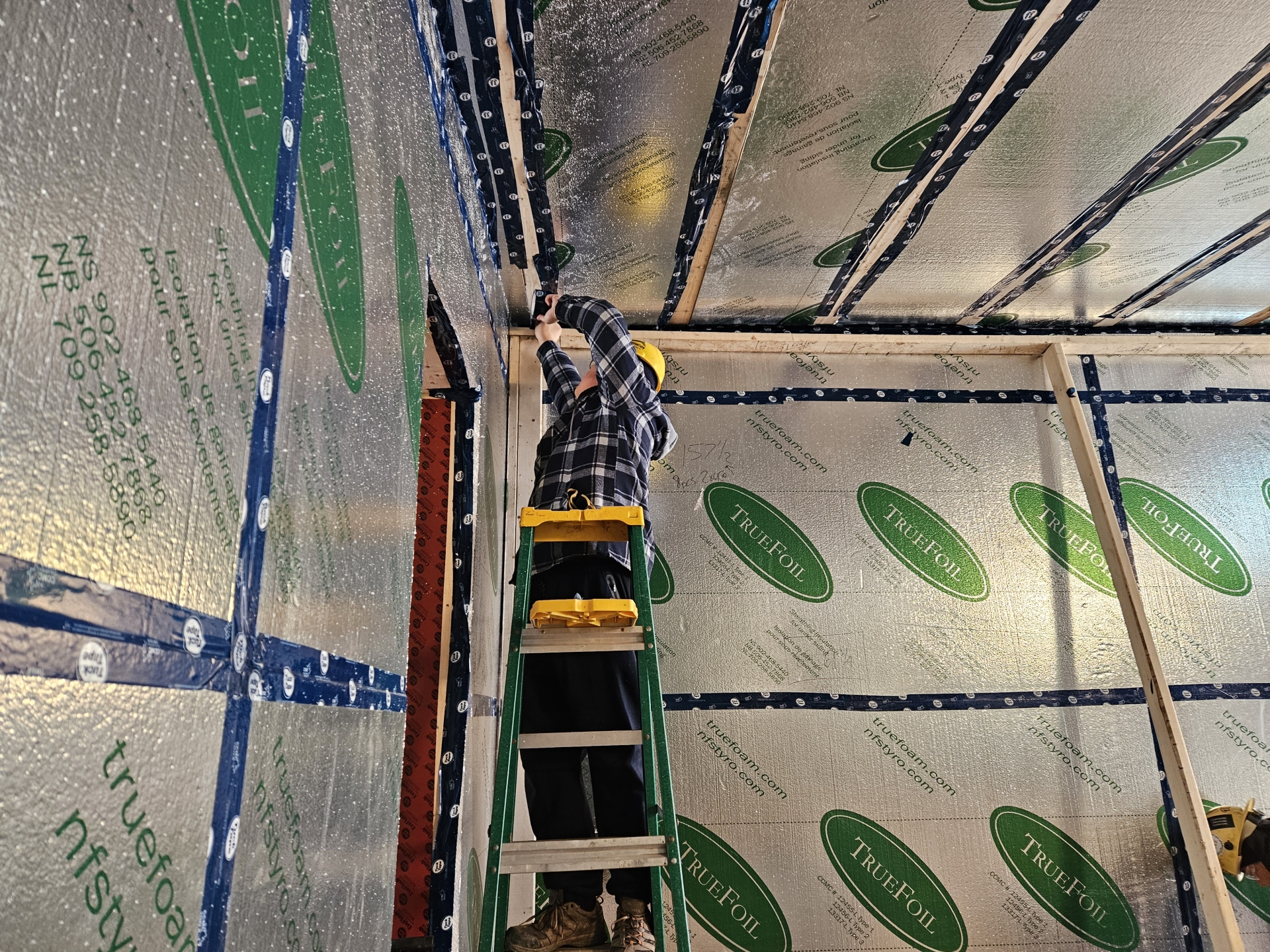 partnered with the Rotary, ensuring they go to those in particular need of homes, who don’t have the means. We have three1-bedroooms that will be affordable housing in Kentville, Coldbrook and Lawrencetown. We are partnering with nonprofit housing providers. It's based on needs of individuals.
partnered with the Rotary, ensuring they go to those in particular need of homes, who don’t have the means. We have three1-bedroooms that will be affordable housing in Kentville, Coldbrook and Lawrencetown. We are partnering with nonprofit housing providers. It's based on needs of individuals.
CB: What energy-efficiency features are included?
JW: Heat pumps, HRV systems. We do a double wall for insulation, almost a foot thick. High efficiency hot water heaters. Energy efficient appliances. Rooftop solar to make them net zero energy ready. Triple pane windows. Fibreglass doors. And we work with Passive Design Solutions to maximize efficiency. Efficiency Nova Scotia’s New Home Research Project has been a big help.
CB: What would you tell business owners about all this?
JW: Come out and see it for yourselves. We do an open house midway through the project. Employers can see the work being done. It’s like a living resume.
They can watch learners doing the mudding on drywall, installing windows. We have asked industry and included what they tell us they need. We have multiple safety certifications in the program, life confined spaces and asbestos awareness training, fall arrest training for roofers. Learners use scaffolding every day. They use pneumatic, power, and hand tools.
All but two weeks of the program is learning by doing. They learn by making mistakes. They are learning what’s new in energy efficiency. While not becoming red seals, they learn about all levels of the trades, good work habits and why these things matter, The whys and hows.
We've trained all kinds of works. From age 16 to 59 have participated. We've worked with actively homeless people. People from shelters. People who were in prison. People just getting off parole. We'll soon have someone on a day pass while incarcerated. People with disabilities. LGBTQ+, African Nova Scotians, Indigenous particpants. We have women red seals and men red seals as trainers. And we're getting a lot more women participating: 4 of 10 in the current Cape Breton program.
Construction can work for anyone and we want to show it. Our apprentices want to work with any red seal who will give them a chance.
CB: Thank you for your great work and sharing your story with us.
JW: My pleasure.

Efficiency = Affordability
by Hannah Minzloff
Do you struggle to pay your utility bills? Are you living in a drafty home? Want to do something about climate change?
These are the questions Juli Bishwokarma and I asked during our November rural libraries workshop tour. We met with people in the community to talk about tips on home energy efficiency for renters and home owners, review the most effective order in which to undertake energy efficiency retrofits, and share information about Efficiency Nova Scotia’s excellent rebate programs. We also presentede information about ways we can all take action to support EAC’s proposed solutions to reducing our energy bills and lifting people up out of Energy Poverty.
Home Energy Efficiency--Our Part for the Planet | Dec. 3, 2025
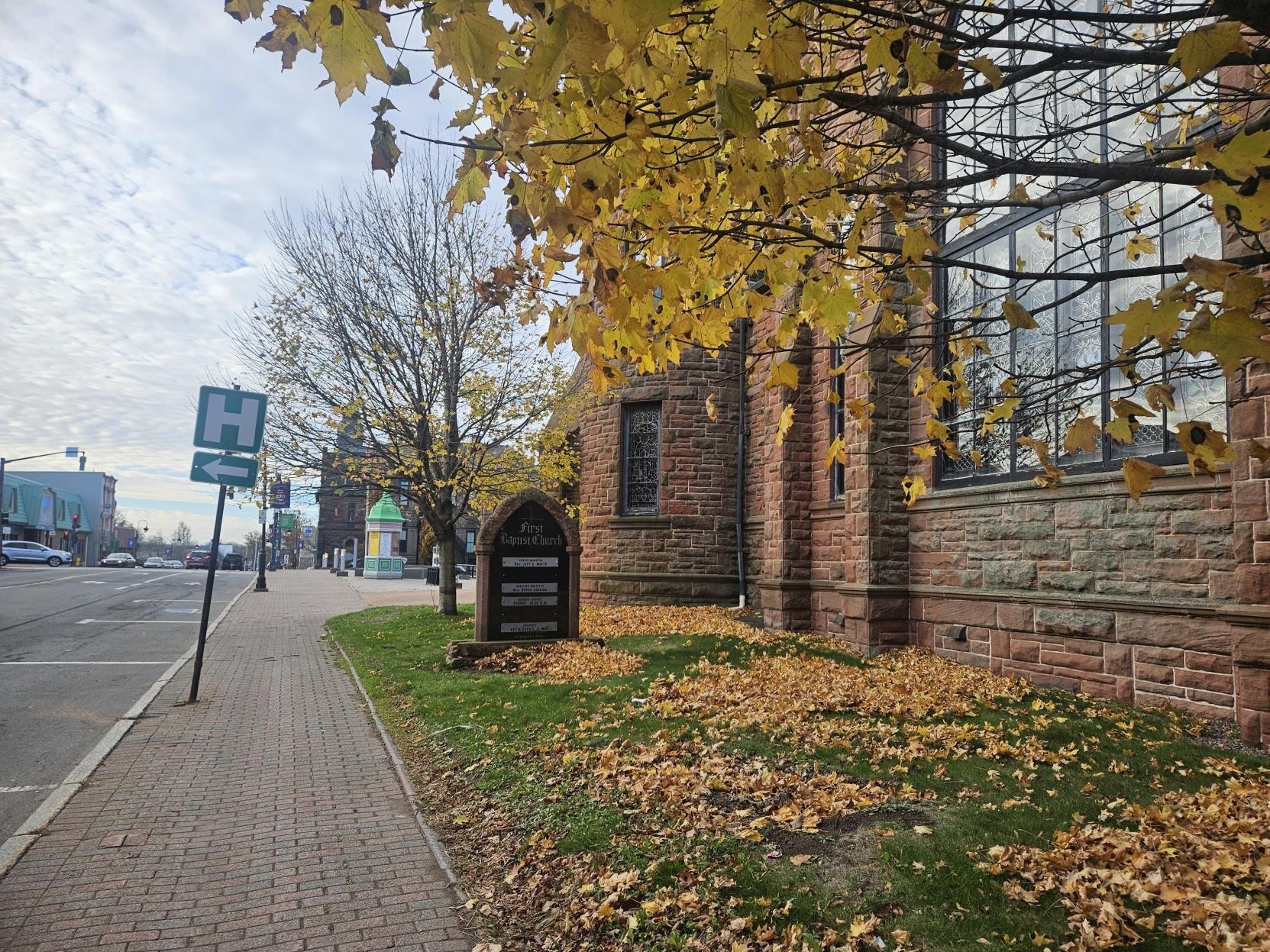 My absolute favourite part of community workshops is the time spent in conversation with the public! I love hearing people’s personal stories about their old drafty homes, a new solar EV panel installation, the way a home's previous owner built cool features into the home like a way to collect rainwater for indoor use, or the time they found seaweed insulation in their walls.
My absolute favourite part of community workshops is the time spent in conversation with the public! I love hearing people’s personal stories about their old drafty homes, a new solar EV panel installation, the way a home's previous owner built cool features into the home like a way to collect rainwater for indoor use, or the time they found seaweed insulation in their walls. 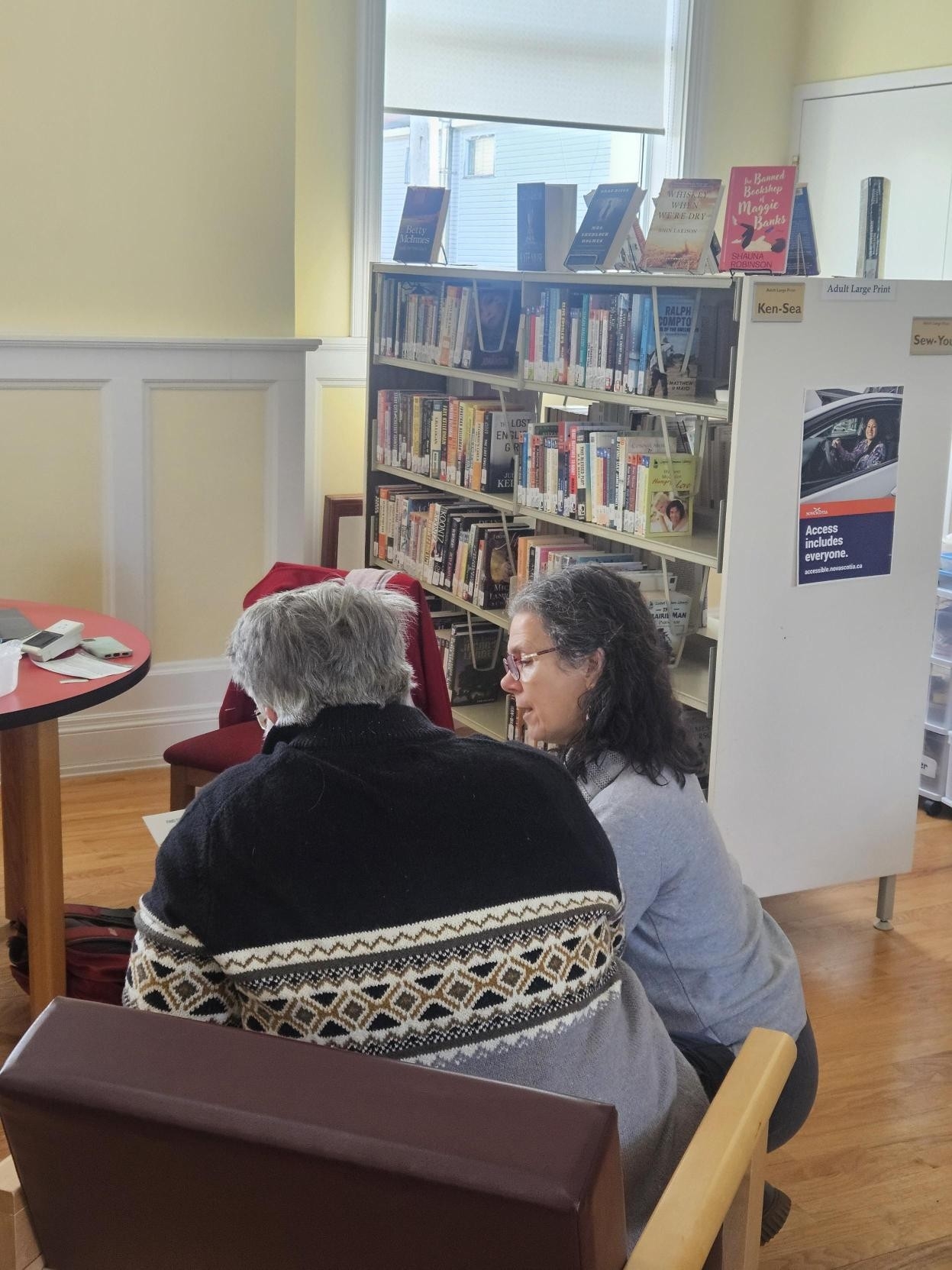
I urge you to consider doing what you can to make your home more energy efficient. Efficiency Nova Scotia is there to support you every step of the way. Your home will be more comfortable, it will be healthier, and your energy bills will go down. And you can feel great that collectively as Nova Scotians we're moving the whole province closer to reaching our targeted greenhouse gas reduction targets—doing our part for the planet.
One participant shared that the workshop was "life changing" literally. I'm so grateful for the Efficiency Energy & Affordability program."
Photo credits: Juli Bishwokarma
Halifax takes part in Draw the Line
by Badia Nehme
On Sep. 20, 2025 activists, organizers and organizations of all ages and sectors came together to tell the government that it was time to draw the line against putting profit over people, Ignoring Indigenous voices and sovereignty, fueling the war machine, alienating and devaluing migrant workers and immigrants and perpetuating climate change.
An International Day of Global Action and Resistance | Oct. 23, 2025
This was an opportunity to bring people together to learn and advocate for a just future. The event lasted from 1 - 4 p.m. at Grande Parade in Halifax.
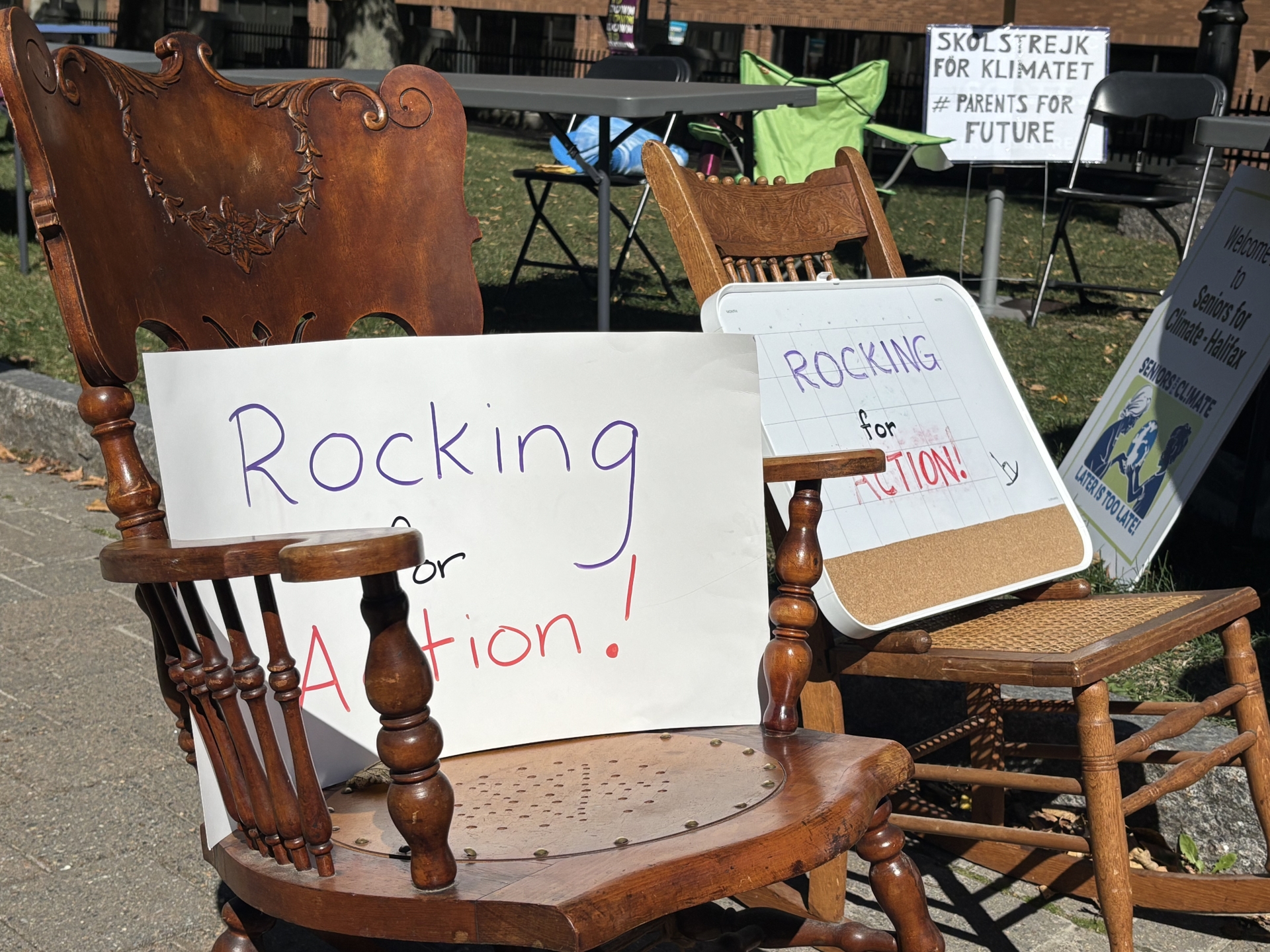 Organizations and activists had the option of setting up a booth with information and calls to action. Seniors for Climate had rock for climate rocking chairs, the Workers Action Centre had sock puppets for activism, several petitions were tabled, the Ecology Action Centre had eco-trivia as well as post cards for Prime Minister Carney where you could demand a just climate future.
Organizations and activists had the option of setting up a booth with information and calls to action. Seniors for Climate had rock for climate rocking chairs, the Workers Action Centre had sock puppets for activism, several petitions were tabled, the Ecology Action Centre had eco-trivia as well as post cards for Prime Minister Carney where you could demand a just climate future.
It was not just a day of learning it was also a day filled with calls to action through music and speeches. Melissa Marsman, secretary treasurer from the Nova Scotia Federation of Labour, highlighted Nova Scotia’s energy growing affordability crisis:
“Right now we see workers putting in long hours and sometimes working two or three jobs and still not making enough to pay rent. We see people on social assistance scrape by on rates that don’t even cover basic needs, and we see students leaving school buried in debt. We also see seniors choosing between paying for their prescriptions or paying their power bill. Meanwhile corporations brag about record profits and handing out millions to executives, while families line up at food banks! That is not a coincidence that is an economy designed to reward greed over need! And we say no more!”
 This was not the only call for change. Dr. El Jones recited poems highlighting the iolence of genocide, its impact on humanity and the people of Palestine. It is time for Canada to stop funding war and genocide! Violet Paul, a Knowledge Keeper with Sipekne’katik First Nation brought this conflict closer to home by highlighting Canada’s history of genocide and the current treatment of Indigenous peoples, directly challenging Prime Minister Carney’s Building Canada Act, which seeks to bypass checks and balances including Indigenous consultation for the sake of “nation building” that would only benefit corporations.
This was not the only call for change. Dr. El Jones recited poems highlighting the iolence of genocide, its impact on humanity and the people of Palestine. It is time for Canada to stop funding war and genocide! Violet Paul, a Knowledge Keeper with Sipekne’katik First Nation brought this conflict closer to home by highlighting Canada’s history of genocide and the current treatment of Indigenous peoples, directly challenging Prime Minister Carney’s Building Canada Act, which seeks to bypass checks and balances including Indigenous consultation for the sake of “nation building” that would only benefit corporations.
Stacey Gomez from the Centre of Migrant Workers Rights highlighted the mistreatment and exploitation of migrant workers; their labour is essential to Canada and it is time they are granted immigration status and granted far more protections then they currently experience.
I had the privilege of speaking for the EAC and highlighted the connection between people and the environment. We need to listen to the traditional and rightful stewards of the land and follow the voices of Indigenous peoples. We should not forsake our health and environment for corporate greed and the exploitation of workers. I highlighted how war fuels climate change and that the exploitation of migrant workers is deeply integrated into our agricultural production. We need to create a localized, sustainable food system.
Nova Scotians, Canadians, and people around the world deserve better from their governments. They need governments that serve the people and not the rich few. We need to demand governments and a society that prioritize people, listen to Indigenous communities respecting sovereignty, stops the proliferation of war, recognizes the status of migrant workers and newcomers and protects our environment.
It is time we draw the line, here and now, and demand better!
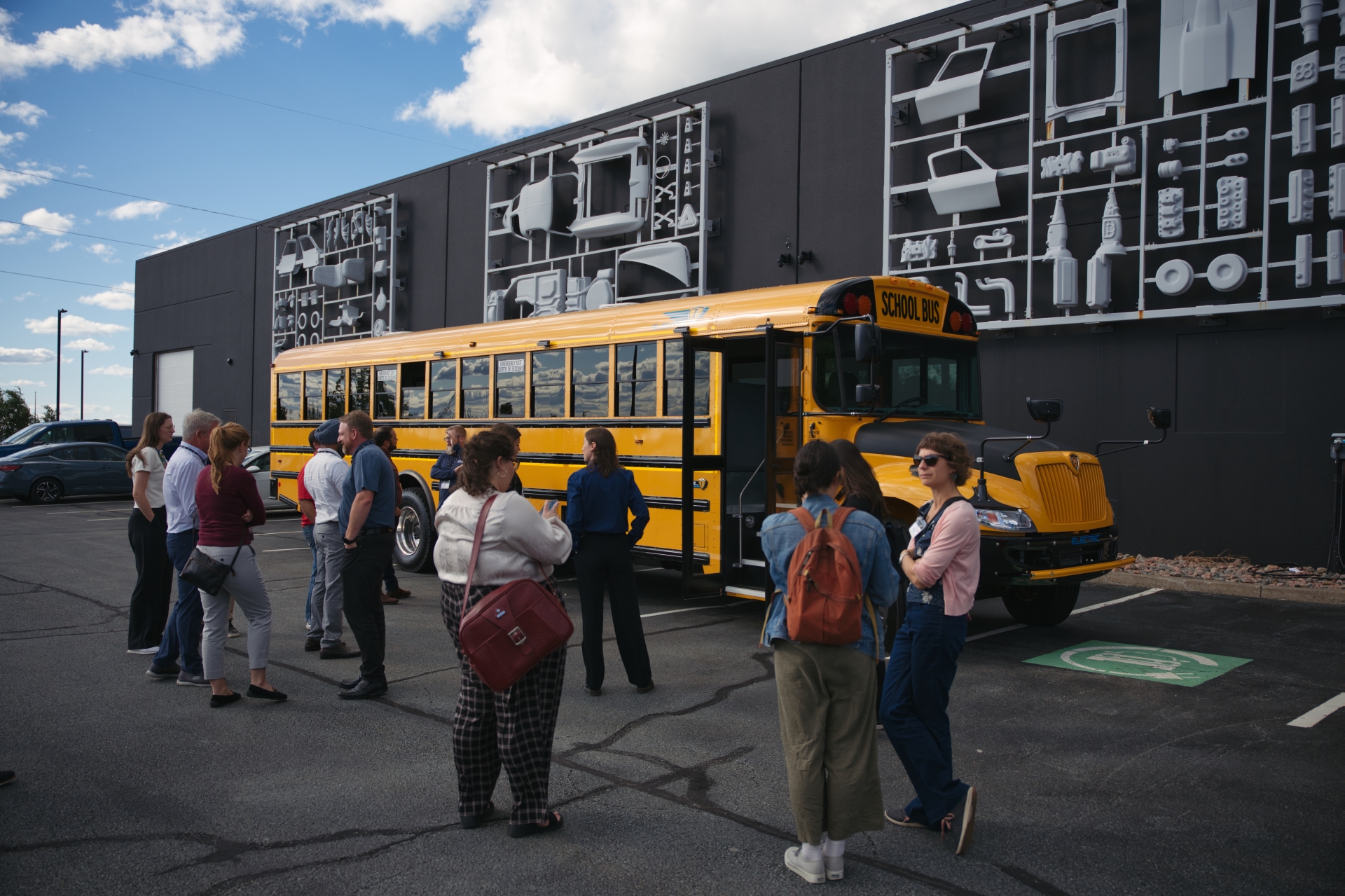
A Day of Fleet Electrification
by Abby Lefebvre
We were thrilled to host “A Day of Electrification” this August, a successful event dedicated to promoting and sharing knowledge about electric school bus adoption. Held in the vibrant and engaging setting of Steele Wheels Motor Museum, the event brought together leaders, innovators, and stakeholders from across the electrification industry.
We're Excited for the Day Nova Scotia Finally Adds Electric School Buses to Its Fleet | Sept. 25, 2025
 Guests heard from International (IC Bus), a trusted name in student transportation since the early 2000s. In 2020, IC Bus launched its line of electric school buses, built specifically for Canadian roads and climates. Known industry wide for its impressive braking system, the IC electric school bus is already making waves in British Columbia, where it first hit the road.
Guests heard from International (IC Bus), a trusted name in student transportation since the early 2000s. In 2020, IC Bus launched its line of electric school buses, built specifically for Canadian roads and climates. Known industry wide for its impressive braking system, the IC electric school bus is already making waves in British Columbia, where it first hit the road.
We also welcomed Rush, a transportation company at the forefront of fleet electrification. We learned about their work on electric-

bus software, charging-battery infrastructure, and cutting-edge technologies like Vehicle-to-Grid (V2G), which enables electric buses to feed energy back into the power grid when plugged in. The event wrapped up with a ride along in an IC electric bus, followed by great food and time to connect with others driving change in the sector.
It was an absolute pleasure to host IC Bus, Rush, Western Canada Bus, and many passionate stakeholders for this inspiring day of learning. We look forward to the day when Nova Scotia joins the rest of Canada in adding electric school buses to its fleet.

How Worried are YOU About Climate Change?
by Kate Brooks
Worldwide surveys tell us the vast majority of us ARE very concerned about climate change—but many of us stop short of taking action on climate in our daily lives. Here in the Halifax Regional Municipality (HRM), a series of public engagements indicated that about 40 percent of adults don’t know how to get involved or don’t feel their actions will make a difference.
Increasingly, people say they’re worried about cost-of-living issues like food, housing, and energy prices. People aren’t connecting the dots between climate change and rising costs.
Every Single Action Matters | Aug 20, 2025
This inaction is a major problem. In HRM, we know that almost 50 percent of the carbon-emission reductions we must make in order to meet our HalifACT climate goals come from individual residents’ choices—how we travel, how we use energy at home, what we eat, etc. Globally, we are now at the point where every fraction of a degree of warming we can avoid is critical. every single action matters.
EAC has been working with HalifACT—HRM’s climate change team—to help residents see themselves in the climate movement. The Climate Commitment Badge Program is one tool we’re developing. It works a bit like Scouts, where you earn a badge for learning new skills and taking action.
 Right now, there are three badges: Climate 101, Home Energy, and Getting Around. Additional badges (Food, Nature, and Community Resilience) will be launched this fall.
Right now, there are three badges: Climate 101, Home Energy, and Getting Around. Additional badges (Food, Nature, and Community Resilience) will be launched this fall.
When you commit to signing up on the program website and taking as many actions as you can, you receive a badge—a beautiful lapel pin designed by local artists.
So, what are these actions? Our definition of “climate action” is broad and includes steps that can help us reduce carbon emissions, prepare for and adapt to the effects of climate change, build resilient communities, and think differently about how we relate to living systems. Instead of a list of “shoulds,” we’ve carefully curated content to inspire you to find YOUR best action. Everyone has differing capacities to act and that’s okay.
The content aims to connect you to local opportunities for volunteering and interaction, and includes many actions that can save you money, improve your health, and strengthen your community. You’ll find videos, podcasts, readings, audio clips, quizzes, and more!
save you money, improve your health, and strengthen your community. You’ll find videos, podcasts, readings, audio clips, quizzes, and more!
The bottom line is this: While our individual actions are not enough to eliminate climate change, our actions DO matter, and many of the steps we can take will improve our quality of life and capacity for resilience. Finding YOUR place in the climate conversation means contributing your unique skills and abilities. While we can’t all do everything, we can all do something!
If you or your community group would like to know more about the Climate Commitment Badge Program, please reach out! I’m happy to visit groups of all kinds and can offer informal conversations, formal presentations, or whatever your organization needs to get the climate conversation going.
Email Kate at kate.brooks@ecologyaction.ca.

Teens for Climate will Empower the Next Generation
by Lauren Furlong
Teens for Climate is an exciting new initiative launched by the Ecology Action Centre (EAC), designed to empower high school students in Nova Scotia (grades 9-12) to take meaningful action on climate change. This program provides a dedicated space where youth can engage in open discussions, collaborate with peers, and work on environmental projects that directly address the climate challenges facing our communities.
Youth Will be at the Heart of the Action | Aug 20, 2025
 At Teens for Climate, young voices aren’t just heard—they’re at the heart of the action. The group focuses on building real, actionable plans with the support of EAC staff, turning ideas into tangible solutions.
At Teens for Climate, young voices aren’t just heard—they’re at the heart of the action. The group focuses on building real, actionable plans with the support of EAC staff, turning ideas into tangible solutions.
Over the course of the year, participants will have the chance to work on long-term projects, attend skill-building workshops, and join monthly online meetings that keep them connected to the growing youth climate movement. Whether you’re passionate about environmental justice, sustainability, or climate advocacy, Teens for Climate offers a dynamic, inclusive environment where Nova Scotia’s youth can make a real difference.
With support from EAC’s experienced team, these young leaders will gain the tools and knowledge to drive lasting change in their communities and beyond.
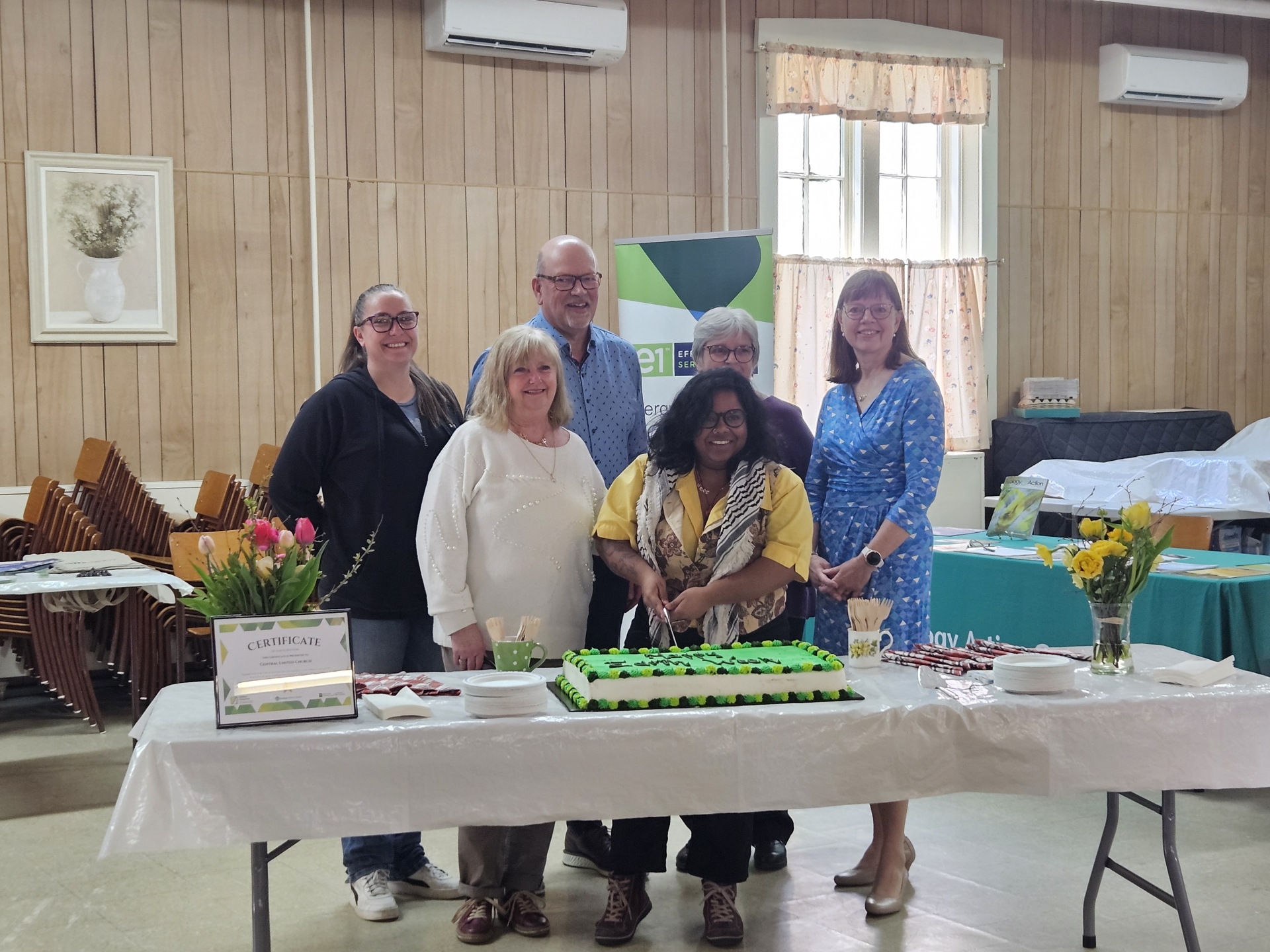
The Atlantic Faithful Footprints Roadshow
by Shreetee Appadu
During the months of March, April and May, I went around to the four Atlantic Provinces to connect with United Church congregations who had retrofitted their buildings for energy efficiency using the Faithful Footprints Program of Faith & the Common Good. The Faithful Footprints Atlantic Roadshow was organized to celebrate the congregations who have successfully who have successfully retrofitted their buildings using the grant and encourage connections between congregations.
Roadshow highlighted successful retrofits and increased community connections | July 24, 2025
Through the Faithful Footprint Atlantic Roadshow, I wanted to connect with as many United Churches as possible. I organized six stops around the Maritimes: Carman United-Cape Breton, Central United Lunenburg, and Grace United in Dartmouth; Sackville United in New Brunswick; and Hilcrest United Montague and Spring Park United Charlottetown in Prince Edward Island.
 The Roadshow participants were all looking forward to sharing their stories of using the grant and encouraging others to follow in their footsteps. All the participants mentioned not only the environmental benefits but also the social and economic benefits that they experienced after doing an energy retrofit. In a true celebratory fashion, many of the events were opened with a choir singing hymns about taking care of the Earth, along with tea and snacks provided.
The Roadshow participants were all looking forward to sharing their stories of using the grant and encouraging others to follow in their footsteps. All the participants mentioned not only the environmental benefits but also the social and economic benefits that they experienced after doing an energy retrofit. In a true celebratory fashion, many of the events were opened with a choir singing hymns about taking care of the Earth, along with tea and snacks provided.
At my first stop in Carman United, the event started with the choir, after which we had Paula Francis and Daniel Mckeough share the retrofit journey of the congregation. Along with them, we also had Marc Stone and Sherry Baccardax from St Peter’s United, who shared their story. Sherry came prepared with a 1-page document of all the resources she used to get the work done, which was very useful for the attendees to have access to.
Then I headed to Sackville in New Brunswick where I was welcomed by Minister Lloyd and Catherine Gaw, who shared that the retrofits not only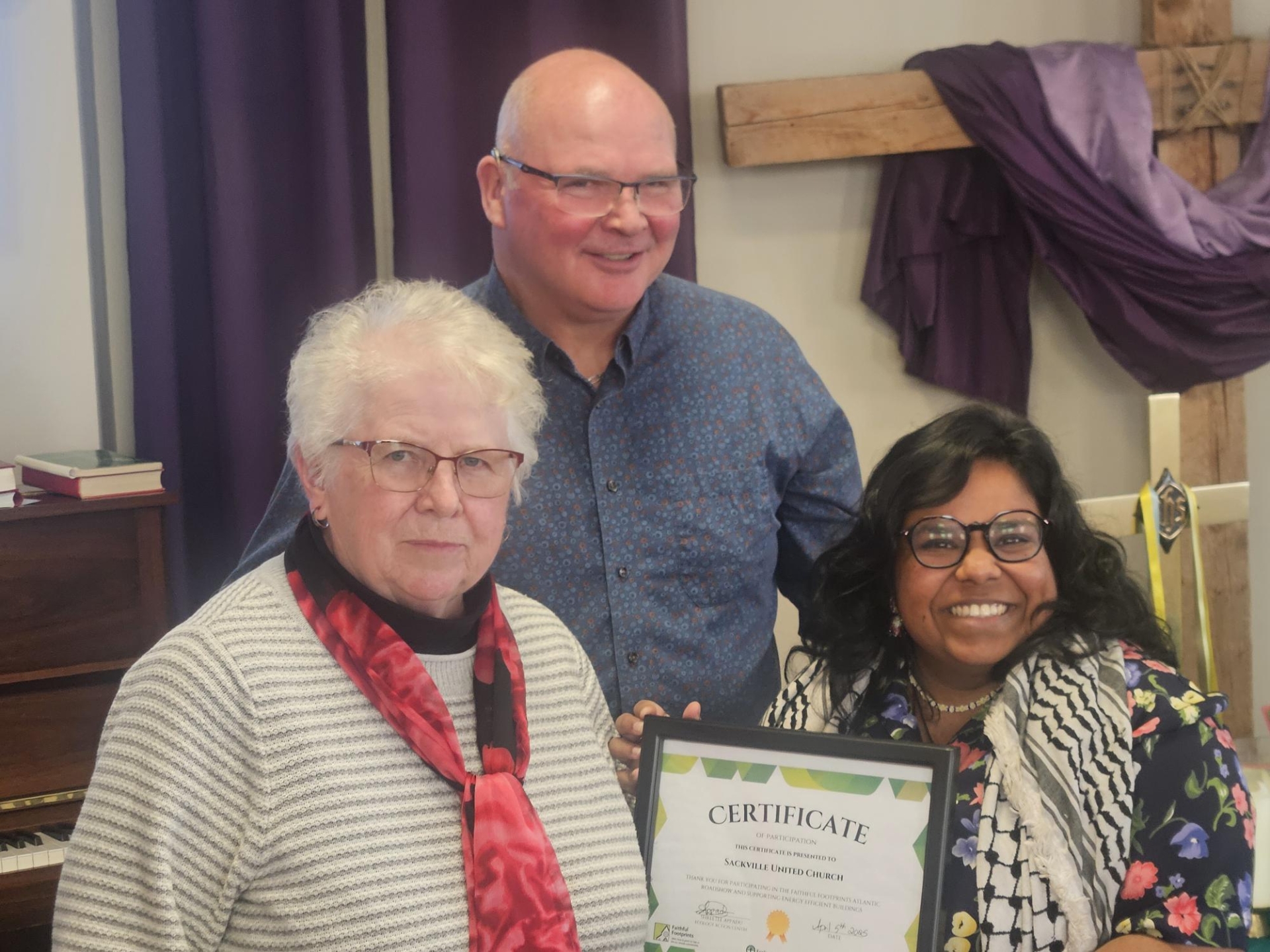 helped them save money but also increased environmental awareness among the members. My next stop was Hillcrest United in Montague in Prince Edward Island, where I met Melissa Mullen and the Green Team who spearheaded the projects and have reduced their oil use by half, saving thousands of dollars since the retrofit.
helped them save money but also increased environmental awareness among the members. My next stop was Hillcrest United in Montague in Prince Edward Island, where I met Melissa Mullen and the Green Team who spearheaded the projects and have reduced their oil use by half, saving thousands of dollars since the retrofit.
Next stop was Spring Park United in Charlottetown, where I attended the service that happened to be on Palm Sunday. I was warmly welcomed by all and along with Kathy Bigsby and Steven Dickie we celebrated the great work done at Spring Park United. On the same day we headed to Park Royal United to do a building tour which connected the 2 congregations even more.
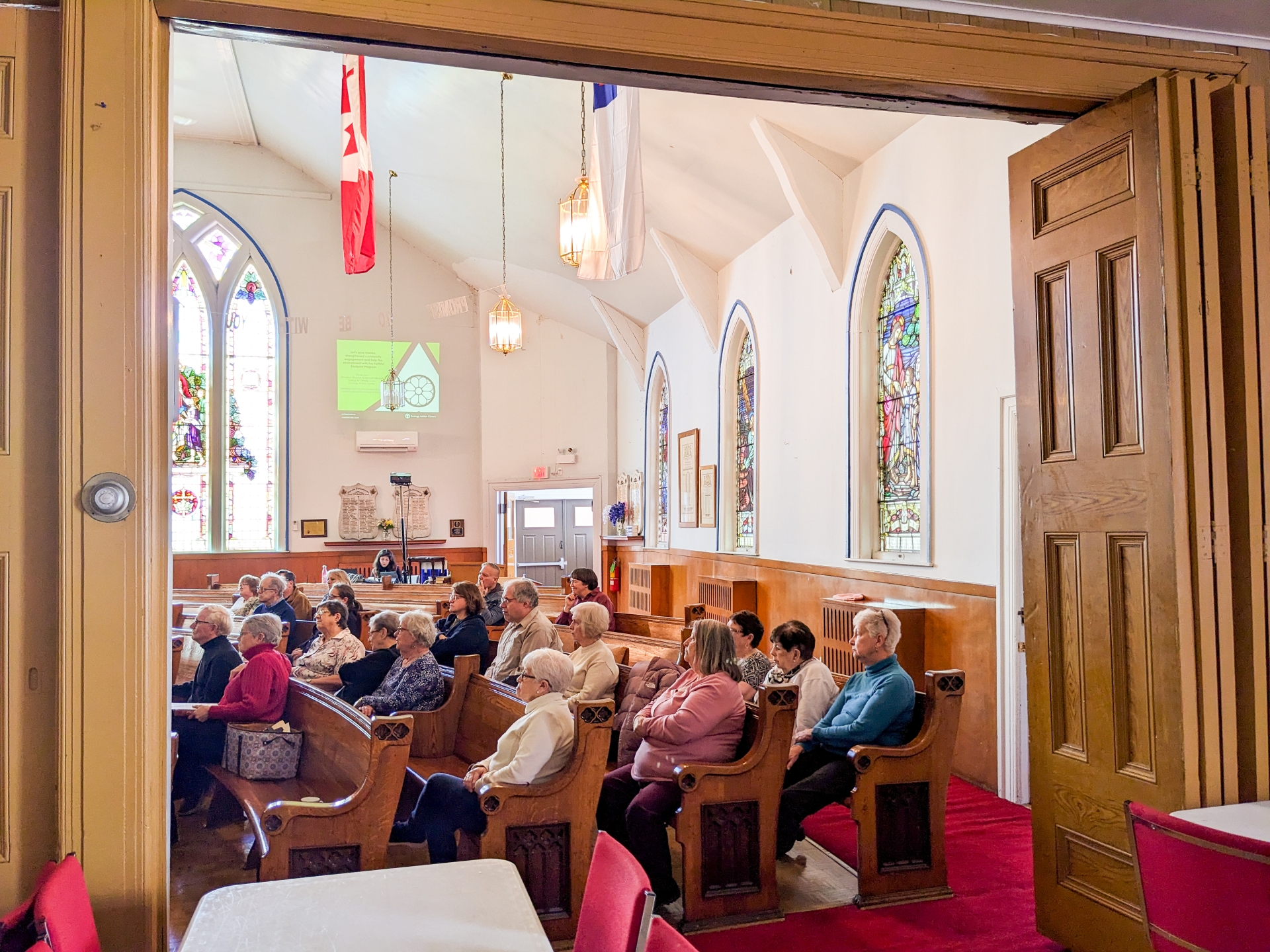 The next event was hosted at Central United in Lunenburg during Earth Week 2025 which is organized by The United Church. This is a week where their communities of faith, networks, and regions are encouraged to participate in climate justice events and to pray, learn, and act for the love of Creation. Collin and Shelley Mann who led the retrofits talked about their journey and challenges in installing 19 Heat pumps in an 1,885 year-old church which is a UNESCO World Heritage Site. The work was not easy but as the Minister shared: “This project that we've undertaken here at Central United is a big part of how we are being a bold and daring, justice-seeking church together.”
The next event was hosted at Central United in Lunenburg during Earth Week 2025 which is organized by The United Church. This is a week where their communities of faith, networks, and regions are encouraged to participate in climate justice events and to pray, learn, and act for the love of Creation. Collin and Shelley Mann who led the retrofits talked about their journey and challenges in installing 19 Heat pumps in an 1,885 year-old church which is a UNESCO World Heritage Site. The work was not easy but as the Minister shared: “This project that we've undertaken here at Central United is a big part of how we are being a bold and daring, justice-seeking church together.”
I wrapped up the Roadshow at Grace United in Dartmouth, where we also commemorated the legacy of Robert Picco, who led the energy retrofits in the church and has since passed. It was truly wonderful to connect with so many congregations and witness their dedication in reducing their carbon emissions, working toward a greener future. From the participants to the attendees, so many stories were shared and being able to engage over tea and coffee reinforced the relationships between members.
Many of the attendees left the events with hopes and reassurance that they too could take on such projects. Although doing an energy retrofit is not an easy task, especially for a group who mostly volunteers their time, many United Churches have shown us that it is possible. Here’s to more retrofitted faith buildings and a greener future.
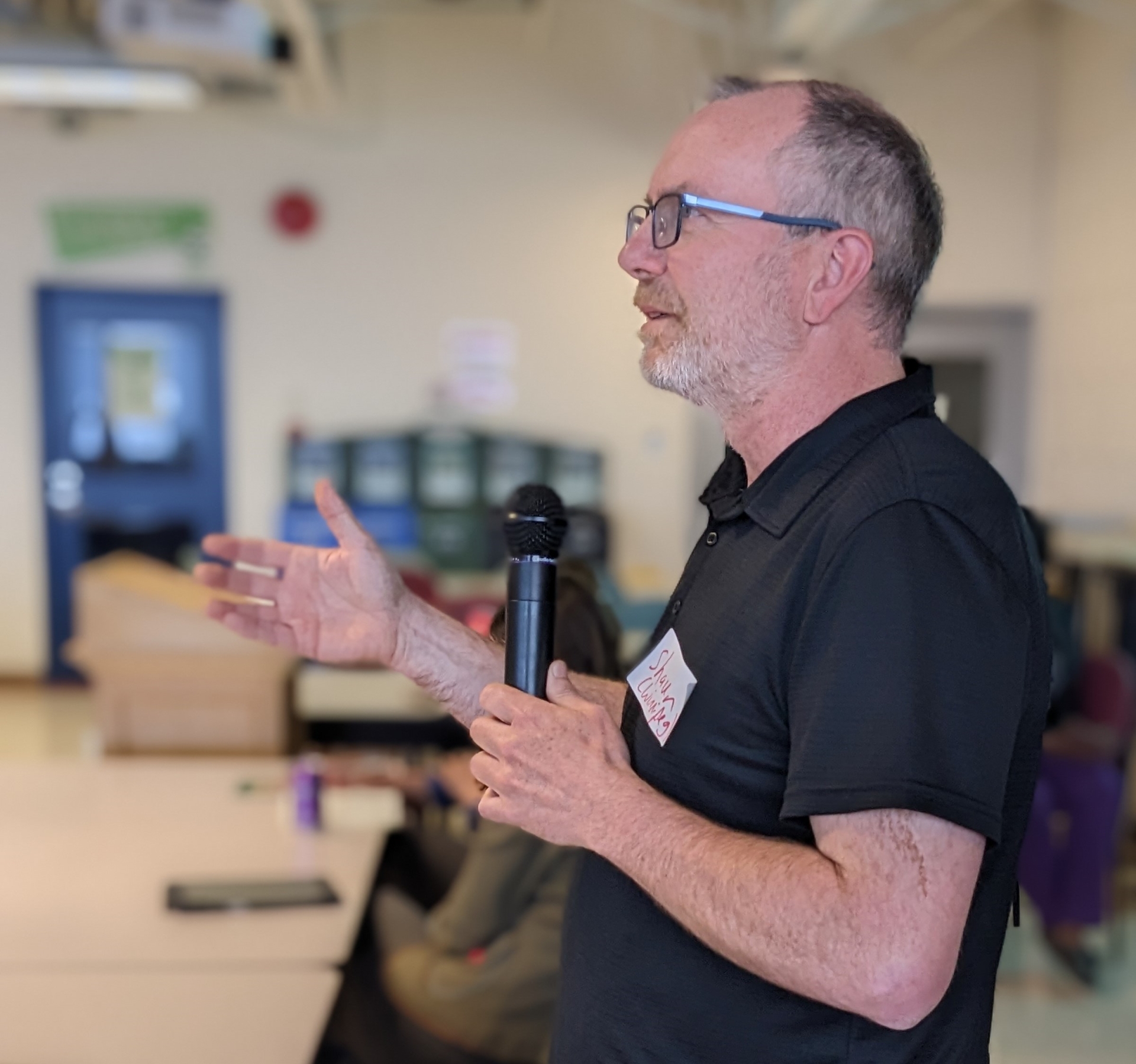
Building Better Through Social Enterprise
by Hannah Minzloff
I first heard about Shaun Loney through his book An Army of Problem Solvers: Reconciliation and the Solutions Economy. I’m generally a fast reader, but this book took me months to get through because I had to keep pausing to take notes, to look things up, and to take time to reflect on what I had learned, and how it could be applied to my work at Ecology Action Centre.
“The only thing that will work is different” | June 26, 2025
Shaun is a Manitoba-based author and social entrepreneur with a strong track record of creating energy transition and employment in First Nations communities. He has co-founded and mentored over a dozen successful social enterprises including BUILD Inc and AKI Energy. In the early 2000s Shaun was director of Energy Policy for the Government of Manitoba. Shaun believes in connecting the people who most need the work with the work that most needs to be done.
This year, our Better Building Speaker Series moved from a virtual platform to in-person. As our first guest of the year, we invited Shaun to come to Nova Scotia to lead a week of engaging workshops and rich conversations.
Shaun’s message is clear: “The only thing that will work is different”.

He asked tough questions: “What is the value of what we're doing? What would happen if we stopped doing this work for a few days, weeks, months, a year?”.
He shared important and surprising facts: Nonprofits are competing with each other for money; Non-profits are subsidizing government; Our solutions save government money; Government is the financial beneficiary of the work we are doing.
We met with the Province’s Clean Buildings staff, the Nova Scotia Native Council, an Indigenous Energy Efficiency start-up, hosted the Building Better in Nova Scotia green jobs report launch, and spent two full days at the Eltuek Arts Centre in Sydney. There we listened and brainstormed with over 40 people about how social enterprise could play a significant role in alleviating energy poverty, while creating opportunities for people to access green jobs training in Unama’ki/Cape Breton, through initiatives like neighbourhood retrofits.
the Building Better in Nova Scotia green jobs report launch, and spent two full days at the Eltuek Arts Centre in Sydney. There we listened and brainstormed with over 40 people about how social enterprise could play a significant role in alleviating energy poverty, while creating opportunities for people to access green jobs training in Unama’ki/Cape Breton, through initiatives like neighbourhood retrofits.
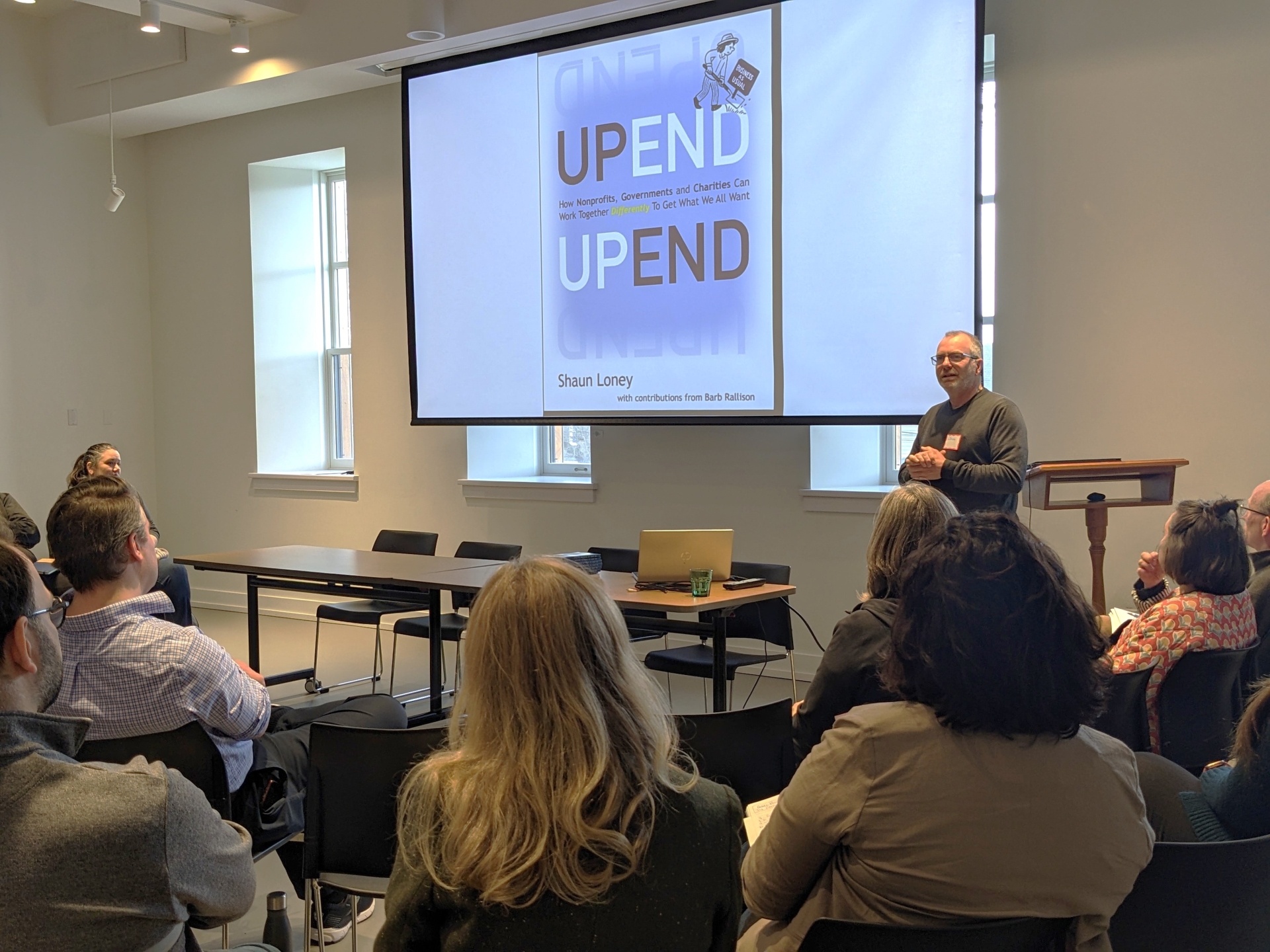 Shaun's new book UPEND, to be released in the coming months, is a toolkit outlining how to make this approach work. Shaun says, “UPEND is the practitioner’s essential guide to unlocking resources for social good. Finally, a practical path to making meaningful progress on addressing homelessness, poverty, crime and climate change.”
Shaun's new book UPEND, to be released in the coming months, is a toolkit outlining how to make this approach work. Shaun says, “UPEND is the practitioner’s essential guide to unlocking resources for social good. Finally, a practical path to making meaningful progress on addressing homelessness, poverty, crime and climate change.”
Let’s get cracking and connect the people who most need the work with the work that most needs to be done.
Building Nova Scotia's Green Workforce
by Chris Benjamin
Ecology Action Centre recently released Building Nova Scotia’s Green Workforce: Addressing Labour Gaps for a Net-Zero Future to a crowded house at Nova Scotia Community College's IT Campus in Halifax. The detailed report looks at building retrofits, which are crucial in reaching greenhouse gas reduction targets. Within this area of energy efficiency, the report identifies which jobs will see the most growth, as well as barriers faced by workers entering the sector.
Remove Barriers for BIPOC, disabled, and gender-diverse workers | May 22, 2025
Speakers included Mani Chakrabarty of ASBB Consulting, lead author of the report, Montanna Labradore of Glooscap Ventures, and Social Entrepreneur and Author Shaun Loney.
We launched a new video called Mi'kmaq Voices in Nova Scotia's Green Jobs Sector, available below, about Montanna and other Mi'kmaw workers in the green economy, from the trades to governance to project management.
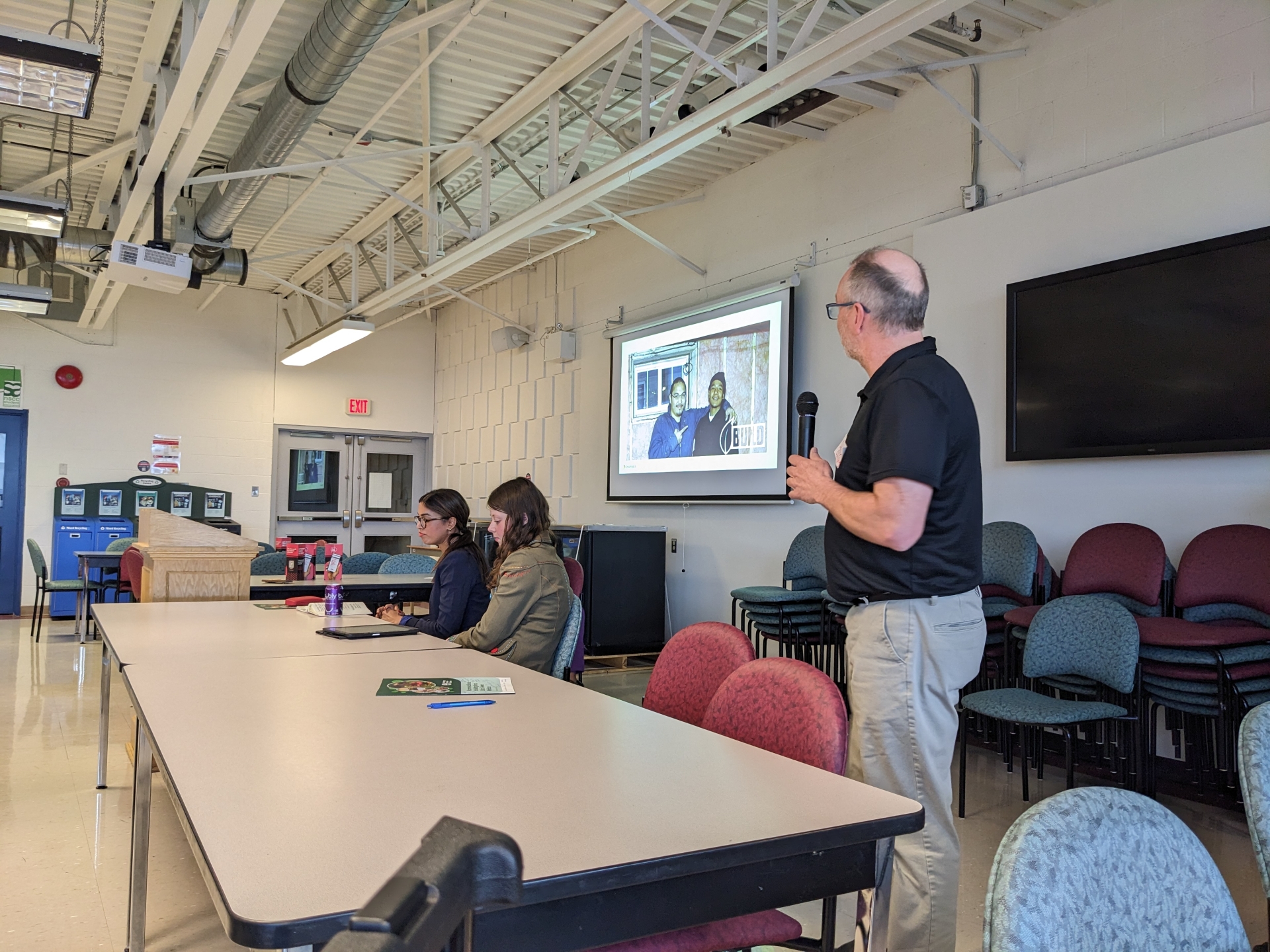 Chakrabarty provided context and detail of the report, its methods and recommendations. Loney inspired with stories of his work in Manitoba founding social enterprises to train Indigenous workers in trades that benefit their own communities, providing better housing and long-term employment security. As Loney says, "it's not outside the box, it's inside the circle."
Chakrabarty provided context and detail of the report, its methods and recommendations. Loney inspired with stories of his work in Manitoba founding social enterprises to train Indigenous workers in trades that benefit their own communities, providing better housing and long-term employment security. As Loney says, "it's not outside the box, it's inside the circle."
After a rigorous Q&A session, Purposeful Group's Lisa Lowthers facilitated a small group session where attendees including civil servants, NGO employees, union members, students, and others discussed the report and how to apply its lessons, what changes are already happening, and how to overcomer barriers to change. Participants found that green jobs can address the inequities of climate change impacts and help communities become self-sustaining, while coping with, adapting to or remediating the consequences of a changing climate. These jobs are invaluable in the fight against the climate and biodiversity crises, and can be the building blocks of a vibrant, sustainable economic future for Nova Scotia.
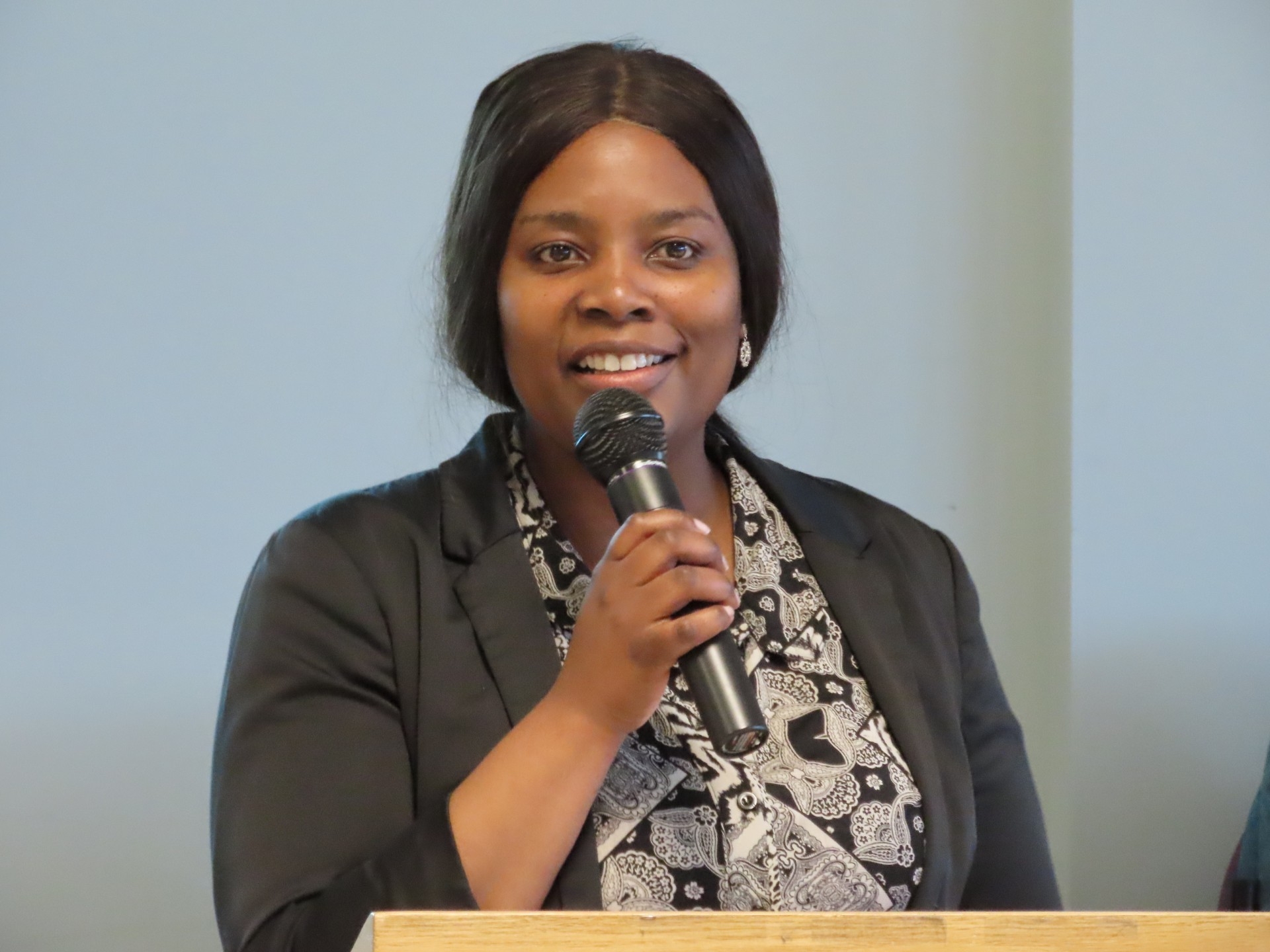
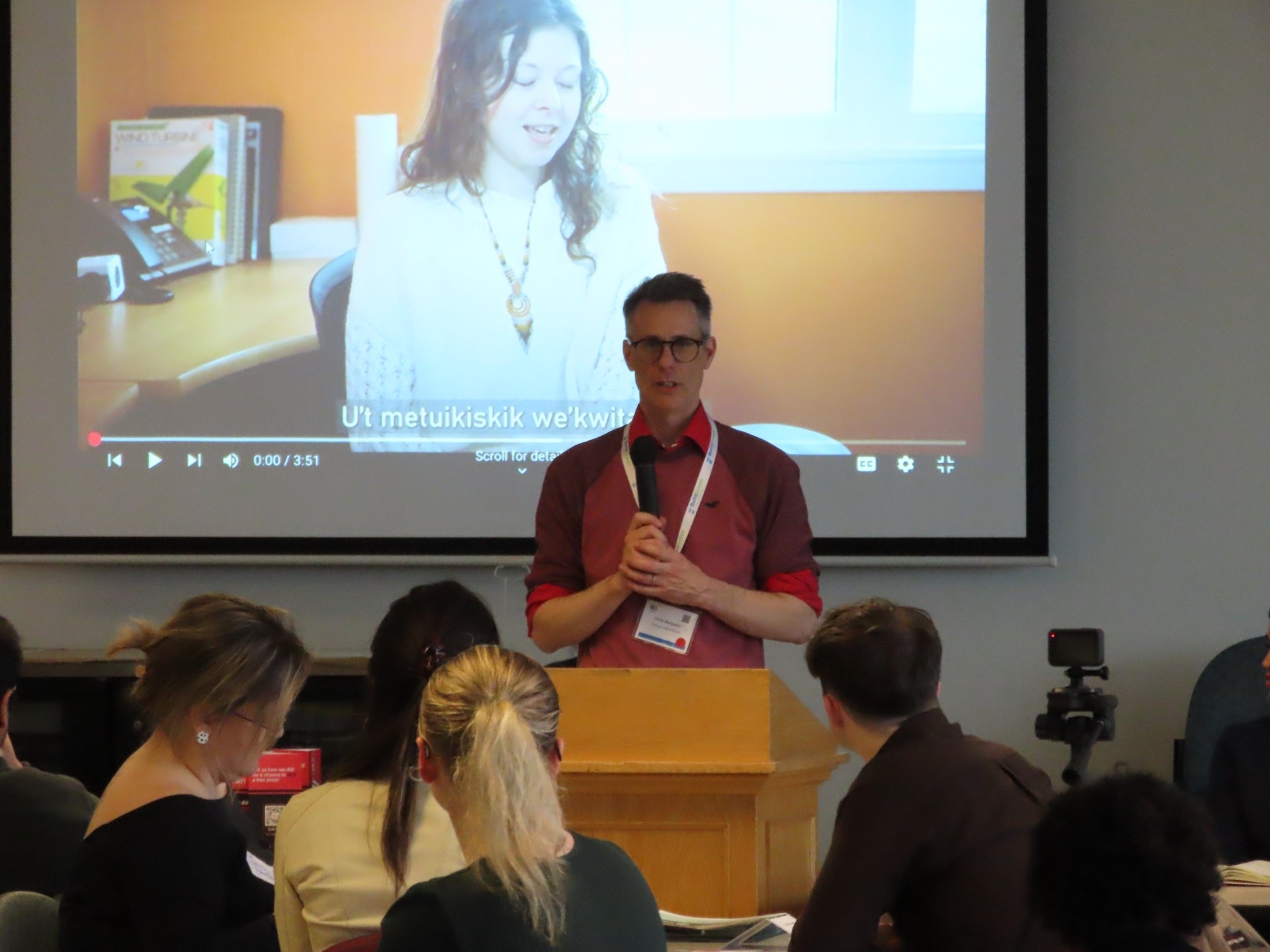

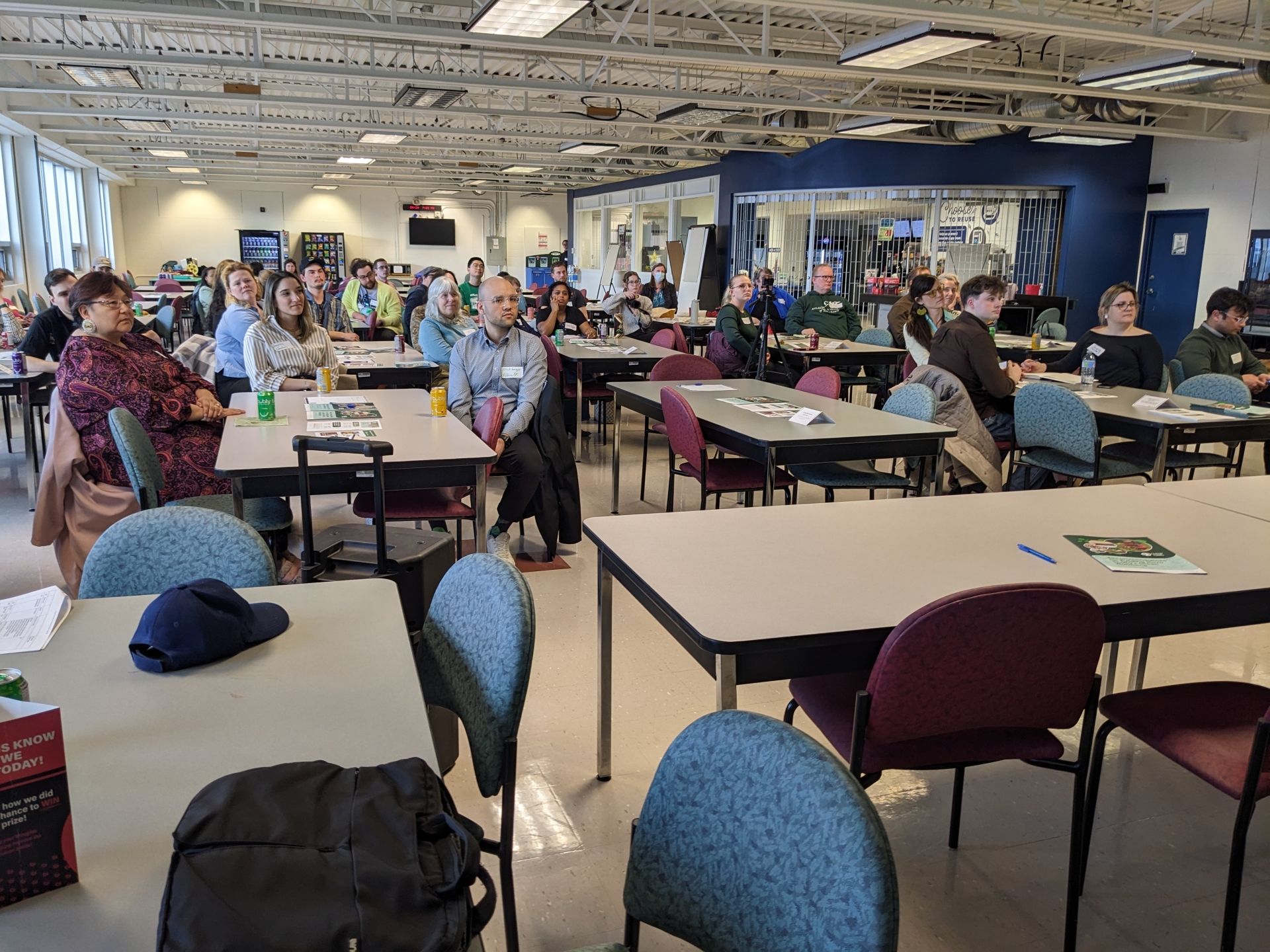

What I Learned from the Donkin Mine Community
by Juli Bishwokarma
When I moved to Nova Scotia, I knew little about coal, not just its physical makeup or its emissions profile, but its history here, its reach, and how it continues to shape everyday lives. While working on our Advancing Clean Energy Transitions project, I found myself wanting to dig deeper, what does it really mean to live near a coal mine? That’s when I met Catherine Fergusson, co-founder of Power Beyond Coal and a core member of the Cow Bay Environmental Coalition.
Two Thousand Days of Noise | April 24, 2025
Catherine’s advocacy is deeply personal. She lives it. Together with her partner Michael, they’ve been amplifying the stories of their community, particularly in Port Morien, a small seaside village just a stone’s throw from the Donkin coal mine.
Michael built gobsmack.org as a living archive of community voices and resistance. Reading through it was like peeling back layers of frustration, hope, and a relentless desire for dignity and justice.
Here’s what I learned.
Port Morien has a problem, one that’s invisible, constant, and corrosive. For over two thousand days, residents have endured the industrial hum of methane ventilation fans from the Donkin Mine. That’s not background noise; it’s a health and quality-of-life issue. It disrupts sleep, causes anxiety, and steals away the peace of coastal living.
The mine, operated by Kameron Coal (a subsidiary of The Cline Group), reopened in September 2022 after being on pause due to safety concerns. But this wasn’t a fresh start, the mine wasn’t sealed during its closure in 2020. Methane still needed to be ventilated, so the fans kept running. The community kept suffering.
An Unjust Process
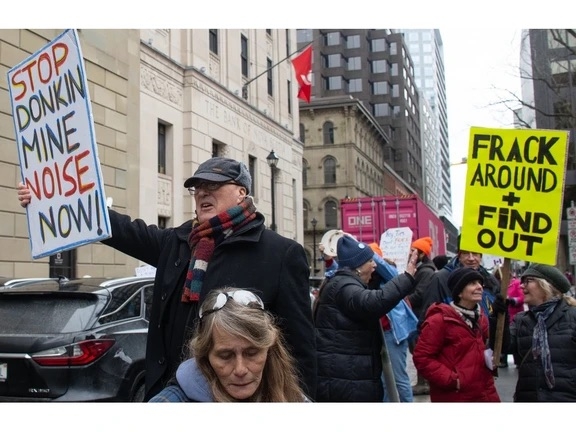 The environmental assessment process that allowed Donkin Mine to reopen didn’t even address the noise problem. Let that sink in. The system that’s supposed to protect public health ignored one of the most pervasive harms. Meanwhile, Port Morien residents, many older, many with deep ties to this land, are left to cope with a degraded environment, eroded trust, and no real avenue for repair.
The environmental assessment process that allowed Donkin Mine to reopen didn’t even address the noise problem. Let that sink in. The system that’s supposed to protect public health ignored one of the most pervasive harms. Meanwhile, Port Morien residents, many older, many with deep ties to this land, are left to cope with a degraded environment, eroded trust, and no real avenue for repair.
Catherine and others in the Cow Bay Environmental Coalition have stepped in where the government has stepped back. They’ve written reports, built community support, and fought for truth, the kind that acknowledges the real cost of fossil fuel extraction on human lives.
What We Urge
If we want a just and sustainable future, we must stop sacrificing communities like Port Morien. Here’s what we’re calling for:
-
Stop the noise. It’s unnecessary, harmful, and preventable. Hold Kameron Coal accountable and stop the ventilation noise.
-
Strengthen environmental assessments. Our regulatory systems need a serious upgrade, especially when it comes to tonal noise and its health impacts. Honest, community-informed assessments should be the standard, not the exception.
-
Move away from coal and emissions-heavy sources. Coal is not the future. It’s time for Nova Scotia to turn the page and invest in clean, community-owned renewable energy.
-
Invest in people. Port Morien deserves reparations, mental health support, public infrastructure for well-being, and resources to help the community recover and thrive.
-
Empower communities. Local groups like Power Beyond Coal and Cow Bay Environmental Coalition are doing the work. Decision-makers need to listen, partner, and fund community-led solutions, not undermine them.
-
Retrain and transition workers. Let’s support miners with real opportunities, certification programs, green jobs, and secure livelihoods that don’t cost their health or the planet.
-
Honour the treaties. Extracting fossil fuels on Mi’kma’ki dishonors the Peace and Friendship Treaties. We are all treaty people. Our actions and our energy decisions must reflect that responsibility.
-
No more sacrifice zones. Fossil fuels are toxic not just to the environment, but to people. The land and people of Cape Breton have given enough. It’s time to stop asking them to give more.
Meeting Catherine reminded me that advocacy isn’t abstract. It’s lived. And listening to communities like Port Morien, I realized: the coal industry doesn’t just extract resources. It extracts trust, health, and peace of mind.
Unless we stand up and say enough. Let’s stop the noise, literally and figuratively. Let’s imagine a future where the energy we use doesn’t come at someone else’s expense. And let’s build it together.
If you want to learn more or support the movement, visit gobsmack.org, follow Power Beyond Coal, or reach out to local environmental organizations standing in solidarity with Port Morien.
Taking Back the Power
by Badia Nehme
On Wednesday March 5, roughly 500 people took to the streets in front of Province House for the “Special Interests” for Democracy rally with a unified voice that said: “The Houston government does not have a right to alter the democratic process.” The rally was prompted after a series of bills that sought to undermine public engagement, government checks and balances, and municipal and academic voices.
Energy Sovereignty, Democracy Highlight “Special Interests” for Democracy Rally | Mar 27, 2025
Speakers fired up the crowd calling for government accountability, solidarity with the working class, standing up against corporations, greed, and environmental degradation.
One notable call to action was from Mi’kmaq Activist Cheryl Maloney. She called for the restructuring of our energy and resources. To put them into the hands of the people to reclaim it form Nova Scotia Power.
“The solution isn’t with governments and corporations. It’s with human beings,” Maloney said. This is a crucial call going forward in the fight against climate change.
As Nova Scotia decarbonizes, energy democracy and community energy are pathways to clean, stable, and affordable energy. Energy democracy means giving people and community the right and ability to chose where their energy comes from. Community energy means energy owned by the community, and used for the community.
Energy democracy was a clear call to action in the face of Bill 6, An Act Respecting Agriculture, Energy, and Natural Resources. As the omnibus bill seeks to lift the bans on fracking and uranium exploration, many sight the fact that the bill ignores the years of public engagement and Indigenous consultation; the results of which oversaw hundreds of responses and thousands of attendees with 91% of respondents being in favour of the ban.
“We spent years deciding together to ban fracking and now he says he has to have an adult conversation about reversing extraction," said Robin Tress of the Council of Canadians
Nova Scotian’s having the right to a ban is not bad policy. The ban is the result of the clear voice of the public will and years of research. The right to choose where our energy comes from is about fostering a strong and prosperous renewable energy future.
A combination of energy democracy and community energy is the most proactive route to creating this green future. Nova Scotians use 29% less energy than the national average, yet we face some of the highest energy bills and rates of energy poverty.
Energy co-operatives, municipally owned utilities, and community-choice aggregated communities have all provided clear energy grids that are stable, a source of community economic development, and demonstrate lower rates than large power corporations. It is something we should be demanding from our governments, while continuing to stand against the face of resource extraction.

From Gas to Green: A Family’s Journey to Sustainability
by Juli Bishwokarma
When Chris Caputo, a chemist by training, and his wife decided to make a change five years ago, they didn’t expect it to transform their lives so profoundly. What started with swapping out their gas-powered car for an electric vehicle (EV) in mid-2019 has since turned into a full-scale effort to eliminate fossil fuels from their home.
Now parents to two young children, Chris and his wife are passionate about creating a sustainable future—one step at a time.
The Journey to Being an Earth Hero | Feb 27, 2025
For Chris, sustainability has always been more than a buzzword. “As a chemist, I’ve been trained to think about impact and efficiency,” he explains. “Living sustainably feels like a natural extension of who I am. But more importantly, it’s about setting an example for my kids and doing our part to ensure they have a livable future.”
This ethos inspired the family to take bold steps to reduce their household’s environmental footprint. The motivation went beyond environmental stewardship. By tracking emissions using apps like Earth Hero, Chris gamified the process, using data to better understand their household’s impact.
“It’s kind of fun to plug in your info and see how you compare to average emissions,” he says. “It keeps you motivated and grounded in what really matters.”
The First Step: An Electric Vehicle
The journey began with their decision to purchase an electric vehicle, or EV. Though they missed out on the Ontario provincial EV rebate, which had been discontinued, they took advantage of the $5,000 federal rebate to offset costs.
 “Switching from a Hyundai Accent that cost $200 a month in gas to a car that costs $20 a month to charge was an easy decision,” Chris recalls. To accommodate the EV, they installed a 240-volt outlet outside their house and later upgraded their home’s electrical system to support more energy-efficient appliances.
“Switching from a Hyundai Accent that cost $200 a month in gas to a car that costs $20 a month to charge was an easy decision,” Chris recalls. To accommodate the EV, they installed a 240-volt outlet outside their house and later upgraded their home’s electrical system to support more energy-efficient appliances.
"Chris credits a growing charging network across the country for making the transition relatively seamless. "You plug in your destination and the car tells you where the charging stations are - it's effortless. That made adopting the technology so much easier"
Retrofitting Their Home: One Change at a Time
Over the years, the family worked systematically to replace their gas appliances with electric alternatives. They got rid of their gas furnace, stove, and water heater, leaving only the propane BBQ as a final holdout. To finance some of these changes, they tapped into the Canada Greener Homes program, which offers interest-free loans for energy-efficient upgrades like heat pumps and tankless water heaters.
“We didn’t do it all at once,” Chris emphasizes. “We replaced appliances as they aged, prioritizing the oldest and least efficient ones first. It’s a process, but it’s worth it. Our electricity costs have actually gone down despite adding new appliances because everything is so much more efficient.”
Surprises and Benefits Along the Way
The transition has brought unexpected benefits beyond financial savings. “We used to spend $60 to $140 a month on gas, and now our gas bill is basically $10 for the BBQ,” Chris explains.
“Our electricity costs average $150 a month, which is lower than before we made the switch. But the biggest surprise has been the air quality in our home—it’s so much better now that there’s no gas.”
Their EV has also transformed how they think about transportation. “The maintenance is minimal, there’s no wear and tear, and the acceleration is so smooth. I could never go back to a gas-powered car,” Chris says.

Advice for Others Considering the Switch
Chris acknowledges that the upfront costs of retrofits and EVs can be a barrier, but he encourages others to start small. “You don’t
have to do everything at once," he says.
"Start by replacing your oldest appliances or consider active transportation for short distance errands. I know switching to an EV isn't possible in every city in Canada, but I'd also like to stress that you don't necessarily even need an EV.
"Active transportation or public transit are equally important alternatives. Also, look into programs like the Canada Greener Homes—they offer great support for home efficiency.”

Ian's Story: A Journey to Energy Efficiency and Sustainability
by Juli Bishwokarma
Ian Mallov had always envisioned a future where his lifestyle aligned with his values. When he and his partner moved to Halifax, it marked the beginning of a new chapter.
Though the transition came with challenges, such as adapting to limited public transportation options compared to their previous home in Toronto, it also presented an opportunity. Ian decided it was time to act on a long-held goal: to buy an electric vehicle (EV).
For Ian, this was more than a practical choice—it was a step toward a sustainable future.
Why an Electric Vehicle? | Jan 23, 2025
Ian’s interest in EVs wasn’t new. Growing up in a progressive household, he had been exposed to discussions about clean technology and sustainability from an early age. By the time he began considering a car, he had already ruled out gas-powered vehicles.
“It just didn’t make sense to invest in something that goes against my values,” he says. He saw EVs as a way to reduce his family’s carbon footprint while contributing to a broader shift away from fossil fuels.
“I’m really passionate about sustainability and the need to tackle climate change. It’s such an urgent issue. I know individual actions alone won’t solve everything, but they do add up and can help drive bigger changes.”
The Decision-Making Process
The journey to owning an EV wasn’t simple. Ian spent months saving and researching.
Financial obstacles were a major hurdle, but he was encouraged by the availability of a used EV rebate, which significantly reduced costs. Ian also benefited from federal and provincial government rebates, though he believes there should be more financial support available to make EV ownership accessible to a wider audience.
Ian consulted with a friend in Toronto who owns a Tesla and connected with another acquaintance in Bedford for guidance. As a scientist by training, Ian values direct conversations over online research, finding them more effective than theoretical calculations.
“I talked to so many people before making the decision,” Ian says. “Hearing firsthand experiences made a huge difference, especially when it came to understanding things like range and charging logistics.”
When Ian came across a 2017 Chevy Bolt, he knew he had found the right car. Its battery condition, range, and affordability aligned with his family’s needs. For Ian, buying an EV wasn’t just about practicality; it was an emotional decision rooted in his commitment to sustainability.
Life with an EV
Owning an EV brought noticeable changes to Ian’s life. He enjoyed the consistent pricing of electricity compared to fluctuating gas prices and appreciated the quiet, smooth ride of the Chevy Bolt. However, life with an EV wasn’t without its hurdles.
Ian’s apartment in Halifax lacked the infrastructure for home charging. Efforts to install a private charger were thwarted by space limitations and landlord restrictions. This meant relying on public chargers, which required planning and flexibility.
Apps like ChargePoint and FLO became essential tools for locating available charging stations. Ian found it frustrating that some places, like IKEA, had space for only eight chargers, and grocery stores in Halifax Regional Municipality (HRM) often lacked chargers altogether. Progress was being made, but there were still no Level 2 chargers at roadside or fast-food locations, and the nearest fast charger was a 6–7-minute drive away.
Road trips presented their own challenges. “At first, it was overwhelming,” Ian admits. “You have to think about where to stop, how long to charge, and whether the station will even be working.”
Despite these difficulties, Ian found ways to adapt, incorporating overnight charging into his travel plans to minimize reliance on fast chargers.
Takeaways and Advice
Reflecting on his experience, Ian emphasizes the importance of preparation. “Do your research,” he says. “Look into incentives, understand the charging situation in your area, and talk to people who’ve already made the switch.”
He highlights the importance of considering lifecycle emissions, the availability and location of chargers, and electricity-pricing structures, noting that many chargers charge per time instead of per kilowatt-hour.
Ian also advocates for better public charging infrastructure, particularly for renters and apartment dwellers. He stresses the need for incentives or legislation to ensure new buildings include EV infrastructure and for more chargers in underground or street parking.
Ian highlights the critical need for additional rebates, despite the support already available. “The federal government and provincial rebates are a great start, but more needs to be done to make EV ownership possible for everyone, not just those who can already afford it.”
For Ian, the journey to owning an EV was about more than convenience or cost savings. It was about making a choice that aligned with his values and setting an example for his child.
“I know EVs aren’t perfect,” he says. “But they’re a step in the right direction. And sometimes, taking that first step is the most important part.”
Useful resources:
-
Incentives for Zero-Emission Vehicles (iZEV) Program (Currently paused): https://tc.canada.ca/en/road-transportation/innovative-technologies/zero-emission-vehicles/incentives-zero-emission-vehicles/program-resources-dealerships?utm_campaign=tc-zev-hub-ongoing&utm_medium=doormat-link&utm_source=zev-hub-incentives-page-en&utm_content=izev-program
-
Electrify Nova Scotia Rebate Program: https://evassist.ca/rebates/residents/
-
Multi-Unit EV Charger Rebates: https://www.efficiencyns.ca/programs-rebates/ev-charging-for-multi-unit-residential-buildings
-
Electric Vehicle Association of Atlantic Canada: https://evaac.ca/ , Facebook group: https://www.facebook.com/EVAssocAtlCan/
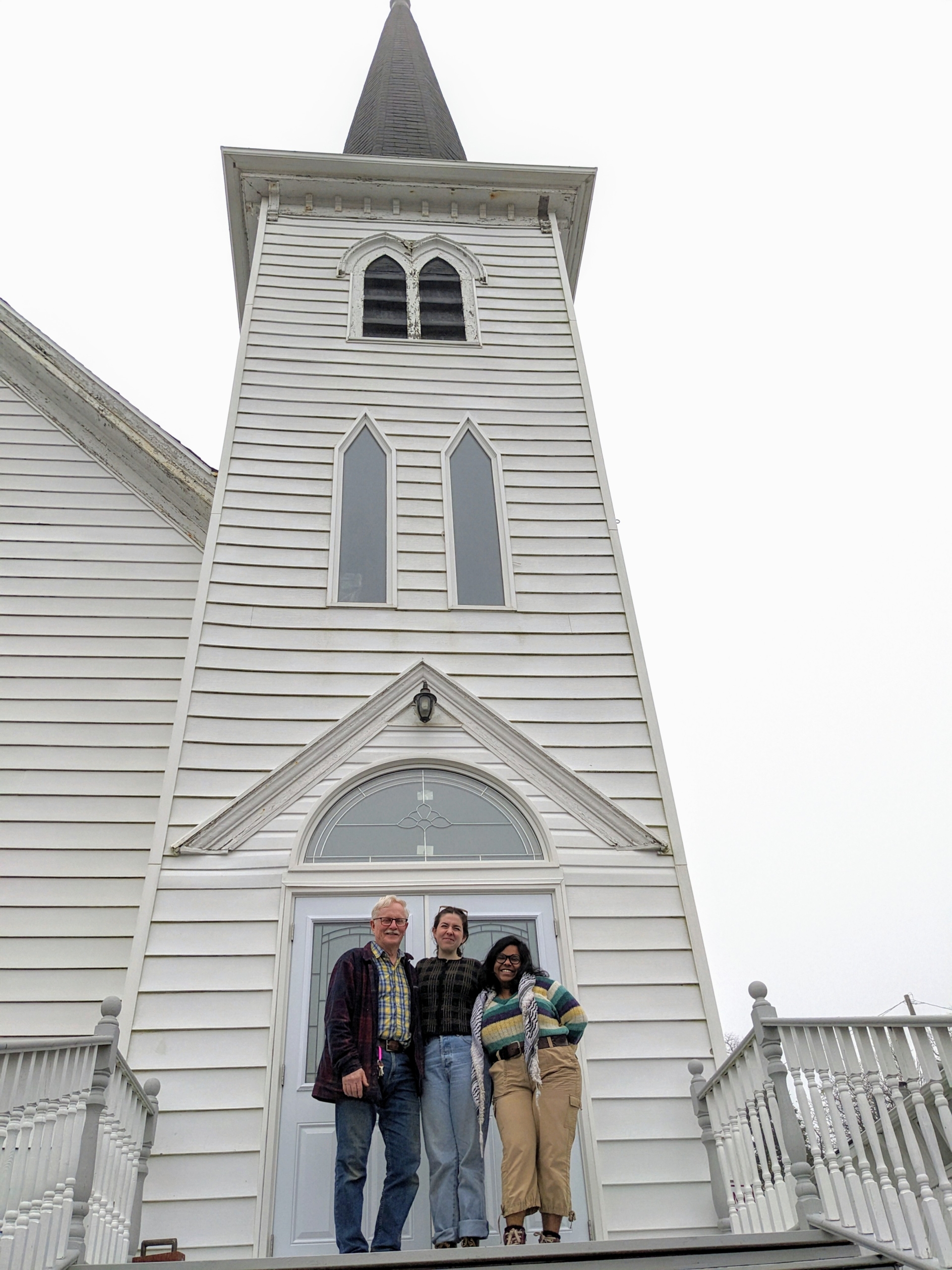
Goin’ Down the Cape Breton Road: United Church edition
by Shreetee Appadu
Last month, the EAC energy team went down the road in Cape Breton to connect with some United Churches who took part in the Faithful Footprints Program. The Faithful Footprints Program is a unique grant program offered by the United Church of Canada, which offers up to $30,000 as grants to its communities of faith to reduce their energy and carbon footprints. The program has been running for several years and remains committed to the goal of reducing the United Church's carbon emissions by 2030.
The Atlantic provinces are home to many United Churches – 700 to be exact. That is just over 25 percent of all United Churches in Canada. On our Cape Breton road trip, we met with members of three different churches, namely St Peter’s United in St Peter’s, Carman United in Sydney Mines, and St John’s United in Big Bras D’Or, to hear a bit about their Faithful Footprints journeys.
Energy Retrofits Resurrecting Church Life and Community | Dec 10, 2024
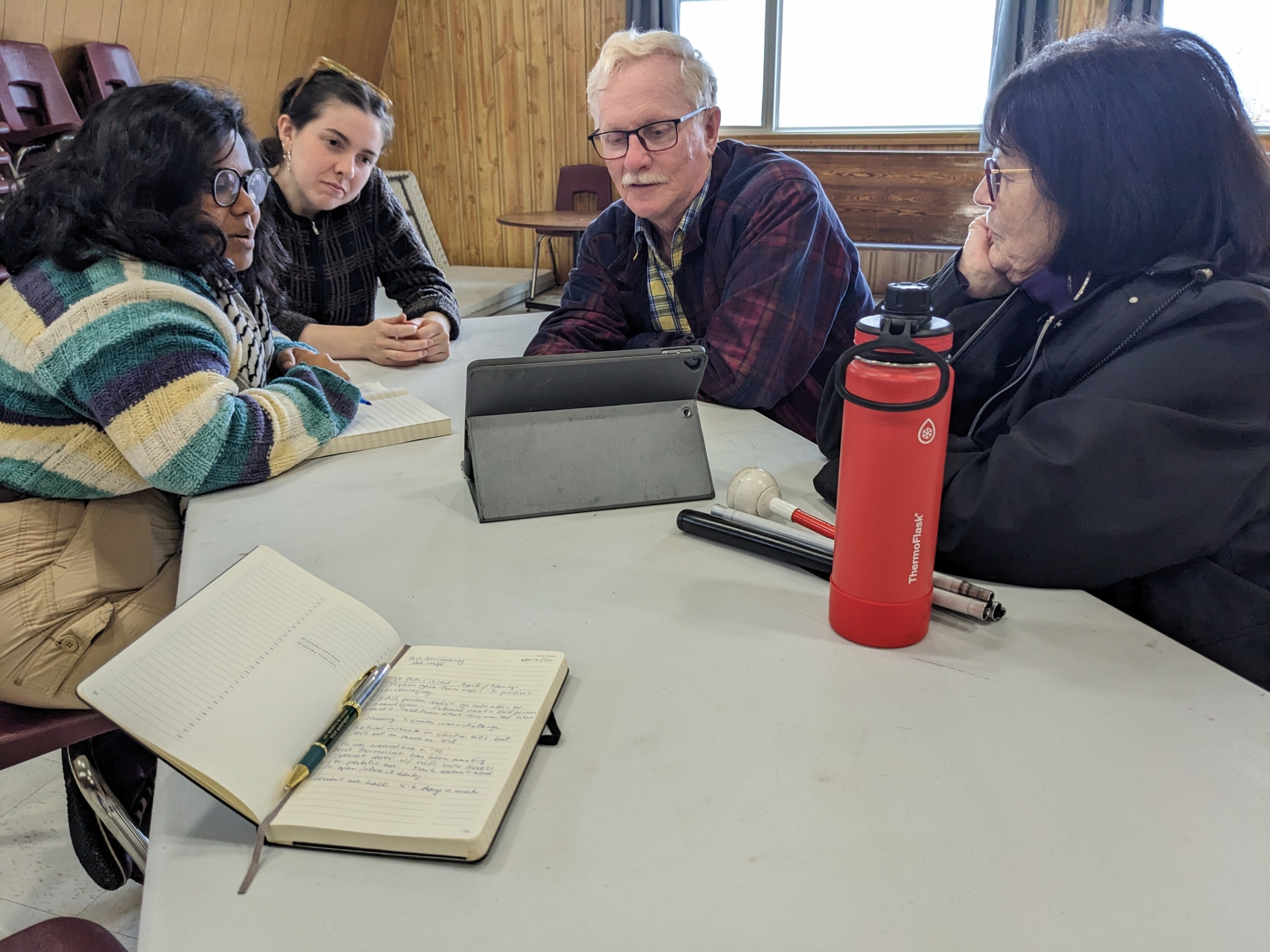 We started our road trip by meeting Marc and Nancy from St Peter’s United in their newly renovated hall. Marc, who is the chair of Saint Peter’s Grand River, Loch Lomond Unified Board was eager to share their energy retrofit journey with us. From installing new rain gutters and new windows to heat pumps, the church hall was given a new life. They are now able to rent out the hall for other community activities like yoga and dance classes without having to worry about turning on the oil furnace.
We started our road trip by meeting Marc and Nancy from St Peter’s United in their newly renovated hall. Marc, who is the chair of Saint Peter’s Grand River, Loch Lomond Unified Board was eager to share their energy retrofit journey with us. From installing new rain gutters and new windows to heat pumps, the church hall was given a new life. They are now able to rent out the hall for other community activities like yoga and dance classes without having to worry about turning on the oil furnace.
“The hall was a drain on us but now we are breaking even, and the new programmable smart NEST thermostat is helping with keeping the heat on.”
As we continued on our trip, we met with Daniel from Carman United Church in Sydney Mines. Daniel, the treasurer, came ready with the numbers.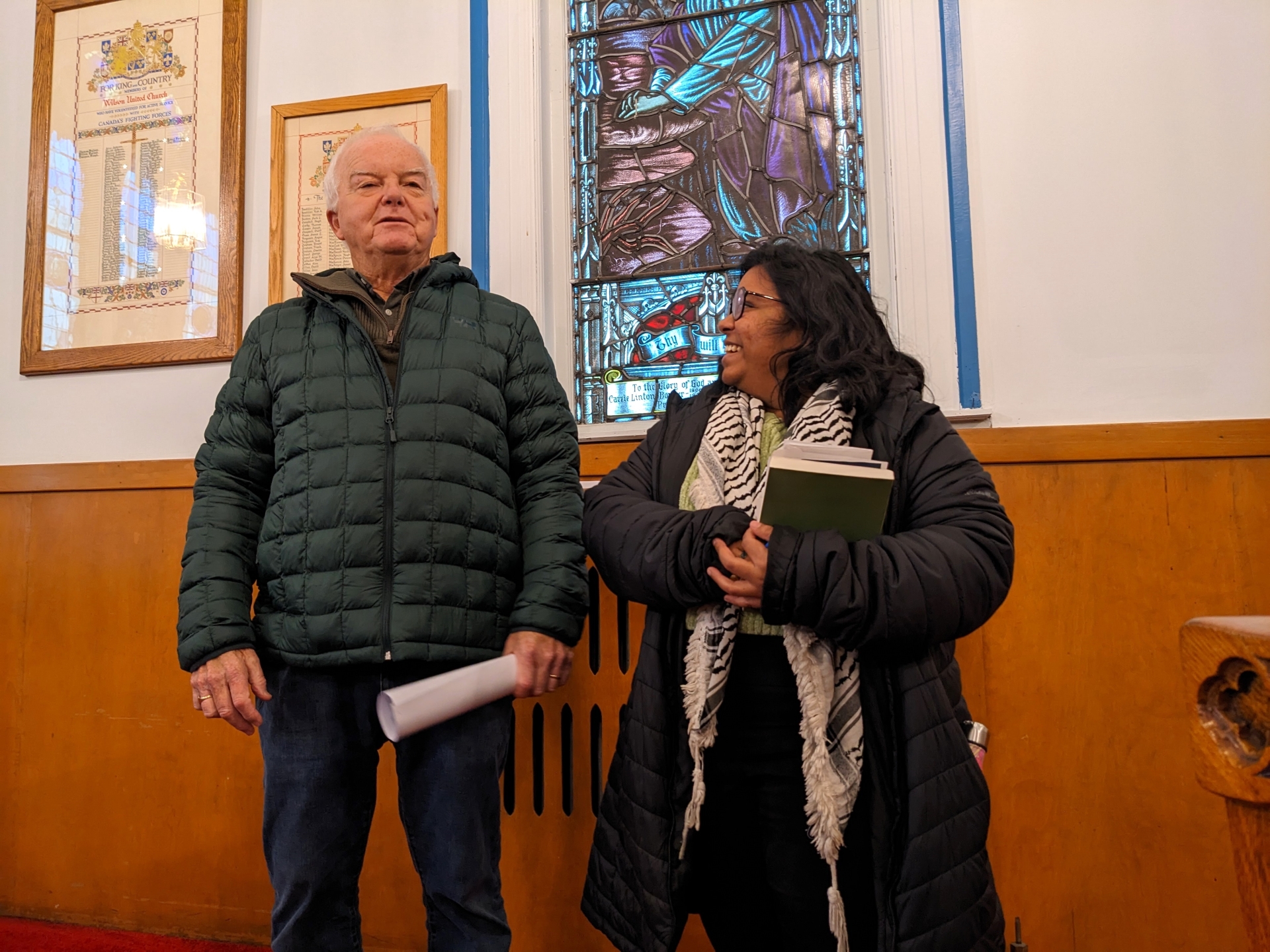 The installation of heat pumps has helped them reduce their heating costs by more than 50%. Similar to St Peter’s, they are now able to do a lot more activities in the hall than before and more people stay and socialize in the hall after the church service.
The installation of heat pumps has helped them reduce their heating costs by more than 50%. Similar to St Peter’s, they are now able to do a lot more activities in the hall than before and more people stay and socialize in the hall after the church service.
“People are warm and comfortable inside the church which makes them stay behind and socialize more after the service.”
You can read more about the amazing work that Carman United Church did in one of our previous blog posts.
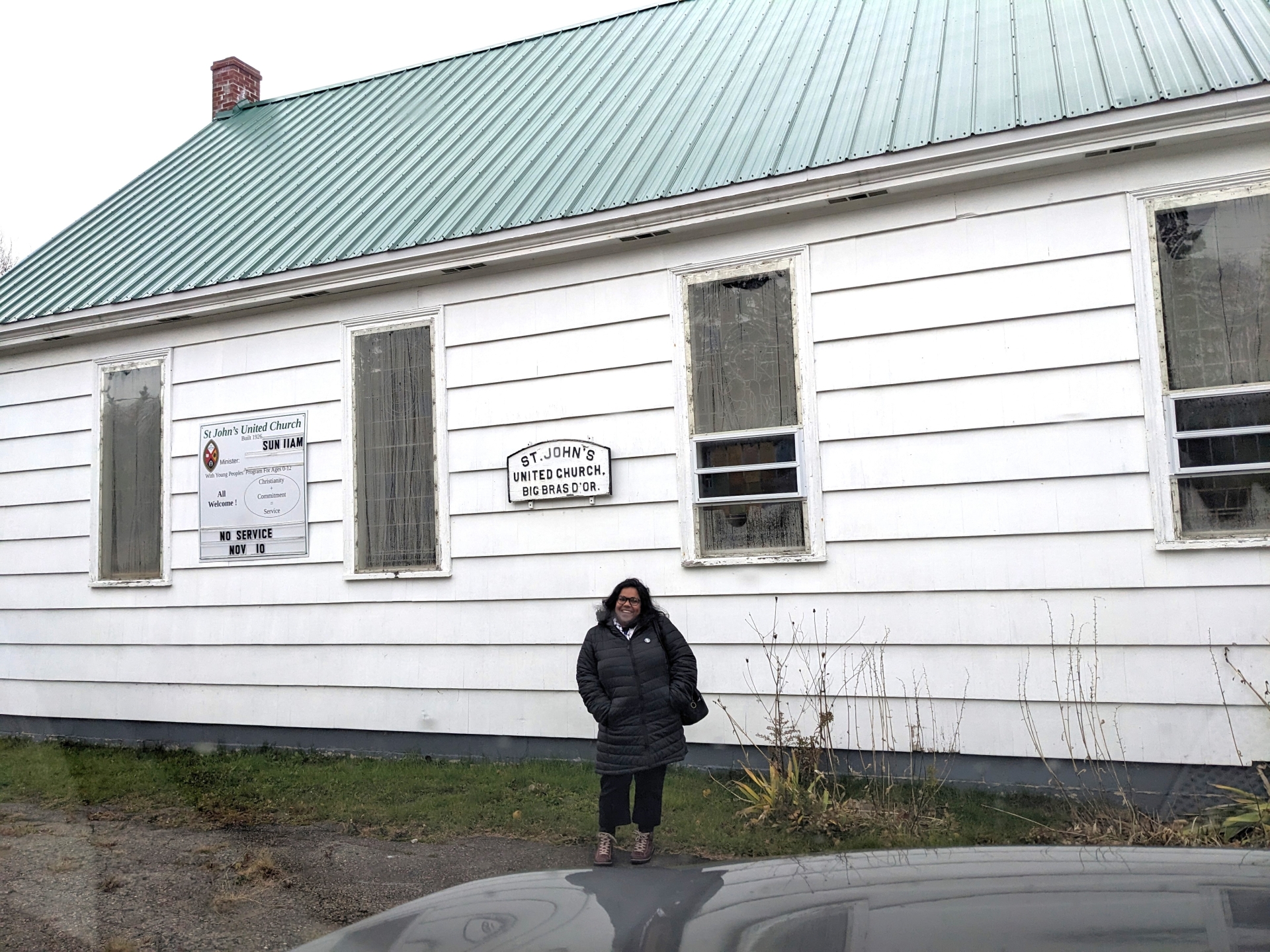 The last church we went to on our trip was St John’s United located on Old Route 5 in Big Bras D’Or. The church is nestled between trees and a fire hall for neighbors. We met with Cynthia who is the chair of the board and was involved with the energy work done by the church in 2021. They have installed new energy efficient windows, removed the oil furnace and installed a central heat pump system which has significantly reduced their oil bill and kept the church doors open.
The last church we went to on our trip was St John’s United located on Old Route 5 in Big Bras D’Or. The church is nestled between trees and a fire hall for neighbors. We met with Cynthia who is the chair of the board and was involved with the energy work done by the church in 2021. They have installed new energy efficient windows, removed the oil furnace and installed a central heat pump system which has significantly reduced their oil bill and kept the church doors open.
“We would never have been able to keep the church open if we still had to pay the oil bill.”
Completing the work was not easy, especially being in a rural area, but Cynthia mentioned that since most of the work was done during the pandemic, that helped with securing contractors. Now post-covid, they can give the church space for free to a line dancing group and the church volunteers do not have to go in person to turn the heat on
The three churches all share the sentiment of hope and revival after being able to complete the energy efficiency and decarbonization work. Although getting the work done has had its challenges, having a strong building committee and a strong sense of community helped with staying focused on the work as well as the support received from the Faithful Footprints team. Moreover, with heat pumps in churches, the congregation members are also inquiring about heat pumps for their own homes, which showcases the importance of faith communities in pushing for environmental change. Participating in the Faithful Footprints program is not only good for the environment but also helps in reviving the church as community spaces.
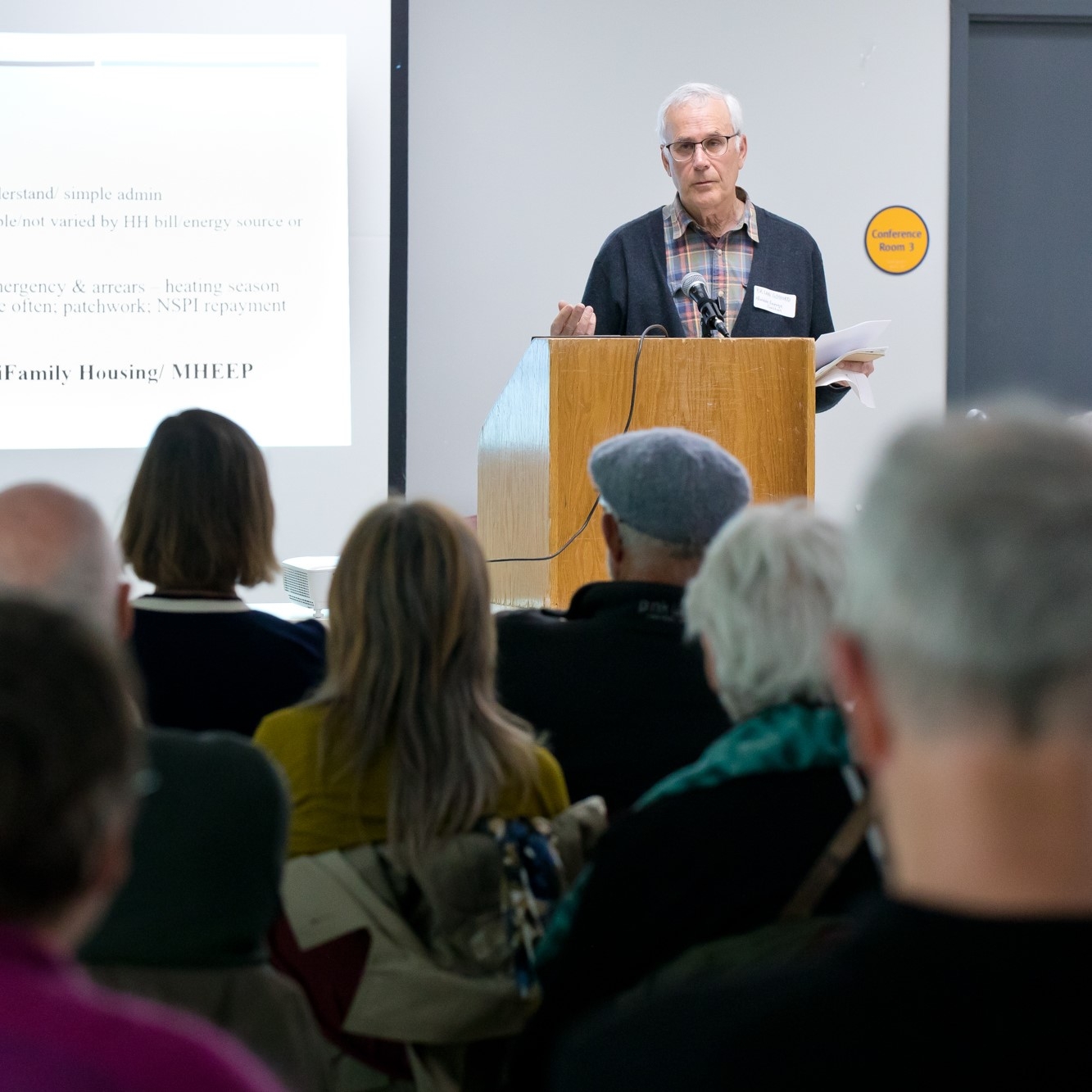
Affordable Energy Coalition Logs On!
by Kat Turner
Active for nearly 21 years, the Affordable Energy Coalition brings together anti-poverty advocates committed to ensuring universal access to electricity, eradicating energy poverty, and ensuring that the interests of low- and modest-income Nova Scotians are represented in energy issues. A comfortable home is a human right, which includes electricity, heating, and cooling!
Ecology Action Centre is a proud member of this coalition, working alongside direct-service agencies and anti-poverty organizations.
Visit the new website at www.affordableenergycoalition.ca.
A Living History and a Very Useful Tool | Nov 18, 2024
The coalition has been steadfast in advocating for low-income energy efficiency programs, including Efficiency Nova Scotia’s Affordable Multifamily Housing and HomeWarming programs, as well as the Province of Nova Scotia’s Heating Assistance Rebate Program, or HARP. These support low-to-moderate-income Nova Scotians to help keep their power bills down, while keeping homes at a comfortable temperature. This reduces the likelihood that people will be forced to make impossible choices between necessities like food, medicine, and paying to keep their home livable.

Most recently, the coalition pushed for the creation of the Energy Poverty Task Force, led by then chair Brian Gifford. This taskforce produced the seminal report A Way Forward: A Made-in-Nova Scotia Home Energy Affordability Program, written by energy poverty expert Roger Colton. This report recommends a Universal Service Program that includes on-bill supports, managing late bill payments, crisis intervention, and improved efficiency programming. This work builds on the recommendation the coalition has been making for nearly twenty years.
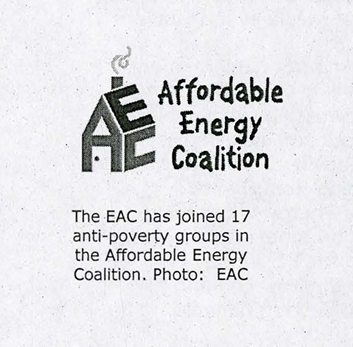 With more than two decades of social, legal, and political advocacy taking place “behind the scenes”, the Affordable Energy Coalition is beyond excited to have a new platform to share its work with the public. The brand-new website will serve as a living history of the coalitions’ work and be a helpful resource and directory for similar work being done across Turtle Island.
With more than two decades of social, legal, and political advocacy taking place “behind the scenes”, the Affordable Energy Coalition is beyond excited to have a new platform to share its work with the public. The brand-new website will serve as a living history of the coalitions’ work and be a helpful resource and directory for similar work being done across Turtle Island.
More than anything, we hope this new platform will invite more connection with other individuals and communities in the same fight, and spread our message of affordable, accessible, and reliable energy for all!

Zooming into Health: Electric School Buses for Children’s and Drivers' Health
by Abby Lefebvre
n July, I had the privilege of attending a fascinating D250 presentation on school bus safety, in beautiful Penticton, BC (that's me in the photo!). D250 sets the standards for school bus safety at both the provincial and federal levels.
After hearing about various safety features, such as stop arms, seat sizes, aisle dimensions, and reflectors, I began to wonder why we weren’t addressing the safety of children’s lungs and the inhalation of chemicals from fuel bus emissions.
This realization launched the idea to create a report and host an event in Halifax to raise awareness about the impact of school bus emissions on children's health.
We Wrote a Report, Created a Toolkit and Hosted an Event! | Oct 17, 2024
Over the summer, The Ecology Action Centre, New Brunswick Lung, and the Conservation Council of New Brunswick gathered reports, scientific findings, and Canadian statistics. And we monitored air quality inside a school bus.
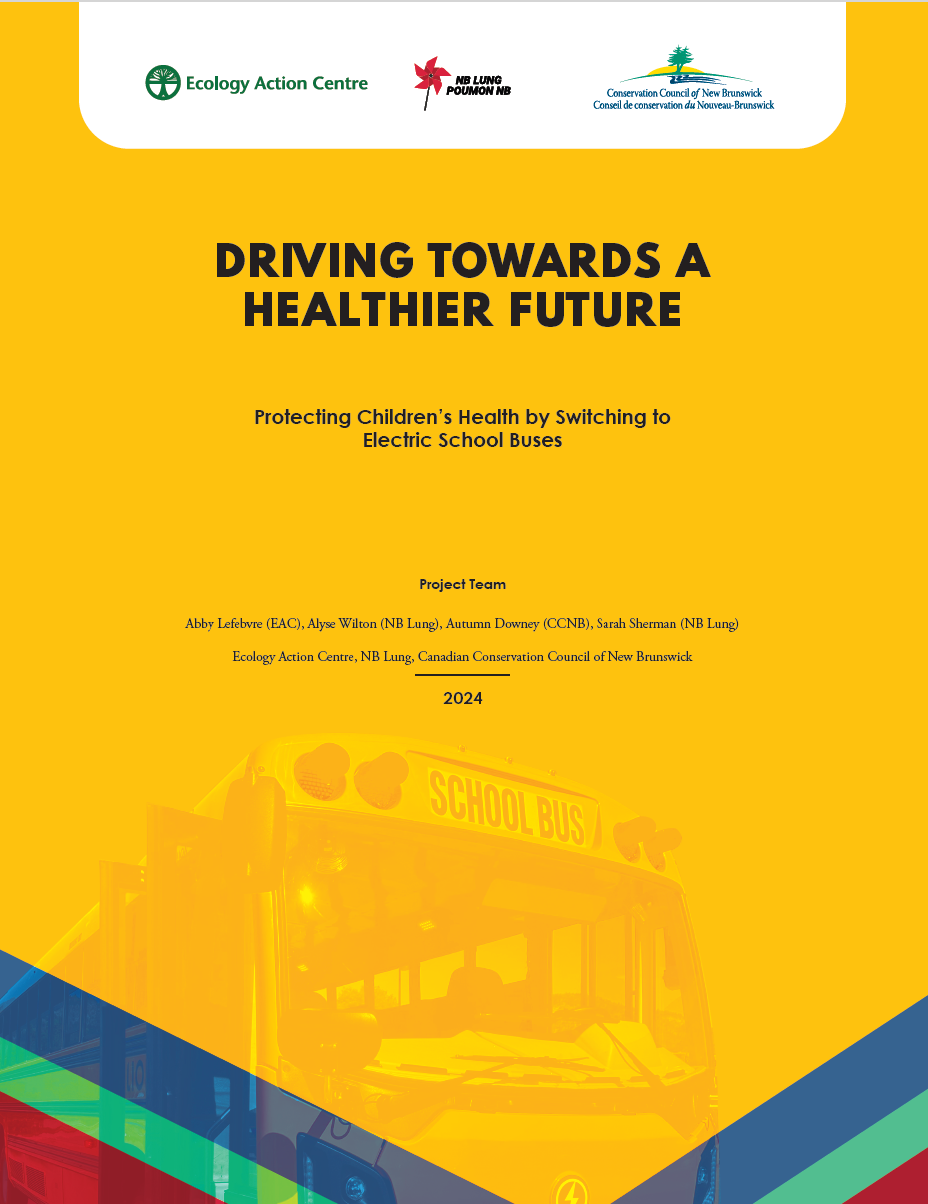 We compiled all this information into a 12-page report for parents, teachers, bus drivers, students and concerned community members, highlighting the numerous physical and mental effects that school bus emissions have on children’s health and the health of drivers. To accompany the report, we created a toolkit to help individuals learn more about electric school buses, their functionality, cost savings, and other benefits. The toolkit also includes resources for advocating for mandated adoption of electric school buses in Nova Scotia, New Brunswick and Newfoundland, following the lead of our counterparts in Prince Edward Island.
We compiled all this information into a 12-page report for parents, teachers, bus drivers, students and concerned community members, highlighting the numerous physical and mental effects that school bus emissions have on children’s health and the health of drivers. To accompany the report, we created a toolkit to help individuals learn more about electric school buses, their functionality, cost savings, and other benefits. The toolkit also includes resources for advocating for mandated adoption of electric school buses in Nova Scotia, New Brunswick and Newfoundland, following the lead of our counterparts in Prince Edward Island.
To launch the report and gather support, we hosted an event on October 6th at NSCC’s Ivany Campus in Dartmouth. The event featured a Lion Electric School Bus, Electric Vehicle Test Rides from Next Ride, exhibitor booths from collaborating organizations, and presentations from health and environmental professionals.
Cathy Cervin, a retired family doctor and Dalhousie professor representing the Canadian Association of Physicians for the Environment Nova Scotia, discussed how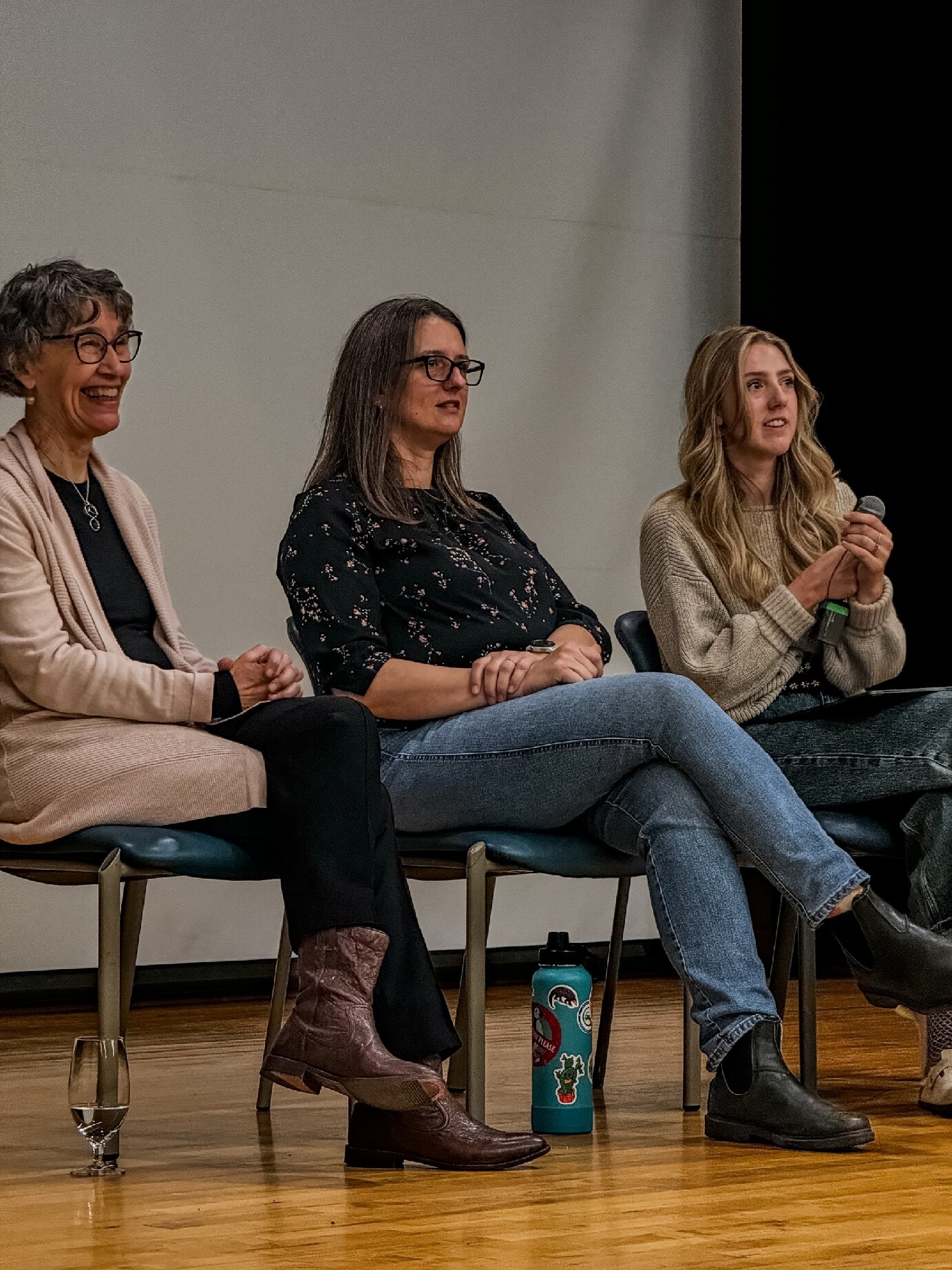 these emissions affect our health. She was followed by Melanie Langille from New Brunswick Lung, who spoke about lung health and the impact of emission pollutants.
these emissions affect our health. She was followed by Melanie Langille from New Brunswick Lung, who spoke about lung health and the impact of emission pollutants.
The final presentation was by Autumn Downey from the Conservation Council of New Brunswick, who addressed how electric buses can contribute to healthier, happier communities. Following the presentations, we held a panel discussion to allow for questions.
While parents listened to our expert presenters, youth had the opportunity to engage with a presentation about electric school buses. The kids learned about the sources of carbon emissions, their effects on the environment, and how electric school buses can help mitigate these issues.
It was a pleasure to host everyone and to hear fantastic questions from community members. The report and toolkit can be found on the EAC website under the ‘Reports and Resources’ tab. Click here to find a recording of the event.

Meaningful Action at the Neighbourhood Level
by Scott Osmond
It is easy to be overwhelmed by the climate crisis and to feel that the actions of an individual cannot make a difference. But sometimes it only takes the actions of one person to enact big change in their community.
Fifteen years ago, longstanding climate activist Ruth Gamberg did just this when she took on a neighbourhood-based project to see what she and her neighbours could do to address their impacts on the local environment. In doing so she set an example of something we can all do in our daily lives to make a difference, while also demonstrating the importance and power of coming together as a community to create change.
Togetherness is Power | Sept 26, 2024
“I contacted a number of neighbours,” Gamberg recalls, “and asked if they were interested in getting together to talk about things we could do in our daily lives that would have a positive effect on the environment.” They began by watching a shortened version of Al Gore’s film, An Inconvenient Truth. Gore’s passionate and personal approach to the film, intermixed with the predicted catastrophic effects of doing nothing, inspired them to take a more critical look at their own lives and how they could take action.
With the discussion that followed, Gamberg and her neighbours came up with a list of ideas to try. Some action items included:
Water Conservation: Doing laundry in cold water, installing low-flow showerheads, and watering their gardens more efficiently with soaker hoses, only during the evening hours.
Energy Efficiency: Transitioning to energy-efficient lighting such as LED light bulbs, turning off lights and appliances when not in use, and using a clothesline or indoor rack instead of a power-consuming dryer. They learned more about home energy audits and scheduled a tour of the Ecology Action Centre’s Fern Lane Office for inspiration.
Going Solar: Exploring the potential of solar panels for sustainable energy generation.
Transportation: Opting to walk or carpool, avoid unnecessary idling, and practice fuel-efficient driving methods such as maintaining proper tire pressure and lowering speeds on highways.
Waste Reduction: Recycling and composting where possible, buying in bulk, and using reusable bags. Using old newspapers as wrapping paper.
Join or Volunteer with an Environmental Organization
Share These Ideas with Your Kids!
After their first successful meeting, the group decided to meet monthly and discuss new ideas and challenges and share their achievements. This built a new sense of community.
This neighbourhood collaboration introduced the group to new ideas, concepts, and information, and allowed members to share useful books, films, and
organizations. As a unified group, they were also able to invite local experts and professionals to join their meetings and share the work being done around the community.
At one meeting, a representative from the Halifax Municipal Environmental Services Group provided information on the city’s waste management, and insights into best practices to follow. “They gave us useful information about sorting compostables, recyclables and trash,” says Gamberg.
 The group grew with time. Gamberg says many of her neighbours adopted new sustainable practices, which they integrated into their lives. Families were able to teach their children valuable lessons in environmental awareness and sustainable practices, instilling these lessons in the next generation.
The group grew with time. Gamberg says many of her neighbours adopted new sustainable practices, which they integrated into their lives. Families were able to teach their children valuable lessons in environmental awareness and sustainable practices, instilling these lessons in the next generation.
“It was not uncommon for neighbours, those who had showed up for meetings as well as some others, to informally discuss their new habits, other related ideas, materials to read, how their kids would remind them to turn off the lights,” Gamberg says.
It is not uncommon to sometimes feel helpless in addressing the climate crisis, but as with the case of Ruth Gamberg’s neighbourhood project, collective action can have a large and meaningful impact on our communities. Gamberg’s initiative to simply bring people together in a collective space demonstrates the importance of even small actions on building stronger and more resilient communities.

My Experience with Energy Affordability and Efficiency
by Carleigh MacKenzie
I grew up in a household that overconsumed, didn’t sort garbage, and denied the climate crisis.
I remember asking for reusable and sustainable items on my Christmas lists. I was vegan for three years, then vegetarian. I shop at small markets and choose sustainable options when I can. I thought this was what it meant to be environmentally aware until I began working in this field.
I researched legal barriers and remedies to energy efficiency in affordable housing | Aug 20, 2024
In October 2023, I became a research assistant for disaster response and climate planning. I fell in love with environmental law and policy, environmental justice, climate disasters, and adaptation.
My internship with Ecology Action Centre has opened this world up for me. At the beginning of my internship, the only thing I knew was that I would be working with the Energy Team. I had no clue what that meant and only had a slight idea of the project I would be working on.
My experience with energy affordability and efficiency is limited but personal. While I grew up in a household that was not environmentally aware, we also could not afford power bills and gas. Power became not only a financial drain but also a limitation on housing. I knew I wanted to work in the environmental space but learning about energy efficiency and affordable housing appealed to those personal experiences.
During my time with the Energy Team, I researched legal barriers and remedies to energy efficiency in affordable housing. I learned that a landlord looking to receive rebates through Efficiency Nova Scotia’s Affordable Multifamily Housing Program must agree to a 12-year term charging only the maximum rents set in the agreement.
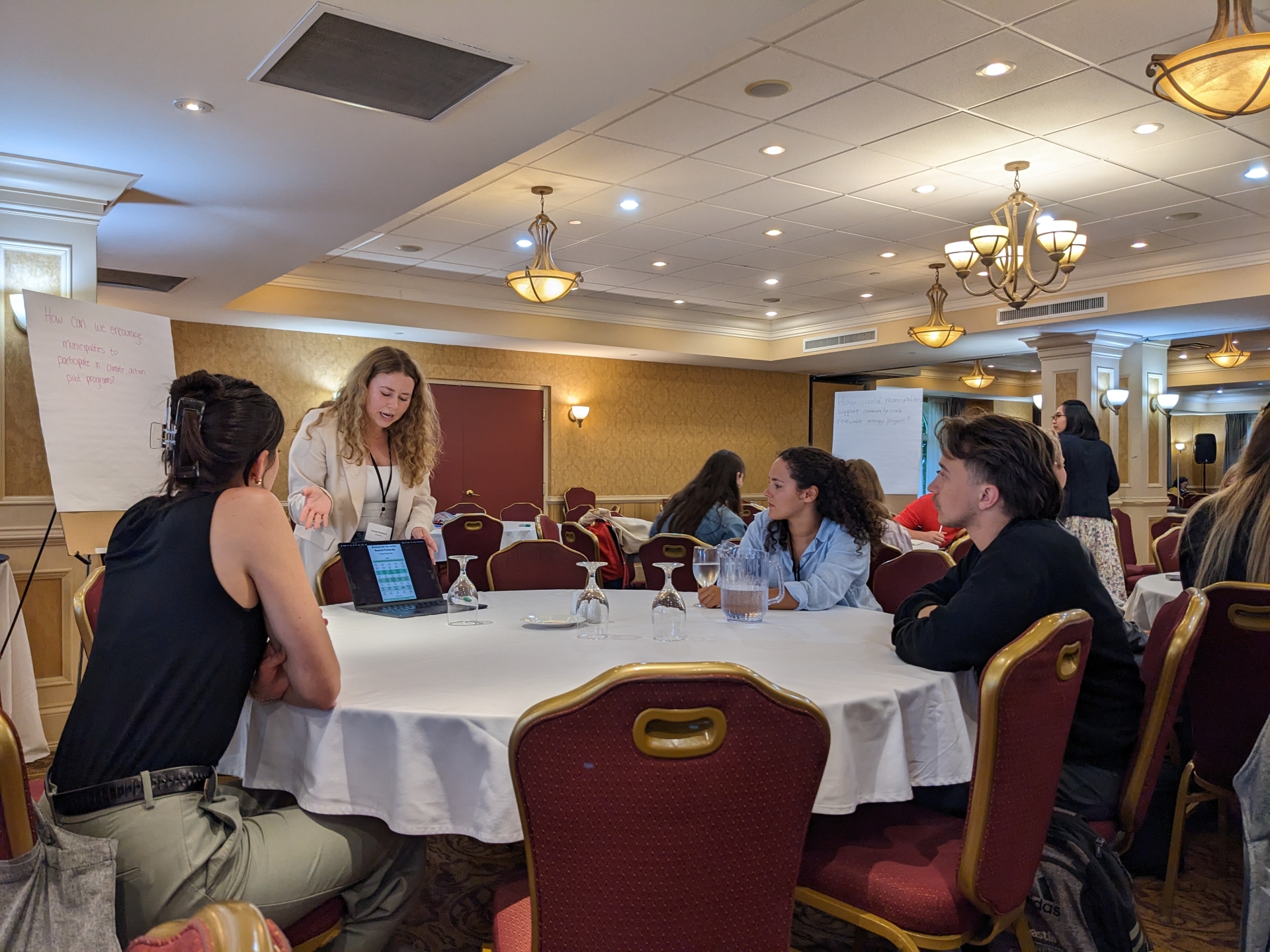 They must pass this covenant to the next owner if they decide to sell the property or lose the rebate. This protects the tenant but is a barrier for landlords.
They must pass this covenant to the next owner if they decide to sell the property or lose the rebate. This protects the tenant but is a barrier for landlords.
I learned that a direct remedy could take the form of a municipal bylaw, provincial legislation, or an administrative board. Indirect remedies like energy labelling and banning oil in rental housing could also help.
Landlords are not incentivized to include the tenant’s power in rent because of a lack of funding. A government subsidy could encourage landlords to pay for power, thus incentivizing energy efficient retrofits.
This internship provided me with more than knowledge about the legal climate of energy efficiency and housing. I got to facilitate a discussion at my first local conference. I gave an informational tour of the Ecology Action Centre office building to the Coady Institute. I made connections in spaces like Efficiency Nova Scotia and the Clean Energy and Equity Network.
And I worked with a supportive and fun team that made me feel like a part of their world, even if it was only for eight weeks. I came to work each day excited and inspired. Thank you, Energy Team, for allowing me to explore those professional and personal experiences with you.
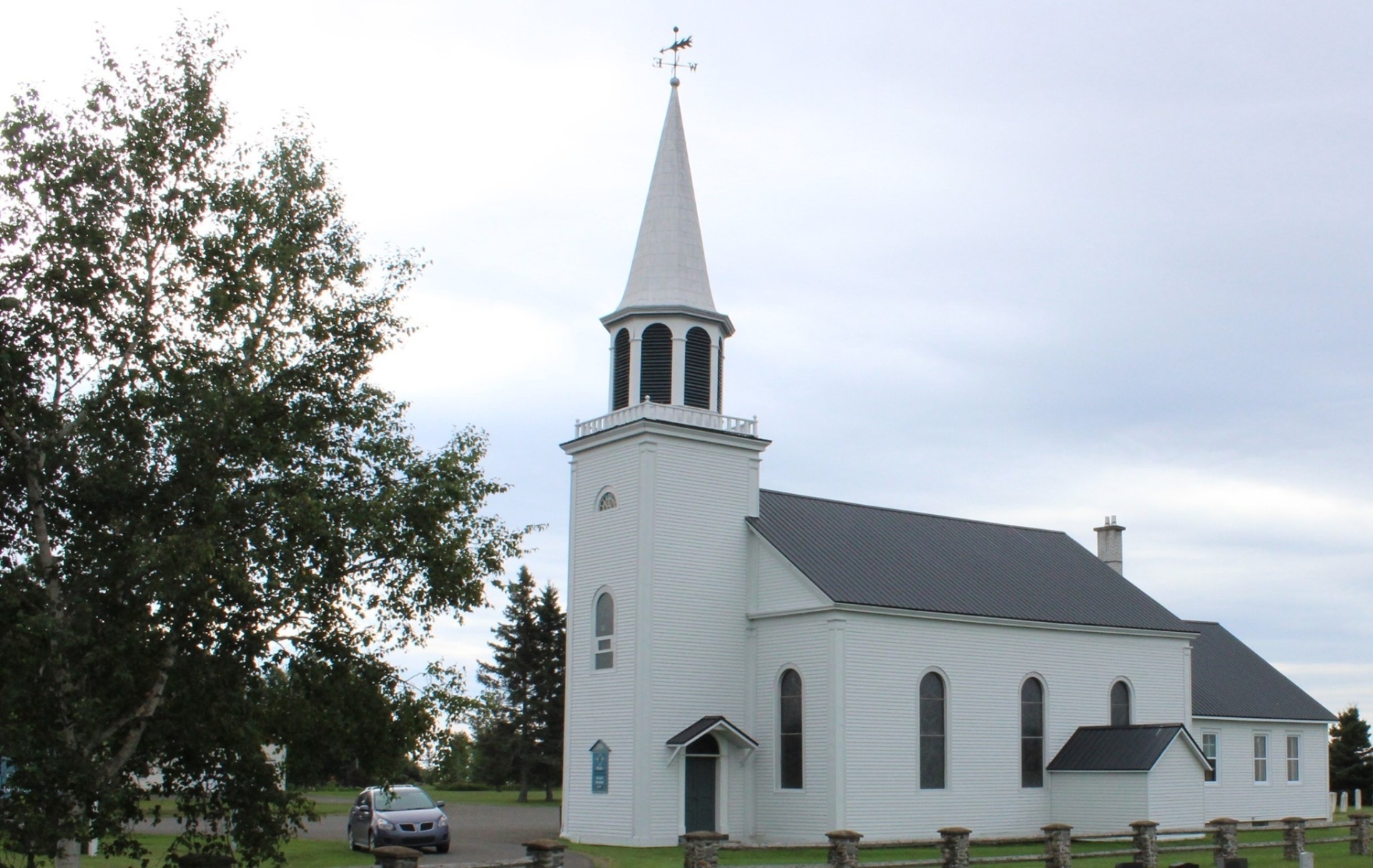
Don’t Panic; Decarbonize
St. Andrew’s United in New Richmond, Quebec, is a small English church on the southern coast of the Gaspé Peninsula between the municipalities of Maria and Caplan. “We're a church that has been celebrating the 185th year of our building,” says Alice Campbell-Dell, the Chair of the Board of Trustee Stewards for the building.
"We’re aging and small—with 20 to 30 people in church on a given Sunday—but we are close, with deep historical ties and traditions. The actual congregation is bigger, but the average age is around 85, so we have many shut ins.”
St. Andrew’s United on the Gaspé Peninsula brings 185-year-old church building into the 21st century | Aug 20, 2024
For years the congregation has been contemplating how to become more carbon friendly, and the anniversary seemed just the occasion to take the plunge into energy retrofits and get rid of two old oil boilers that heated the church, replacing them with highly efficient heat pumps. “We were fortunate in that we received a legacy last fall from a former parishioner,” Campbell-Dell says.
There were simple instructions that came with the money: “Please do something that the church needs.” That was just the motivation needed to get started with an Expression of Interest for the Faithful Footprints funding program, which could cover up to $30,000 of the work.
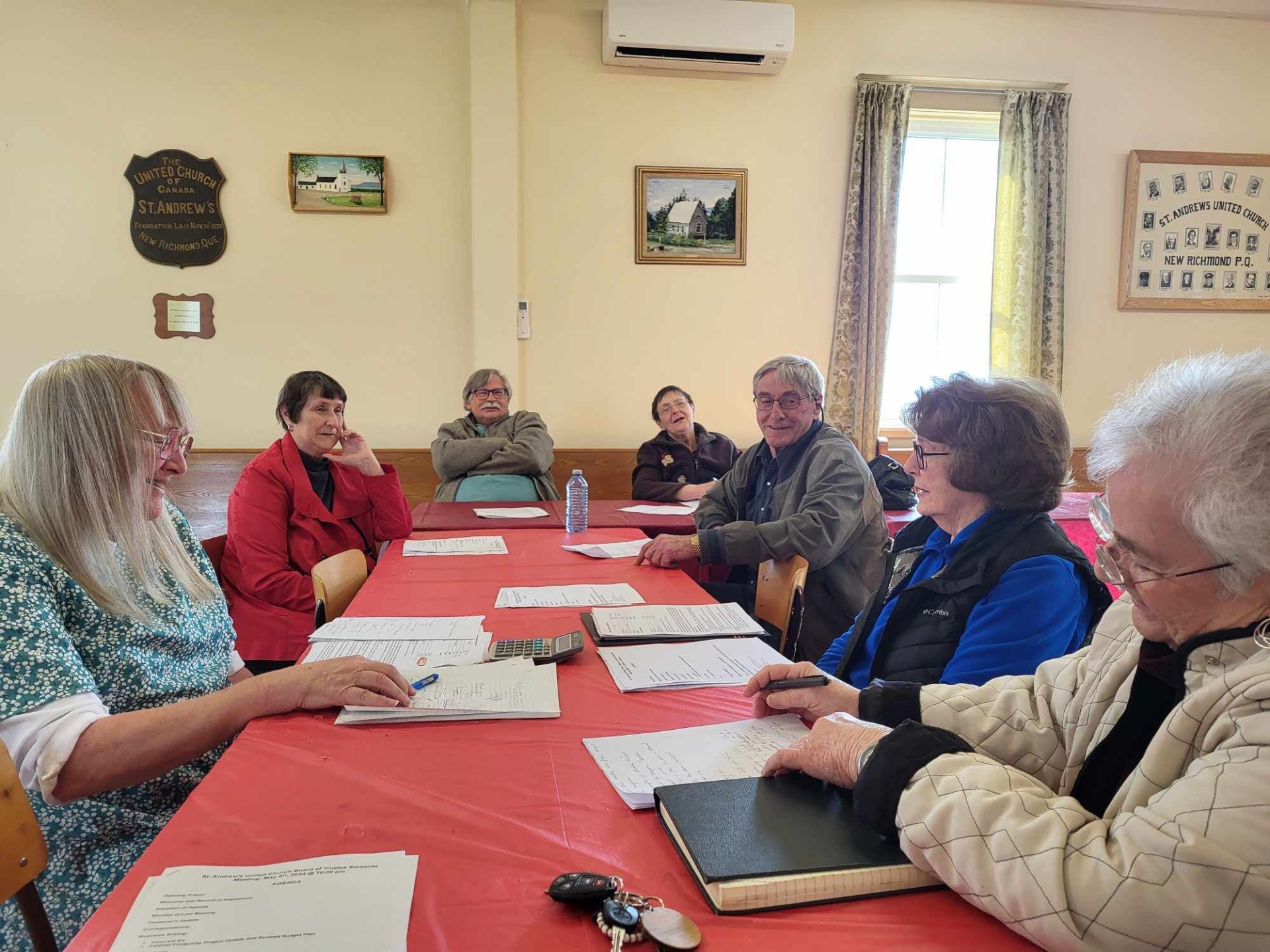 In hindsight, that part was easy. “Applying for a Faithful Footprints grant is the easiest part,” says Campbell-Dell. “Churches should definitely get in touch. If for no other reason just to listen to Stephen Collette [Building Audit Manager]. He is so articulate and funny and it’s a pleasure to sit and listen to him for a while.
In hindsight, that part was easy. “Applying for a Faithful Footprints grant is the easiest part,” says Campbell-Dell. “Churches should definitely get in touch. If for no other reason just to listen to Stephen Collette [Building Audit Manager]. He is so articulate and funny and it’s a pleasure to sit and listen to him for a while.
“They cover two-thirds, which is very generous. But you also need to know your own assets, so you can cover the other third. There is tremendous moral and financial support from Faithful Footprints. They made it easy.”
Campbell-Dell says the paperwork was the most intimidating part of the process, but the accessible support from the Faithful Footprints staff made it easier. “Not painful at all,” says Campbell-Dell. They are still going through reporting requirements for a matching Hydro Quebec grant, but the work with Faithful Footprints has given them confidence they can do it.
The single biggest challenge for this rural congregation was finding craftsmen who could do the work and were available. “It’s an informal attitude to things, like paperwork,” she says. “That was our first hurdle. And working in French can complicate things.
“It’s been a journey but it’s been worth it.”
The heat pumps went in (and the oil boilers out) in spring, so they have yet to see how people will find the winter, or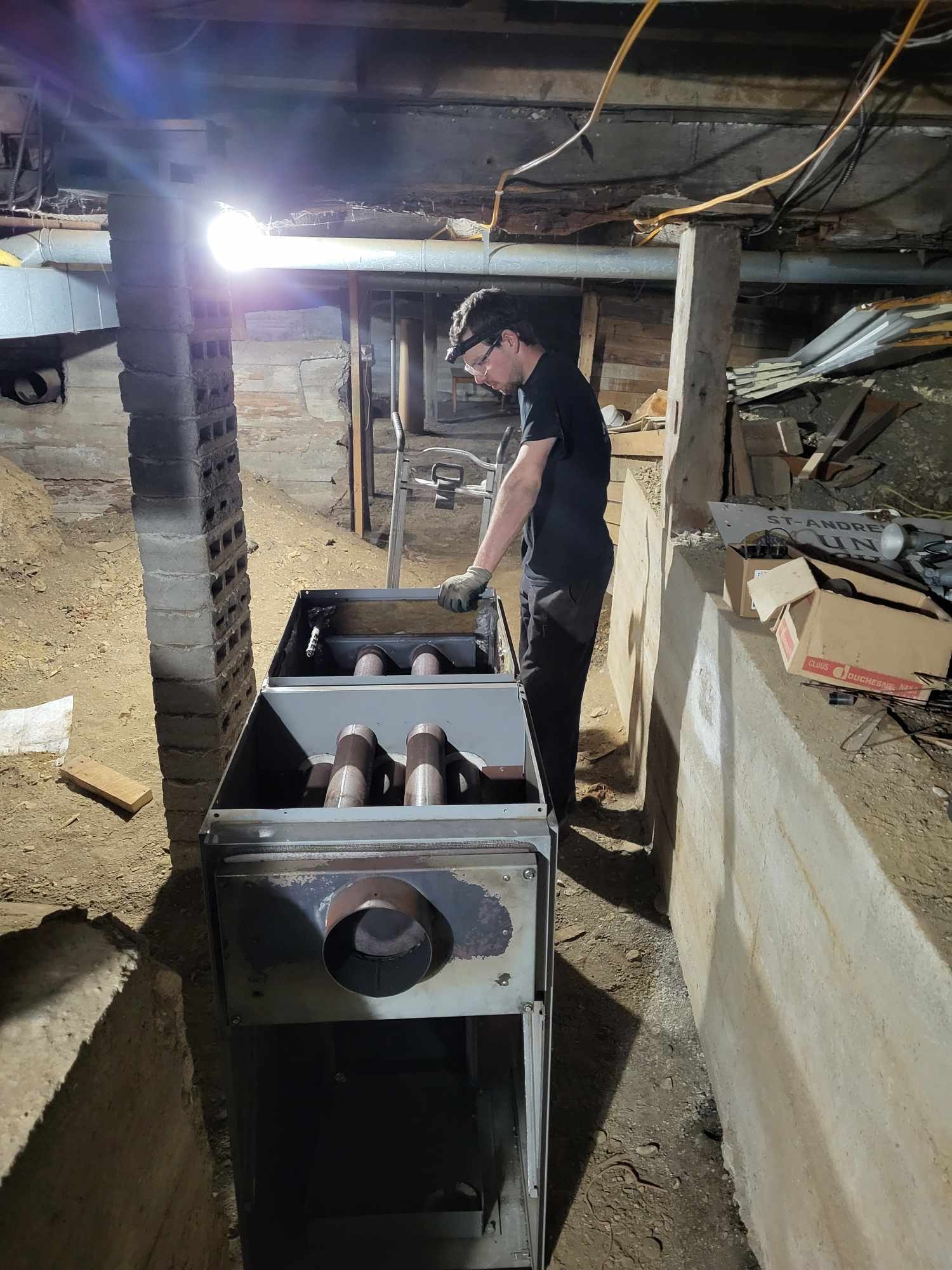 what the bills will be like. For now, people love the efficient cooling system heat pumps provide.
what the bills will be like. For now, people love the efficient cooling system heat pumps provide.
“It’s nice not to be sweltering in the summer,” Campbell-Dell says. “It used to be dangerously hot at events we’d hold. And we’re not pouring emissions into the atmosphere anymore.”
Church members, after some disagreement over acceptable room temperature, agreed to set the heat pumps at 22 and leave blankets in every pew for those who like it warmer.
The congregation isn’t finished retrofitting just yet. The experience has inspired them to find further funding to retrofit the manse as well. They have learned that there will always be setbacks, but to resist the urge to panic.
“When using church money it can be intimidating, like when the bill is higher than the estimate. But we manage.
“On November 30 we will be having an official celebration. We are sincerely grateful for the support of the United Church throughout this program.”

John Wesley United's Energy Efficiency Journey
In today’s blog post we’re sharing the story of John Wesley United’s journey to get off oil.
Located in the community of Roddickton-Bide Arm, John Wesley United is a 1.5-hour drive south of St. Anthony on the eastern side of the Great Northern peninsula of Newfoundland. A dire situation motivated the congregation to reach out to the Faithful Footprint staff. Della DeMoss shares the story...
A Faithful Footprints Story in Newfoundland | July 15, 2024
“We were preparing for a church service (cleaning the building) when my partner and I smelled a strong odour. When I opened the sanctuary doors the porch was filled with smoke. I ran into the furnace room to see what was wrong only to discover the room was filled with thick smoke. So thick you couldn't see anything. I quickly turned the power off to the oil furnace and opened all the doors then called Eric Kinden, who is in charge of the building, in a panic.
"We had been trying to save money to upgrade our electrical panel and install heat pumps but had all but given up when the oil furnace literally died on us.
 "After an emergency board meeting, I reached out to Faithful Footprints, and our ladies group began fundraising to meet the needs of the project. Our congregation was walking strictly on faith because we did not have the funds for this project. We will have a large increase in electricity costs because we are using infrared heaters to keep the church warm. It was a dire situation, and we did not see a way we would be able to achieve what seemed insurmountable odds to ever upgrade our church and free ourselves from dependency on oil as our primary and only heat source.
"After an emergency board meeting, I reached out to Faithful Footprints, and our ladies group began fundraising to meet the needs of the project. Our congregation was walking strictly on faith because we did not have the funds for this project. We will have a large increase in electricity costs because we are using infrared heaters to keep the church warm. It was a dire situation, and we did not see a way we would be able to achieve what seemed insurmountable odds to ever upgrade our church and free ourselves from dependency on oil as our primary and only heat source.
"The church is a wood frame built in1910. There are 32 light fixtures and 1 outside light with old incandescent bulbs. No ceiling fan. No fridge. No kitchen. One bathroom with only cold water.
"Our Goals: upgrade electrical system from a 60-amp fuse panel to a 200-amp breaker panel; replace oil furnace and oil tank with two 24,000 BTU heat pumps in the sanctuary; install blow-in insulation in the attic; and install electrical heaters in the bathroom and foyer.
oil tank with two 24,000 BTU heat pumps in the sanctuary; install blow-in insulation in the attic; and install electrical heaters in the bathroom and foyer.
"With the assistance of this grant, we have been able to move completely away from heating with oil. Our first step was to upgrade our electrical from the 60-watt service to a 200-amp panel. This allowed us to have two heat pumps installed in our sanctuary, an electric heater (for insurance requirements), blow-in insulation in the church attic, a heater in our bathroom, and a heater in the foyer.
"Once the work began our ladies group began working diligently to ensure we had the funds to meet our portion of the agreement. Through crafts and good sales we were able to achieve our goal. The energy this created in our church body was and is quite moving.
"Through donations of church members, we installed two ceiling fans, and a small hot water on-demand system in our bathroom - no more cold hands! We also replaced the incandescent bulbs with all new LED lights, new electrical plugs, and new light switches.
 "The greatest sight to see was Mother’s Day when our church held our first service in the newly upgraded building. The heat pumps worked better than we could ever have imagined. It was so much nicer than the oil heat we had become accustomed to.
"The greatest sight to see was Mother’s Day when our church held our first service in the newly upgraded building. The heat pumps worked better than we could ever have imagined. It was so much nicer than the oil heat we had become accustomed to.
"Knowing we are no longer dependent on oil as our primary heat source, and knowing we are making a difference in the world, even if it is a small one, is a true relief for us all.
"From here, we will continue to upgrade our church as our attention turns to our building's basement. There is work there to be done as the basement is a crawl space and it requires some upgrades to continue making a difference to our heating costs.
"As a direct result of this grant program, we will continue making a difference in our community and will be a shining example of the direct impact Faithful Footprints have made in our church lives and church family.
With a grateful heart,
Congregation of John Wesley United Church"
[Photo credits Della DeMoss & Eric Kinden. Drone shot photo credit Eric Kinden]
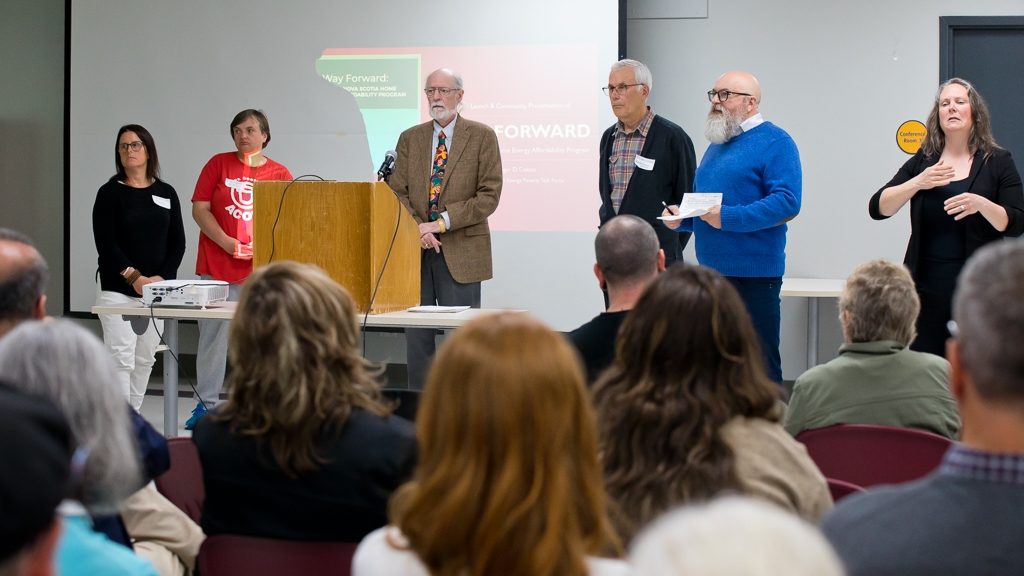
A Way Forward from Energy Poverty in Nova Scotia
by Katharine Turner, Energy Coordinator
May 28th marked the launch of energy poverty expert Roger Colton’s report “A Way Forward: A Made-In-Nova Scotia Home Energy Affordability Program”. This day brought together community members, industry reps, and decision makers from across the province to consider a new approach to the long-standing issue of Nova Scotia’s energy poverty crisis.
Strong Public Interest in Solving Energy Poverty | June 24, 2024
More than 70 people came together at the Captain William Spry Community Centre in Spryfield for the report's launch. The event kicked off with three speakers who all work at the frontlines of energy poverty and housing sharing their personal experiences with energy poverty and speaking to the escalation of the crisis in recent years.
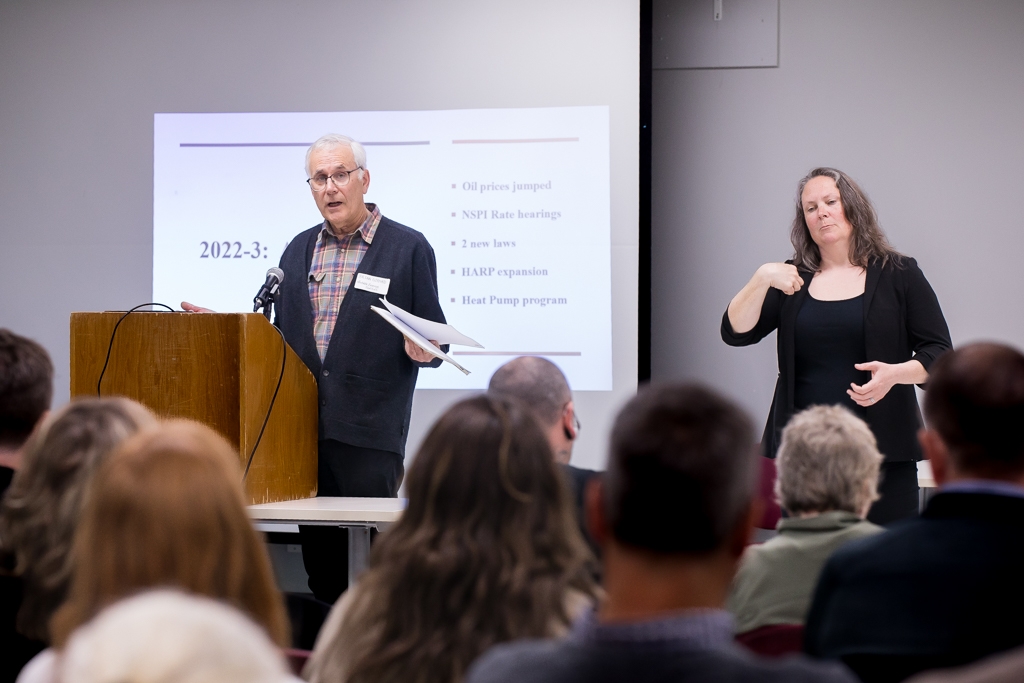 Brian Gifford, chair of the Energy Poverty Tasked Force (which commissioned the report) then spoke to the social conditions and events that led to the formation of the Task Force and A Way Forward. Gifford presented some of the key findings of the report that showed how major fly-ups in fuel-oil prices, consistently low incomes in rural communities, and a lack of coordination between supports has contributed to such high rates of energy poverty for both low and moderate-income Nova Scotians.
Brian Gifford, chair of the Energy Poverty Tasked Force (which commissioned the report) then spoke to the social conditions and events that led to the formation of the Task Force and A Way Forward. Gifford presented some of the key findings of the report that showed how major fly-ups in fuel-oil prices, consistently low incomes in rural communities, and a lack of coordination between supports has contributed to such high rates of energy poverty for both low and moderate-income Nova Scotians.
Colton’s recommendations detailed a 4-pronged universal service program that would offer four key components:
1) a 50% reduction in energy bills for low-income households;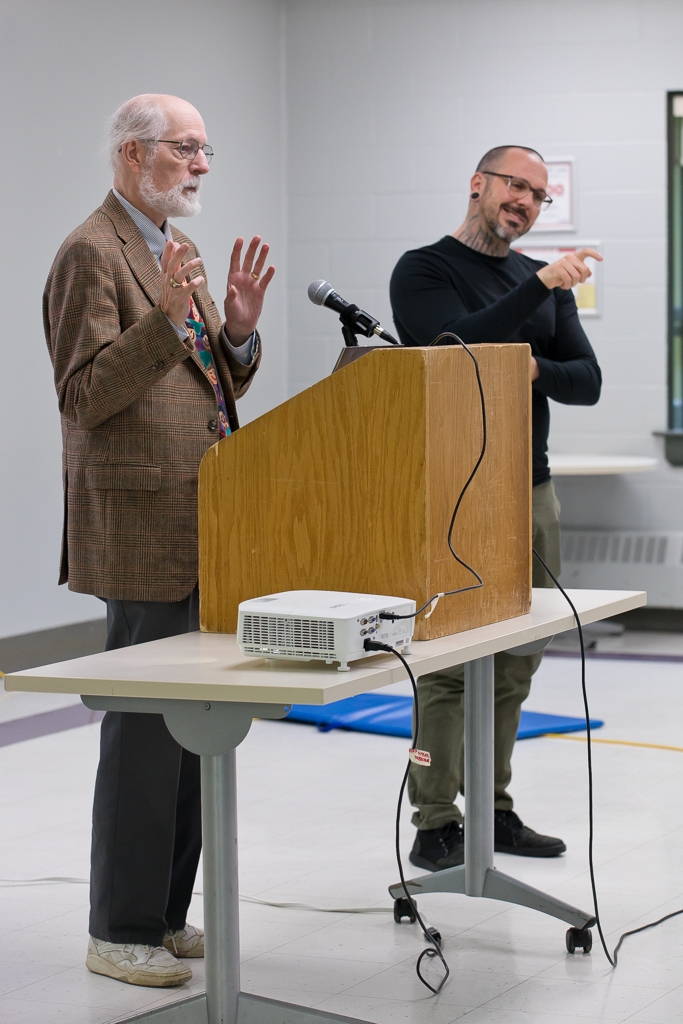
2) an arrears forgiveness program to alleviate energy debt;
3) improved crisis support funding; and
4) continued energy efficiency and home-retrofit programming targeted to low-income households.
The question period was equally sharp and thoughtful, digging into Nova Scotia’s policy landscape as well as the everyday realities and barriers faced by those struggling with their energy bills. As an organizer, to see such a high level of audience engagement was all I could ask for.
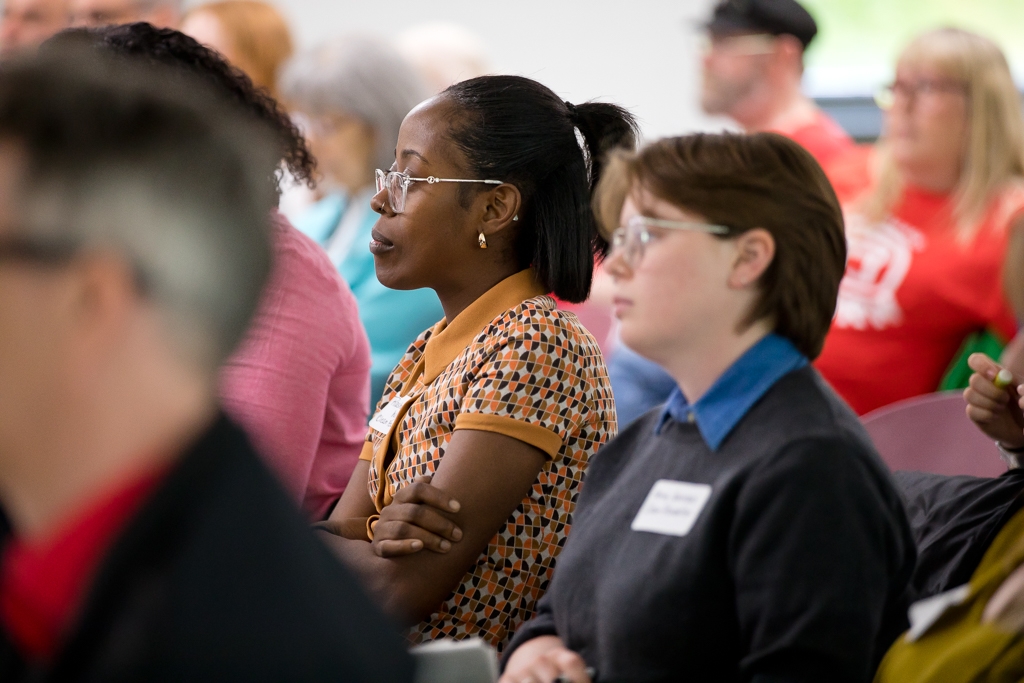 There is still a lot of work to be done, but having so many people from so many different disciplines come together with the general consensus that a serious shift in our approach to energy poverty has been really encouraging.
There is still a lot of work to be done, but having so many people from so many different disciplines come together with the general consensus that a serious shift in our approach to energy poverty has been really encouraging.
Energy poverty is only one of many injustices that need to be addressed in a just transition. It’s my hope that this report contributes to the foundation of work being done to shift how we think about energy and continue to push decision makers towards energy policy that centres the needs of Nova Scotians and our environment.
To act on energy poverty, visit our campaign page for tips and tools to call Premier Houston and your MLA. A Way Forward and additional resources on energy poverty can be found here.

Free Energy Audits for Faith Buildings in Nova Scotia!
Faith groups have identified a need for energy audits of their buildings as an important first step in retrofitting to reduce greenhouse gas emissions.
Until July 31st, the Ecology Action Centre is running a free energy audit program for 50 faith buildings across Nova Scotia.
Watch Our Faith Building Audit Video | June 13, 2024
Energy audits are on a first come, first served basis. Within the program's capacity our goal is to accommodate a diversity of faiths and geographic locations across the province.
Create a more comfortable space for faith members and the community while reducing overhead costs and greenhouse gas emissions.
Participants receive a detailed energy report with recommendations & customized advice qualifying them to apply for Efficiency Nova Scotia rebates.
Sign up now at https://ecologyaction.ca/form/energy-audits.

Part 4 of 4: The Energy Transition Deep Canvassing Report
BY SCOTT OSMOND and ABBY LEFEBVRE
For our final blog post in the Deep Canvassing 4-part series, we are excited to share with you the report that compiles together all the research and results from the Ecology Action Centre's 1-year pilot project.
Read the Deep Canvassing Report | May 23, 2024
You can now read the full report at Energy Transition Deep Canvassing Pilot: Project Report.

Part 3 of 4: Navigating Difficult Conversations
BY SCOTT OSMOND and ABBY LEFEBVRE
In contrast to regular canvassing, deep canvassing focuses on personal, in-depth conversations with active listening and empathy, aiming to build a personal connection, establish trust, and foster exchanges that lead to lasting changes in attitudes or behaviours. While deep canvassing demands more time and resources, it proves more effective in mobilizing voters, increasing turnout at events, and influencing public opinion on complex issues.
Developing the Skills to Deep Canvass | May 8, 2024
To navigate these difficult conversations, a deep canvasser does not need to be well-versed in the topic itself. Instead, they must develop the skills to investigate the deep-rooted reasons and conflicts people have over the subject. This is achieved through active listening and story sharing, deploying many well-proven communication strategies.
Even if you do not plan to deep canvass anytime soon, learning the skills required can help all of us become more effective listeners and communicators.
Building Rapport
Having a good first interaction with someone is essential for building a connection. By being friendly, and actively listening, we can lay the foundations to creating an open and comfortable space for sharing.
To do this, deep canvassers express genuine interest and curiosity in what a person is saying, observe details and make connections, share relatable stories when appropriate, discuss topics that the person may be familiar with, and reflect the persons tone and energy.
Rapport-building questions can include:
"What do you like about living here?"
“How do you like to spend time outside?”
Sharing Stories
A long time ago, a famous detective character used to say, “Just the facts.” He was determined to get at the truth (and find out whodunnit).

And in real life, it is also important to learn the facts. But the reality is humans make sense of the world through story. Story incorporates the many different truths we know into something comprehensive.
Sharing stories, as opposed to only listing facts, is essential in deep canvassing. Facts alone (especially when argued back and forth) do not effectively move people.
Stories allow for genuine human emotion and allow tellers and listeners to connect them to their own experiences. This connection aids in illustrating how working towards a specific cause, such as building a greener world, can benefit individuals, their families, and their communities. That can motivate, inspire, entertain, build commitment, and emotionally connect a person—sometimes all in one story!
In deep canvassing work, stories should be based entirely on lived experience, without listing facts, or making explicit arguments. It is important to offer our own vulnerable and emotional stories to create a safe place to share openly.
Sharing our stories opens the door for others to do the same. When they do, we can better understand the emotion and deep-rooted issues that matter to another person.
In the context of climate work, we use climate-change stories to break down barriers and communicate the risks we personally face. Once we show our own vulnerability, people most often reciprocate by doing the same.
In sharing our stories, we try to use vivid descriptions that allow the listener to visualize. We paint a picture of a lived experience, and how it affected or changed us, allowing the listener to experience what we have.
It is important to clearly state how these experiences made us feel, and explain the reason for the emotion, why we felt the way we did.
Active Listening and Compassionate Curiosity
We use a "Cone of Curiosity" to elicit other people’s stories. We listen very carefully for any hint of a story, and when we hear it, we ask open-ended 5W questions:
When was this?
Where?
Who was there?
How did that come about?
Then what happened?
Why do think that was?
This way, we can dig deeper into the emotional core of their story with further questions: How did that make you feel? And, Why did you feel that way?
It is important to never assume we already know this. These questions allow us, and them, to process how and why they felt the way they did during the events of their story.
Steering the Conversation
It is hard when talking to someone with a differing opinion to avoid countering with fact-sharing. However, doing so can damage the trust you have built.
We use the Affirm, Answer, Redirect (AAR) method to steer the conversation back to lived experiences and stories:
-
Affirm: We show we’re listening and acknowledge the person's concerns without necessarily agreeing. We say things like, “I hear you,” or we simply nod.
-
Answer: We address what the person is saying, setting the stage for redirection: “For me, I have experienced….” This is a good place to share a related and impactful story.
-
Redirect: We guide the conversation back to the purpose of deep canvassing by asking further open-ended questions about the person’s story or experience with the topic.
Sometimes we interrupt and redirect the conversation back to the topic. Known as an “Honorable Interruption,” this is an important way to keep on topic by asking follow-up questions to something said earlier.
Having these personal conversations and sharing vulnerable moments with strangers is hard emotional work. We try to check in with ourselves and our colleagues as we go.
For more information about deep canvassing, and free online workshops, visit https://deepcanvass.org.
Part 2 of 4: Deep Canvassing History & Science
BY SCOTT OSMOND and ABBY LEFEBVRE
Deep canvassing has become a buzzword amongst the activism community and for good reason. This science-backed communication tactic to build support for a cause is highly effective. It is being adapted to an increasing number of issues.
How Deep Canvassing Became an Essential Tool for Change | April 11, 2024
Deep canvassing builds on important communication strategies that humans have used since the beginning: Storytelling, listening, and relationship building.
A genesis occurred in California in 2008. With Proposition 8, 52 percent of Californians voted to eliminate the right to marry for same-sex couples. Organizers across the United States were struggling to grasp at why. Especially since surveys showed a majority of 60 percent support for marriage equality prior to the release of the proposition.
 Astonished as to why so many people voted for the devastating proposition, activists and organizers at the Los Angeles LGBT Center’s political advocacy division, Leadership Lab rallied a group to go door to door. Their goal was to speak with those who had voted for the proposition and to understand the reasons behind it.
Astonished as to why so many people voted for the devastating proposition, activists and organizers at the Los Angeles LGBT Center’s political advocacy division, Leadership Lab rallied a group to go door to door. Their goal was to speak with those who had voted for the proposition and to understand the reasons behind it.
Instead of seeking out likeminded people, delivering a message using a script, and promoting quick and concise message delivery, they instead invoked active listening, compassionate curiosity, and reasoning. Organizers at Leadership Lab quickly came to observe the impact meaningful conversations could have on those who were conflicted. Working with canvassers and studying the recordings, they began formulating a structured-conversation approach that would become deep canvassing.
It is important to know that decisions are not primarily made using logic or facts. More often they are the results of our emotions.
Many studies have supported this finding. Antonio Damasio of the Department of Neurology at University of Iowa College of Medicine studied people with damaged ventromedial prefrontal cortexes. This is the part of the brain that regulates our responses to emotions. He found that people with this injury were impaired when it came to making even the simplest of everyday decisions. They needed emotional regulation to decide things.
The Study of Deep Canvassing
One of the earliest studies on deep canvassing was completed by University of California graduate student Michael LaCour and Professor Donald Green in 2014, engaging people with gay or straight canvassers to talk about same-sex marriage rights. The study showed that while canvassers who were part of the LGBTQ+ community made a longer lasting influence, all canvassers had some form of lasting impression. Additionally, there was evidence to suggest that this influence and change of opinion could spread to others in the participants’ household-and-social networks.
A few years later, David Brockman and Joshua Kalla at University of California investigated the effects of deep canvassing by conducting in-person, phone, and video canvassing. Aside from confirming the effectiveness and impact deep canvassing can have on voters, they also came to find that the tactic is widely applicable, and can even be effective for average people in everyday conversations. The study concluded that although highly effective, this is a difficult tactic to implement, requiring large amounts of time and commitment to properly train and support canvassers.
Many more organizations have since used the concept to help battle polarization and discrimination of marginalized people throughout the United States, igniting deeper understanding, acceptance, and justice-seeking.
Deep Canvassing Leads to 100 Percent Renewables in Trail, BC
In the late 2010s, the West Kootenay Ecosociety was working to develop campaigns and rally public support in communities in British Columbia for their municipal governments to declare a renewable energy transition goal by 2050. By rallying like-minded people together, using traditional community organization and mobilization tactics, the group was able to successfully push communities to declare this target. However, when they began work in the town of Trail, they quickly found themselves struggling to find people to rally and support their goal.
Trail, British Columbia is a town of 8,000 people situated on the banks of the Columbia River. It is popular among outdoor enthusiasts for its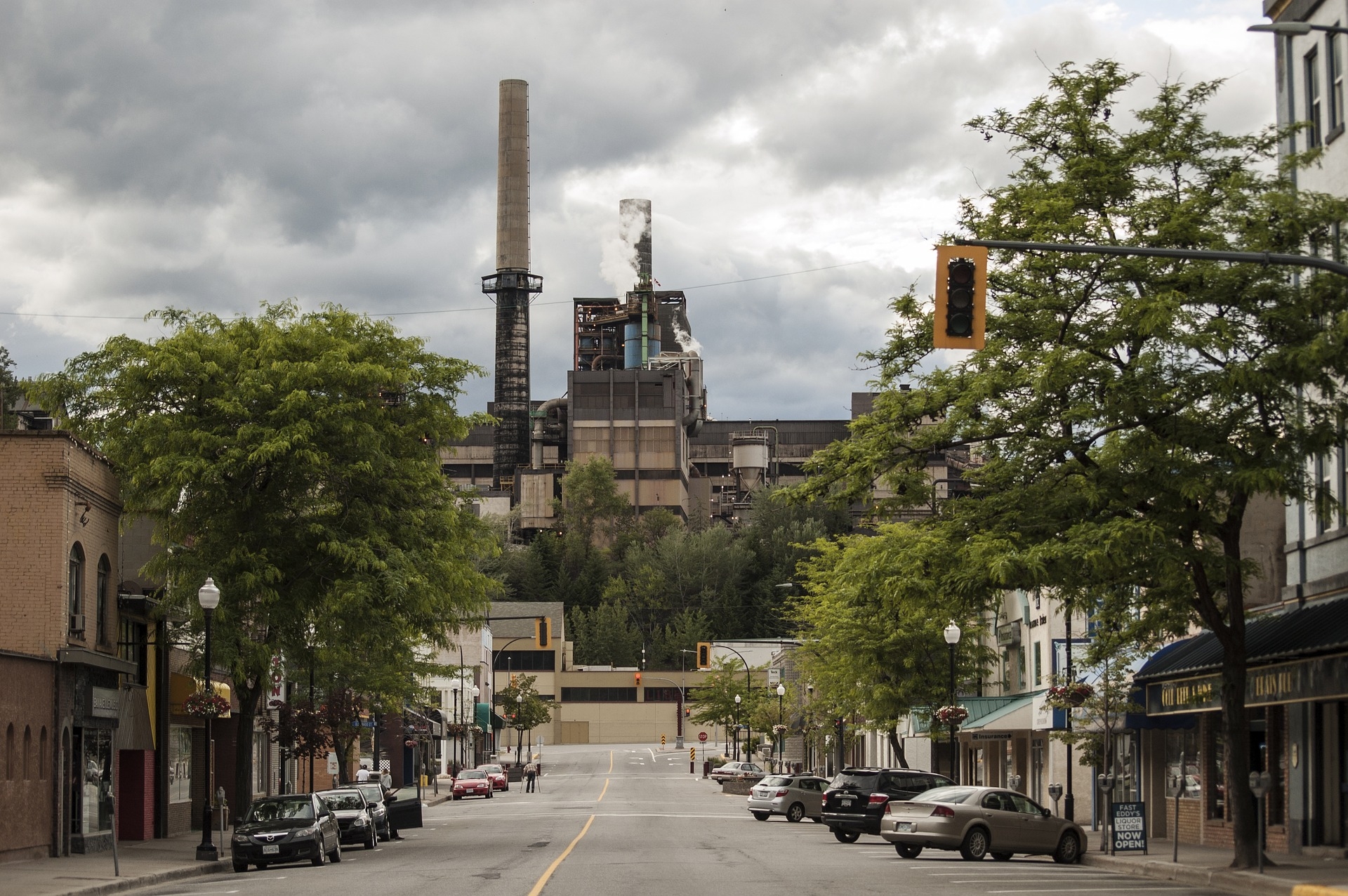 spectacular access to the surrounding environment. A large proportion of its residents rely directly or indirectly on employment from Cominco’s Lead-Zinc Smelter, one of the largest lead-zinc smelters in the world.
spectacular access to the surrounding environment. A large proportion of its residents rely directly or indirectly on employment from Cominco’s Lead-Zinc Smelter, one of the largest lead-zinc smelters in the world.
Residents were found to be closely connected to the operation, which many families had relied on for decades, as a source of income. Despite the smelter’s long legacy of negative environmental impacts, when the West Kootenay Ecosociety began campaigning they were not able to rally the number of people to take action as they needed.
Thinking of new ways to build support, the organization turned to the deep canvassing work being completed in the United States. They soon found themselves partnering with organizations such as the New Conversation Initiative, Yale Program on Climate Change Communication, and the Montana Engagement Partnership, which had just completed a deep-canvassing project for conservation efforts.
West Kootenay Ecosociety had ideal conditions for deploying deep canvassing: A relatively small town, citizens who had witnessed the damaging effects of climate change and pollution, yet a conflict due to a community identity built around an industry that pollutes and contributes significantly to climate change.
Over the following year and half, the group worked tirelessly to adapt a deep-canvassing script for climate action and the unique characteristics of Trail. After 60 iterations, their script achieved a persuasion rate of 42 percent. With the help of 85 staff and volunteers, the group successfully engaged in nearly 1,200 conversations through in-person and phone canvassing.
Moreover, they convinced more than 500 people to sign a petition of the municipal government to declare a 100 percent renewable energy target by 2050. In April 2022, city council unanimously passed that goal as policy.
The project was the first deep-canvassing program in Canada and the first in the world to address issues related to climate and energy. The organization that led this deep-canvassing project now goes by the name Neighbours United and continues to work on deep-canvassing projects across Canada, helping other organizations successfully implement their own deep-canvassing projects.
The idea has inspired the Ecology Action Centre to pilot their own project around building support for renewable energy with the goal of assessing and learning the process so that it may be used for future campaigns in the organization.

Part 1 of 4: We're the Ones Who Listen
BY SCOTT OSMOND and ABBY LEFEBVRE
In early 2023, the Ecology Action Centre launched the It's in Our Power campaign to build support for the province's transition to a clean electricity grid. As part of this campaign, we wanted to investigate “deep canvassing,” a series of 20-30-minute one-on-one conversations that involve active listening and empathizing, as well as asking open-ended questions to engage Nova Scotians.
Ecology Action Centre Uses Deep Canvassing to Learn Views on Energy Transition | April 2, 2024
Our aim was to better understand people’s concerns and barriers about the transition to 100 percent clean electricity, while also learning the deep canvassing process, so we can use it effectively in future campaigns.
The project involved research, consultations, training staff and volunteers, and script development. The first in-person canvassing happened in Stellarton in March. In June, we shifted our focus to Eastern Passage for the summer. To make the project accessible to more volunteers, phone canvassing was introduced in August using a platform called CallHub. We followed with a second round of recruitment and an updated training program. Canvassing continued in October before finally concluding in early December.
The goal of these in-depth conversations was to prompt individuals to acknowledge and reassess their hidden biases and assumptions on a specific subject, thereby enabling them to become more receptive to alternative viewpoints, achieving greater understanding of the complexities of the issue. We also aim to foster empathy, respect, and comprehension, while addressing vital community issues. By cultivating these robust connections, we can inspire positive change and collaborate toward a more sustainable and harmonious future.
 Our staff and volunteers learned a ton from the deep canvassing experience. First, deep canvassing is an effective and impactful tool, a meaningful way to address people’s conflicts over political, social justice, and environmental issues. Building on communication tactics, scientific research, and a wide variety of trial projects, deep canvassing can be an instrumental part of future campaigns and community work.
Our staff and volunteers learned a ton from the deep canvassing experience. First, deep canvassing is an effective and impactful tool, a meaningful way to address people’s conflicts over political, social justice, and environmental issues. Building on communication tactics, scientific research, and a wide variety of trial projects, deep canvassing can be an instrumental part of future campaigns and community work.
Deep canvassing is also time and resource intensive. Our project team recommended that deep canvassing should not be the first tactic used in a campaign and instead be deployed when the correct conditions are met. This view is shared by other organizations that have completed deep canvassing campaigns and arises from the large amounts of time, capital, and resources needed for such a project.
Deep canvassing is growing in popularity among campaigners in the last five years. This growth has caused an explosion in research data and our shared understanding of the topics under discussion. As a result, campaigners are adapting this tool to use for more and more issues. These results are reason for hope.
People want change and fear what will happen if society doesn’t make that change. Our project team was pleasantly surprised by how often we came across people who shared our concern for the future impacts of climate change, and our sense of the urgency that government take action to reduce Nova Scotia’s greenhouse gas emissions. This provided us all with hope that collective change is coming!
There is a future for deep canvassing at the Ecology Action Centre. Because deep canvassing is based in sharing lived experiences through storytelling and active listening, you do not need to be an expert in a particular issue to be able to build support for it through deep canvassing. Deep canvassing is highly adaptable and can be deployed across multiple disciplines.
Through the deep canvassing experience, we learned many valuable lessons around how people viewed climate change and the renewable energy transition. Even more so, we learned valuable lessons about the process of deep canvassing itself, and how it can be adapted to Nova Scotia and for future campaigns.
These lessons in community engagement and climate change communications will help guide our work with the public and us to better address climate and energy issues.

Introducing the Spiritual Coalition On Climate Action Nova Scotia (SCOCANS)
On Tuesday March 5, 14 people representing 8 different faith traditions, and all sharing a commitment to sustainability and climate change mitigation and adaptation work, spent the day together with Ecology Action Centre at the Vedanta Ashram Society Hindu Temple in Halifax, Nova Scotia. This was their second such gathering in recent months, and they have committed to work together to be a unified spiritual voice on the importance of reducing greenhouse gas emissions, and caring for the Earth, in Nova Scotia. They found a deeply shared concern for this province's recent decision not to proclaim the Coastal Protection Act, leaving the coastline completely unregulated during a climate emergency. SCOCANS aims to make a unified response to the government their first official action.
Spiritual Organizations to Work Together on Environmental Initiatives | March 18, 2024
Participation was broad and diverse, and included representatives from several Catholic churches, the Ummah Mosque, Development and Peace—Caritas Canada, the Universalist Unitarian Church of Halifax, several United churches, the Shambhala Centre, Touching the Earth Collective, a Jewish Rabbi, KAIROS Halifax, and the United Eco-Justice Group.

“It is very exciting," said Jim Abraham of the interfaith event. Abraham is a Catholic meteorologist who sits on both the Good Shepherd Pastoral Council and the Canadian Meteorological and Oceanographic Society’s Multifaith Project.
"[It's very positive] to have the opportunity for a number of Faiths and or Spiritual organizations to work together on priority environmental initiatives that are aligned with all of our beliefs and responsibilities to care for our common home."
Excitement was the vibe in the room, in part because many were new to Halifax's Hindu Temple, which has been in pace for five decades. Mrs. Raj Verma, Chairperson of the Vedanta Ashram Society, welcomed the group to the space, and gave a brief history of the building and organization. She noted that the coalition's goals were also the temple's goals, including sustainability and accepting everybody.
Lunch was catered by a friend of the community, a delicious South Indian vegetarian biryani. At each of these gatherings those in attendance have agreed on the importance of breaking bread together to build community among one another.
The day consisted of large and small-group discussions, during which some decisions were made as to the name and structure of the group. It will meet three times per year, work to establish shared positions on environmental policy matters, share resources on greenhouse gas reduction initiatives (for example, installing electric vehicle charging stations in faith building parking lots), as well as working to educate the public on the importance of environmentally responsible behaviour.
“My personal highlight of the gathering was hearing the passion the group expressed for taking action on important issues,” said Hannah Minzloff, an Energy Efficiency Coordinator for Ecology Action Centre. “In our small group discussion, we quickly landed on the one topic everyone agreed was most important to act on immediately: the Nova Scotia Government scrapping the Coastal Protection Act.”
Minzloff also presented on Ecology Action Centre's new work with Clean Foundation, Faith & the Common Good, and Efficiency Nova Scotia to provide free energy audits for faith buildings across Nova Scotia. This program is made possible by generous financial support from the Low Carbon Communities fund.
“It was amazing to see a small disparate group of folks come together from different faiths, traditions and spiritual expressions," said Stephen Law, who facilitated the group discussion, "to commit to taking action in Nova Scotia on climate change and responding to the climate crisis of our times.”

Carman United's Journey to a Sustainable Future
By the Trustees of Carman United Church (Donald Layton, Paula Jane Francis, Daniel McKeough, & Rev. Nick Phillips)
The result of our upgrades has been quite wonderful. We are no longer constantly fundraising to pay the oil bill. We have a warm building for our meetings and rehearsals. We have been able to host dinners, including a Christmas dinner for the international students.
Cape Breton Congregation Fights Climate Change, Saves Money and Builds Community | March 12, 2024
Our journey on the way to having a more sustainable future for our church began at our annual meeting in June 2022. We had been out of our physical building since the beginning of the pandemic in March 2020. The majority of our services had been held online although, beginning at Christmas 2021, we had begun to worship in our local firehall. It was proposed at our annual meeting that we give up our physical building and continue to worship in the firehall.
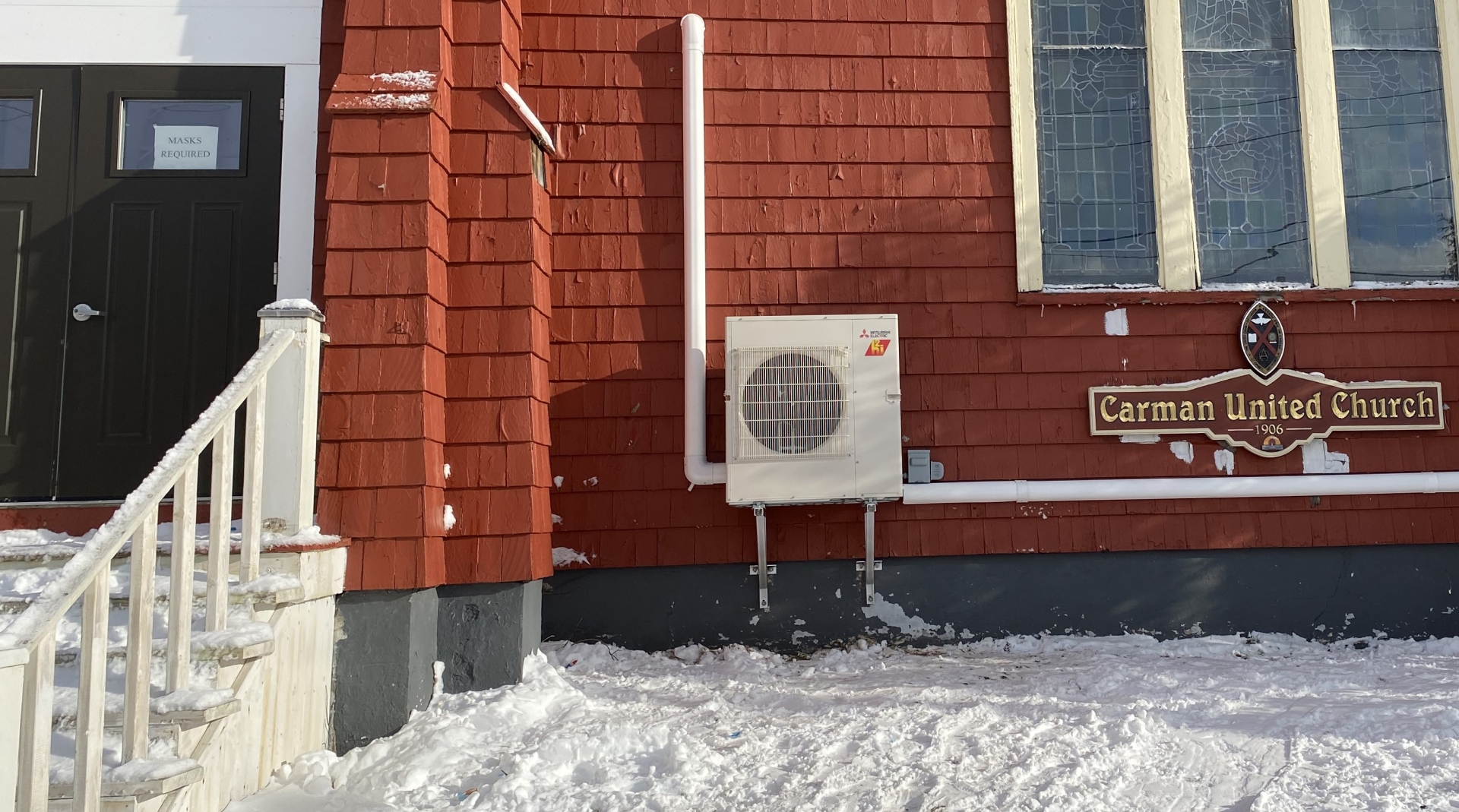 Moving to the firehall would have been an easy solution in many ways; however, what would we then do with our existing building? Selling it did not seem likely considering the economically depressed area in which we are situated. Leaving it to stand empty seemed like no solution at all.
Moving to the firehall would have been an easy solution in many ways; however, what would we then do with our existing building? Selling it did not seem likely considering the economically depressed area in which we are situated. Leaving it to stand empty seemed like no solution at all.
The regional representative for our congregation had heard of the Faithful Footprints grant and explained it to the congregation at the meeting. After much discussion, it was agreed we would apply for the grant and use the money to buy heat pumps so we would no longer have to rely on oil.
We received a large donation from a member of our congregation that enabled us to begin the work with no delay. We did no extra fundraising for this project.
The result of our upgrades has been quite wonderful. We are no longer constantly fundraising to pay the oil bill. We have a warm building for our meetings and rehearsals. We have been able to host dinners, including a Christmas dinner for the international students. 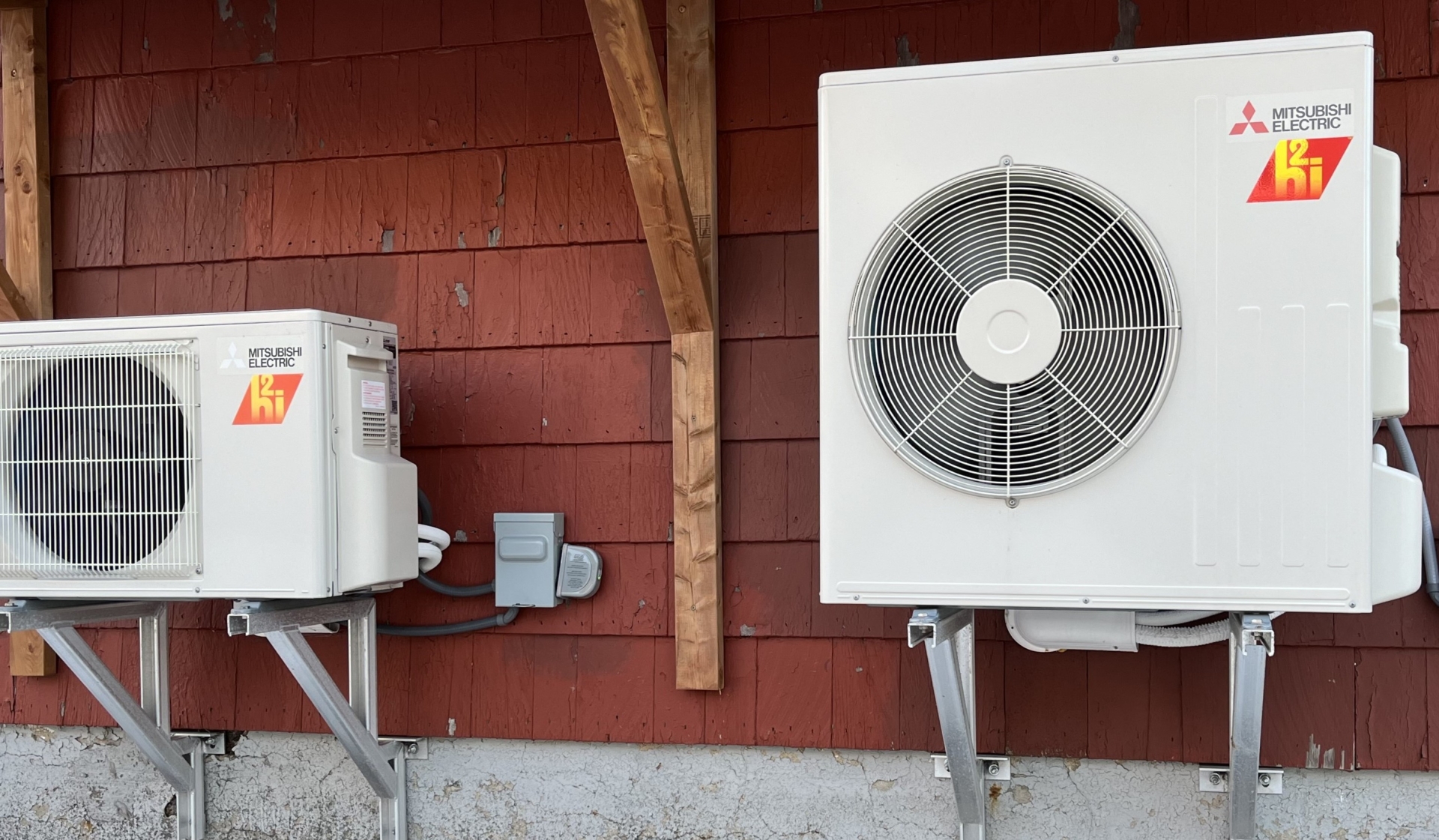
The heat pumps were installed early in January 2023. We have completed the information for our annual report, and are very pleased to report that in 2023, with heat pumps, we spent about $5,400 LESS than the year before for overall heating costs.
These savings will allow us to purchase an industrial dishwasher for our kitchen, allowing us to do more outreach for our community, like the Christmas dinner we hosted for International Students, as mentioned above. The students never had a Turkey meal before attending this event.
One of our plans for the future is to install solar panels. Our area is very prone to hurricanes and our town currently has no warming centre. We would like to be able to offer hot food and a place to stay if we are without power for an extended period.

Seniors College Association of Nova Scotia Wraps Up Energy Efficiency Seminar Series
By Molly Foster
The Seniors College Association of Nova Scotia (SCAN) recently celebrated the completion of the final two workshops in their Energy Efficiency seminar series. These last sessions taught attendees about Zero Carbon Building Standards, Electric Vehicles, and HalifACT.
WATCH: Building Standards, Electric Vehicles, and HaliFACT | December 20, 2023
SCANS has completed their final workshops in their course on Energy Efficiency for Active Citizens. The series introduced energy efficiency as a key element of climate action and the clean energy transition.
The fourth installment of the SCANS workshop series featured a captivating presentation on GBC Zero Carbon Building Standards by William Marshall, a Professional Engineer with expertise in process and project management within commercial, residential, and industrial sectors.
William has been a driving force in the design and implementation of sustainable buildings, energy efficiency initiatives, and high-performance mechanical systems. His valuable experience includes serving as the Environmental Manager for Michelin North America and as the lead Faculty in the Nova Scotia Community College's Energy Sustainability Engineering Technology Program (ESET). Currently, Marshall is an active faculty member with both the Canadian Institute for Energy Training (CIET) and the Canada Green Building Council (CAGBC).
During the presentation, Marshall delved into the intricacies of GBC Zero Carbon Building Standards. Representatives from Clean Foundation's Next Ride program also joined the session to give a 101 on Electric Vehicles, and even came prepared with a Chevy Bolt for people to test drive.
The fifth and final seminar featured Kevin Boutilier, Manager of Community Energy with the Halifax Regional Municipality. Kevin’s journey in the renewable energy industry began in 2013 when he received his Bachelor of Engineering degree. Over the years, he became involved with solar energy system design, feasibility, installation, and operation. In his current role, Boutilier oversees the successful delivery of the Solar City program, a new Retrofit Pilot program, and the Municipal Electric Vehicle Strategy.
At the heart of his responsibilities is his technical support in implementating HalifACT, the Halifax Regional Municipality’s ambitious climate action plan. HalifACT aims to reduce community-wide emissions by 75% over 2016 levels, be fully net-zero by 2050, and achieve net-zero municipal operations (e.g. community centres, fire stations, transit.) by 2030.
The success of this seminar series underscores the Seniors College Association of Nova Scotia's commitment to fostering a culture of continuous learning and promoting sustainable practices. As SCANS continues to organize workshops and seminars, it remains a pillar of educational excellence for seniors in Nova Scotia, empowering them to navigate the complexities of our ever-evolving community.
Watch William Marshall's presentation on Zero Carbon Building Standards:
Watch Kevin Boutilier's presentation on HalifACT:
Molly Foster is a Building Efficiency Intern for Ecology Action Centre's Energy & Climate team.
The Heat Pump Advantage: Efficiency, Savings, and Sustainability | December 19, 2023
By Molly Foster
As we wrap up 2023 and steadily approach the snowy season, it’s time to rethink how we heat and cool our homes. Traditional systems like furnaces and air conditioners are being taken over by a more efficient, eco-friendly, and cost-effective alternative that’s taking Atlantic Canada by storm: heat pumps.
What is a Heat Pump? | December 19, 2023
Heat pumps do just that – pump heat from one place to another. This means they can transfer heat into your living space on cold days and remove heat from your home on warm summer days to cool you off.
Charles Bull, whose three-storey home was previously heated solely via wood pellet stove, says he’s a “happy customer.” Like many homeowners, his family struggled with higher floors being much cooler than lower floors near the woodstove.
“We just love it!” says Bull. “A woodstove gives an intense amount of heat coming out of this small thing which has to dissipate, but the heat pump has a large volume of nice, warm air, not too hot, just warm.”
“I would definitely recommend heat pumps to anyone. You’re going to save a lot of energy, they’re quiet, and it’s no longer a new, untested technology. They’ve been around for quite a while, and I’d say get a top-quality one.”
To demystify the science behind heat pumps, here is a step-by-step guide on how these champions of efficiency actually work:
A typical heat pump consists of two parts: an indoor unit, and an outdoor unit. These systems are connected by a ‘refrigerant line,’ holding fluid that can quickly absorb heat.
- During the heating season, the outdoor heat pump unit extracts heat from outside (yes, there’s still heat in chilly air!)
- The liquid refrigerant inside your heat pump absorbs this heat, turning it from a liquid to a gas. The heat pump compresses this gas, squishing it to increase its temperature.
- This hot gas is then sent to your indoor heat pump, where it moves through a series of coils or pipes to warm up the air in your living space.
- On hot days, the process reverses. The indoor heat pump extracts heat from your living space and releases it outside, effectively cooling your building.
It’s important to note that proper insulation and air sealing are essential for optimizing the efficiency of your heat pump. A well-insulated and tightly sealed home minimizes heat loss in winter and prevents cool air escaping in the summer.
If you’re considering switching to a heat pump, keep in mind that regular preventative maintenance increases the lifespan of your system and ensures that it continues to operate at peak performance. Here are some maintenance tips:
- Clean or replace your air filters every few months: Rinse air filters off under lukewarm water, then pat them down to dry before reinserting them into the heat pump. Check your owner’s guide to determine how to properly remove and reinsert your air filters. You may want to increase the frequency of your cleaning if you have allergies, or if you have a pet that sheds.
- Check your outdoor unit for debris: Regularly inspect the outdoor unit for leaves, dirt, or debris that may obstruct airflow.
- Contact a Professional: If you have any questions, or if your heat pump just isn’t working right, it’s always best to consult a professional HVAC technician. To do so, take a look at Efficiency Nova Scotia’s Preferred Partners list.
Watch Efficiency Nova Scotia’s ‘How to Maintain Your Heat Pump’ below.
One of the most exciting aspects of heat pumps is their ability to put money back in your wallet while also reducing your carbon footprint. Heat pumps use a small amount of electricity, consuming about 1 unit of electricity per 4 units of heat moved. Their energy-efficiency makes them cheaper to run compared to traditional heating and cooling systems. By relying on the natural heat exchange process rather than burning fossil fuels, heat pumps also significantly cut down on greenhouse gas emissions.
There are rebates available that may help you cover the cost of switching to a heat pump. Visit the Efficiency Nova Scotia Heat Pump Rebate website to find detailed information about available rebates and eligibility criteria.
Embracing the benefits of heat pumps isn’t just good for your home and wallet – it’s a responsible choice for our environment. In Charles’s words, “People should know everything we do makes a difference… If you’re still on oil, think about it. Don’t wait.”
Molly Foster is a Building Efficiency Intern with Ecology Action Centre's Energy & Climate Team.
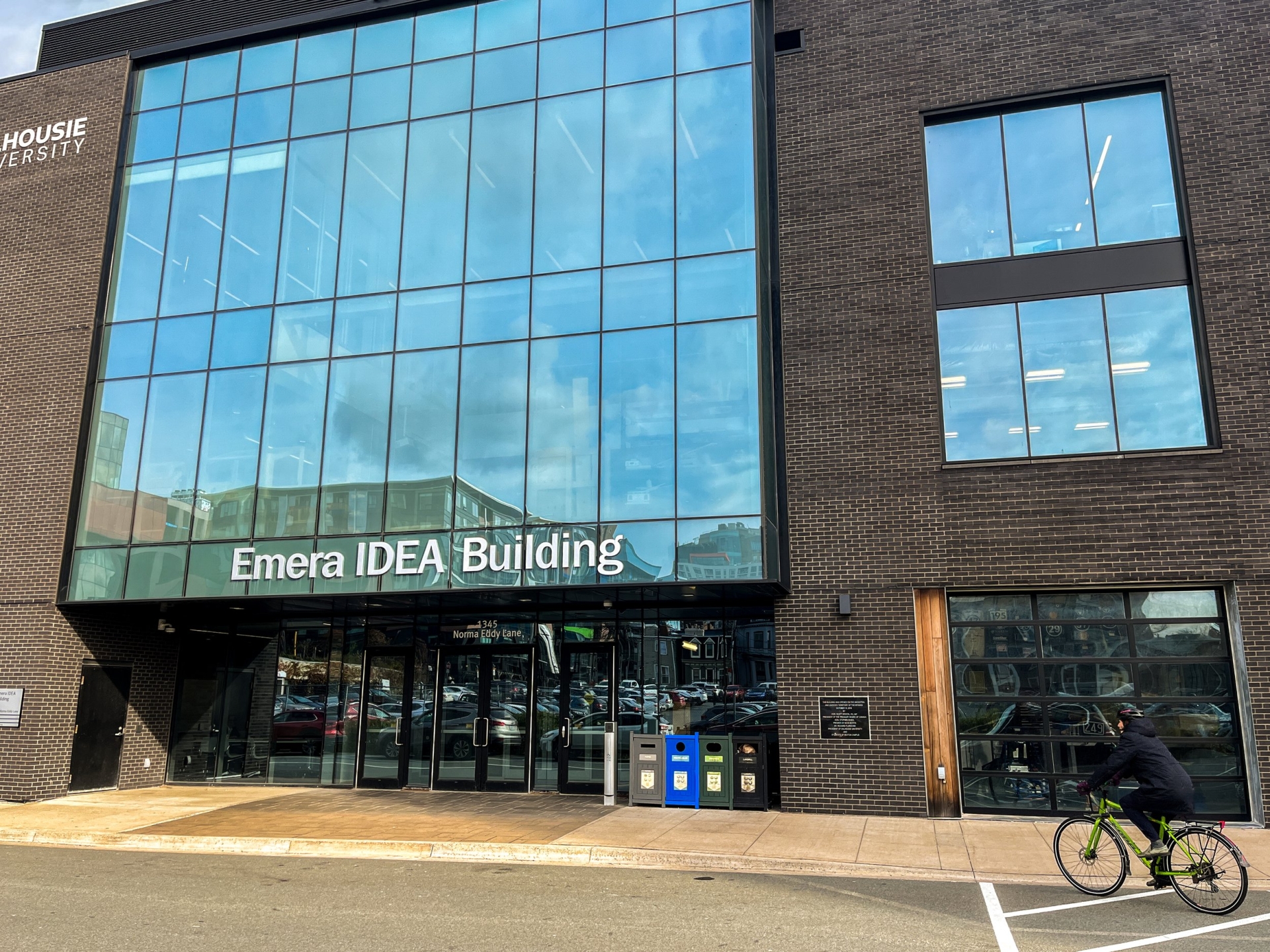
Dalhousie University LEEDS by example | December 19, 2023
By Jon Tattrie, Climate Story Network
With two LEED Platinum certified buildings, Dalhousie University hopes to teach a new environmental lesson about saving energy.
Dalhousie's second LEED Platinum Building | December 19, 2023
Dalhousie University is celebrating the certification of its second LEED Platinum building as a key step toward sustainability, and experts say developers can learn from the school to save both money and energy.
Rochelle Owens, director of Dalhousie’s Office of Sustainability, led the way through a tour of its Emera IDEA Building near Spring Garden Road – from the water-saving tanks in the basement to the solar panels on the roof.
“This was a former parking lot. There were a couple of trees in the back. Those trees were cut down and made into cabinetry, including this green building sign,” she says, indicating the large wood panel at the entrance that explains what makes the building special.
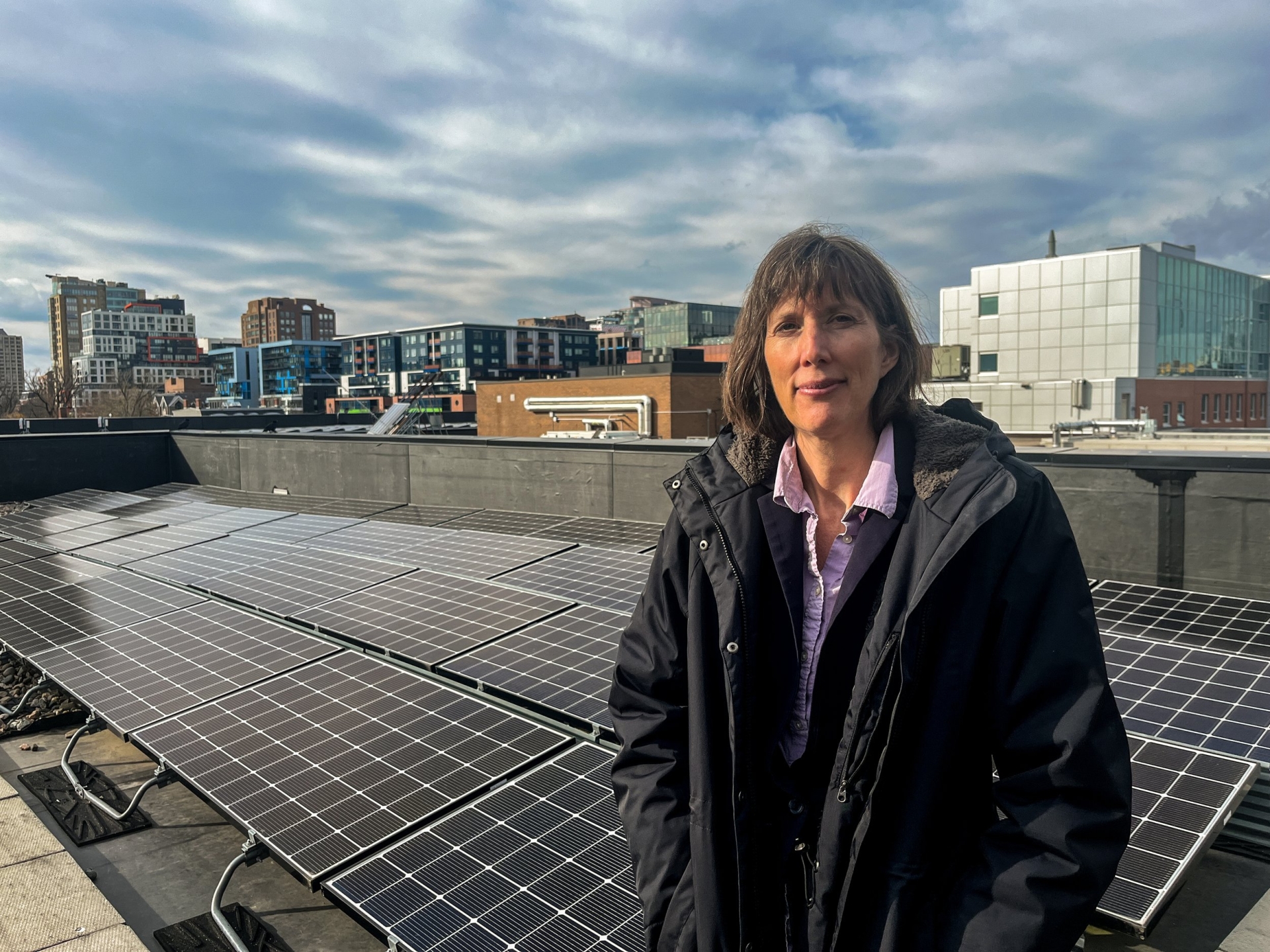 Owens says the building actually opened in 2018, was finished in 2020, and now three years later has been certified as LEED Platinum, a globally recognized standard. LEED stands for Leadership in Energy and Environmental Design and functions as an international 100-point rating system to express how efficiently a building is designed and operated. Platinum is the highest category, scoring 80 and over. Dalhousie’s Richard Murray Design building also reached platinum.
Owens says the building actually opened in 2018, was finished in 2020, and now three years later has been certified as LEED Platinum, a globally recognized standard. LEED stands for Leadership in Energy and Environmental Design and functions as an international 100-point rating system to express how efficiently a building is designed and operated. Platinum is the highest category, scoring 80 and over. Dalhousie’s Richard Murray Design building also reached platinum.
There are only four LEED Platinum buildings at universities across all of Canada – and Dalhousie has two of them.
The newly certified building was also the venue for the recent launch of the Building to Zero Exchange, an initiative bringing stakeholders together to build the capacity needed to grow the number of greener buildings in Nova Scotia. [See CSN’s story Building up the green builders.]
Owens says the most beneficial step was the building envelope, with tighter walls and windows cutting energy use by about 10 per cent. The smarter lighting and HVAC systems use only the energy needed, rather than keeping every room ready all the time.
“It just has more brains to control the systems,” she says.
She points to a soccer field, where a few years ago they drilled 60 boreholes 500-feet deep. “Ironically, it’s the same type of drilling you’d do for oil and gas,” she says.
Once the boreholes were dug, workers then installed pipes that carry cold water down deep, to where the soil is always 10 C, then brings that heat back up to warm the building. The geothermal wells reverse the process in summer to cool the building.
She heads to the roof next but doesn’t start with the solar panels. Instead, she points to a small spout that catches rainwater and collects it to flush the toilets.
The solar installation is Halifax’s second biggest, after IKEA, and creates about 25 per cent of the electricity used by the IDEA building.
She notes that not every building has a roof big enough, and accessible enough, to install solar panels, but it can further reduce the need to burn fuel for the buildings that can do it.
Chris Benjamin, the senior energy coordinator at the Ecology Action Centre, agrees that LEED status has limitations.
“LEEDs buildings are great. I will say that they are not for everyone and that’s because they’re very specific – it’s an internationally developed standard,” he says. “It’s not a made-in-Nova Scotia solution. And more importantly, they only work at a certain scale.”
LEED tends to focus on newbuilds, rather than developing existing properties.
“Compare it to the Ecology Action Centre. No way we’re ever going to get a LEED-certified building for the EAC. The scale’s too big, the type of building wouldn’t work,” Benjamin says. The EAC operates out of a 100-year-old “salt-box” house in Halifax’s North End, yet it’s still “one of the most efficient offices in Canada.”
The group focused on donations and salvaging material from the demolished Roy Building, while also repurposing Metro Transit shelters into stylish glass walls. That cut down the environmental and economic cost of new materials.
“I work a lot with churches. We get calls from them saying we pay a $3,000-a-month oil bill and we want to get solar panels. I say, whoa, hold on. Let’s think about your building first,” he says.
Like Owens, the first advice he gives them is to seal up the building’s envelope.
“There’s a lot you can do with properly insulating the attic, the steeple, these odd shapes where lots of heat tends to be lost,” Benjamin says. [See CSN’s story A renovation and a prayer.]
Better doors and windows further cut the bills. He then makes sure they are reversing the ceiling fans so they blow down cool air in the summer and pull up cold air in the winter. Only then does he suggest they look at installing solar panels.
Benjamin says with Canada needing millions of new housing units, developers are soundly motivated to learn from Dalhousie, retrofits like those done at the EAC, and even old churches.
“I do think developers are definitely thinking about energy because they realize there is a huge savings over the life cycle of the building,” he says.
Owens says that’s one of the many benefits of building with climate change in mind.
Dalhousie plans to further develop the backup battery system so that one day the Emera IDEA Building could provide its own power during peak hours to reduce the overall load on the system.
“Battery technology is rapidly increasing in its ability to provide services with a smaller footprint,” she says. “Kind of like the old computer of yesteryear versus today’s mobile phones.”
This story appears courtesy of the Climate Story Network, an initiative of Climate Focus, a non-profit organization dedicated to covering stories about community climate solutions.
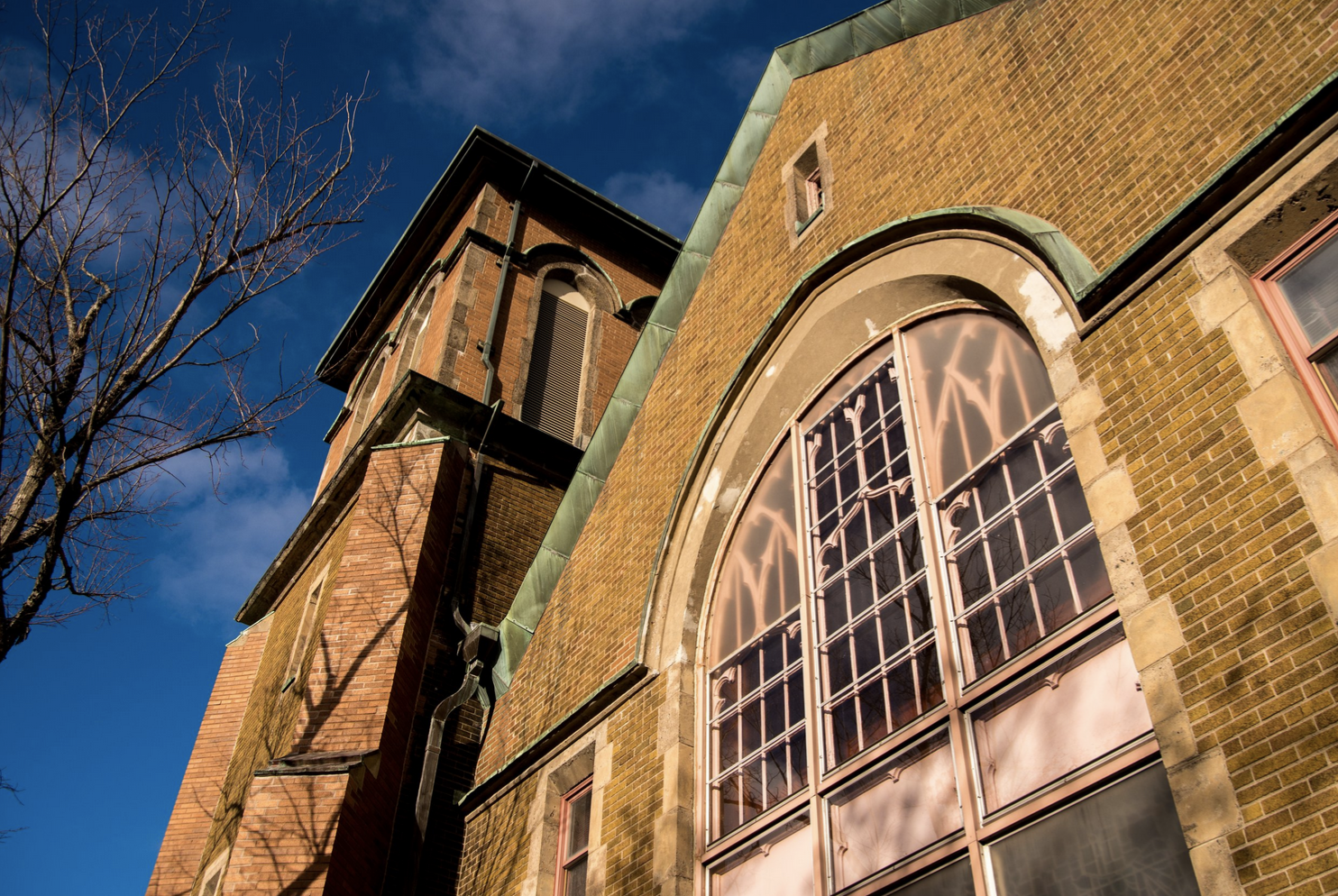
A Renovation and a Prayer | November 20, 2023
By Zack Metcalfe, Climate Story Network
United Churches in HRM are on a carbon-cutting mission thanks to Faithful Footprints, a funding stream that helps churches cut their GHG emissions through retrofits.
Faithful Footprints | November 20, 2023
For the first time in over a century, the chimneys of Grace United Church in downtown Dartmouth are cold and smokeless, yet its 18,000 square feet remain as warm and welcoming as the day it was built, in 1920.
It began with a routine inspection of the building’s three furnaces in the fall of 2017, which revealed a fatal crack in the newest unit. Grace United’s board of volunteers bit the bullet and bought a new one – winter was coming, after all – but the expense sparked a conversation which never quite went away about finances, sustainability, and especially values.
“We decided this wasn’t the way we wanted to go in the long term,” said Board chair Robert Picco.
“A lot of our congregation was interested in becoming a more carbon neutral operation, so, as a board, we asked how we could lower both our carbon footprint and operational costs.”
They considered renovating – everything from new lighting fixtures to a rooftop solar array – but their three furnaces, and $12,000 annual oil bill, remained to-of-mind. After some soul searching, and a thorough energy audit, they decided the furnaces were out, and heat pumps were in.
“At first we were a bit wary,” said Picco, “because we weren’t sure heat pumps would work in a building this old, but we went through the process, evaluated different alternatives, and at the end it looked like heat pumps would work.”
The renovation began in November 2022. Three furnaces and two oil tanks were removed, four Fujitsu heat pumps were incorporated with existing ductwork, and the church’s electrical capacity underwent a sorely needed upgrade. The tubing, connecting interior heat pumps to their rooftop fans, was fed through Grace United’s now retired chimneys.
The new setup performs well, said Picco. Financial savings and reduced carbon numbers haven’t yet been calculated, but he expects the final tally will be significant. The church remained warm through winter and the reduced humidity – courtesy of the heat pumps – turned out to be a godsend.
“Our music director said the church organ sounds a lot better in the dry air,” said Picco. “It’s a benefit we weren’t expecting.”
This renovation was no anomaly. United Churches across Canada have been cutting carbon with thoughtful renovations since 2018, reducing annual emissions by 824 metric tonnes of CO2 overall, equivalent to removing 252 cars from the road every single year, or leaving 351,029 litres of gasoline unburned. In HRM alone, Bethany United Church and the Brunswick Street Mission each cut emissions by a quarter, the former with new windows, insulation, lighting, and a smart thermometer, the latter with heat pumps.
Rockingham United, serving the Bedford Basin area since the 1960s, is an A-framed church whose broad roof was ideal for solar. They installed a 225-panel array in 2020, selling their $20,000 of annual electricity to the grid, while only buying $9,000 back. To date, their array has displaced 114 tonnes of CO2 emissions equivalent to a 457,000-kilometre road trip.
All these renovations were made possible by Faithful Footprints, a funding stream created by the United Church of Canada and administered by the third-party organization Faith and the Common Good.
Through it, each United Church congregation can apply for up to $30,000 toward carbon cutting infrastructural upgrades, whether it be a church, office space, or health centre.
“We’re not going to build our way out of the climate crisis,” said Stephen Collette, building scientist with Faith and the Common Good. “We’re going to renovate our way out.”
This is because of “embodied carbon” – the carbon emitted during a building’s construction, which includes emissions from the mining of stone, cutting of wood, making of bricks, plaster and insulation, and simple transportation of people and materials to and from construction sites.
“It’s all the carbon required to get you to day one of ownership,” said Collette. “And in many cases, embodied carbon exceeds operational carbon (heat and electricity) for the lifetime of the building.”
This means that maintaining the efficiency and vitality of existing infrastructure will almost always be more carbon efficient than knocking down old buildings for the sake of new ones. Even if new buildings are enormously efficient, said Collette, their construction will require another heavy investment of embodied carbon, often taking decades to pay off. Climatically, renovations almost always make more sense than new construction.
This is especially true of churches, said Collette, not just because of their exceptional longevity, but because there are so many of them. Faith communities are the second largest property holders in Canada, surpassed only by the federal government. Renovating their 27,000 buildings, to keep them operational and efficient, is an enormous opportunity to reduce Canada’s carbon emissions in the near and long term, whether those buildings remain churches, or find new life as community centres or apartment buildings.
“We need to think about how to make it easier for these renovations to happen,” said Collette.
Faithful Footprints does exactly that. Through it, the United Church of Canada has awarded several million dollars across 209 grants, with hundreds more working through the application process. For the time being, Faithful Footprints has no end date.
The Climate Story Network is an initiative of Climate Focus, a non-profit organization dedicated to covering stories about community climate solutions.
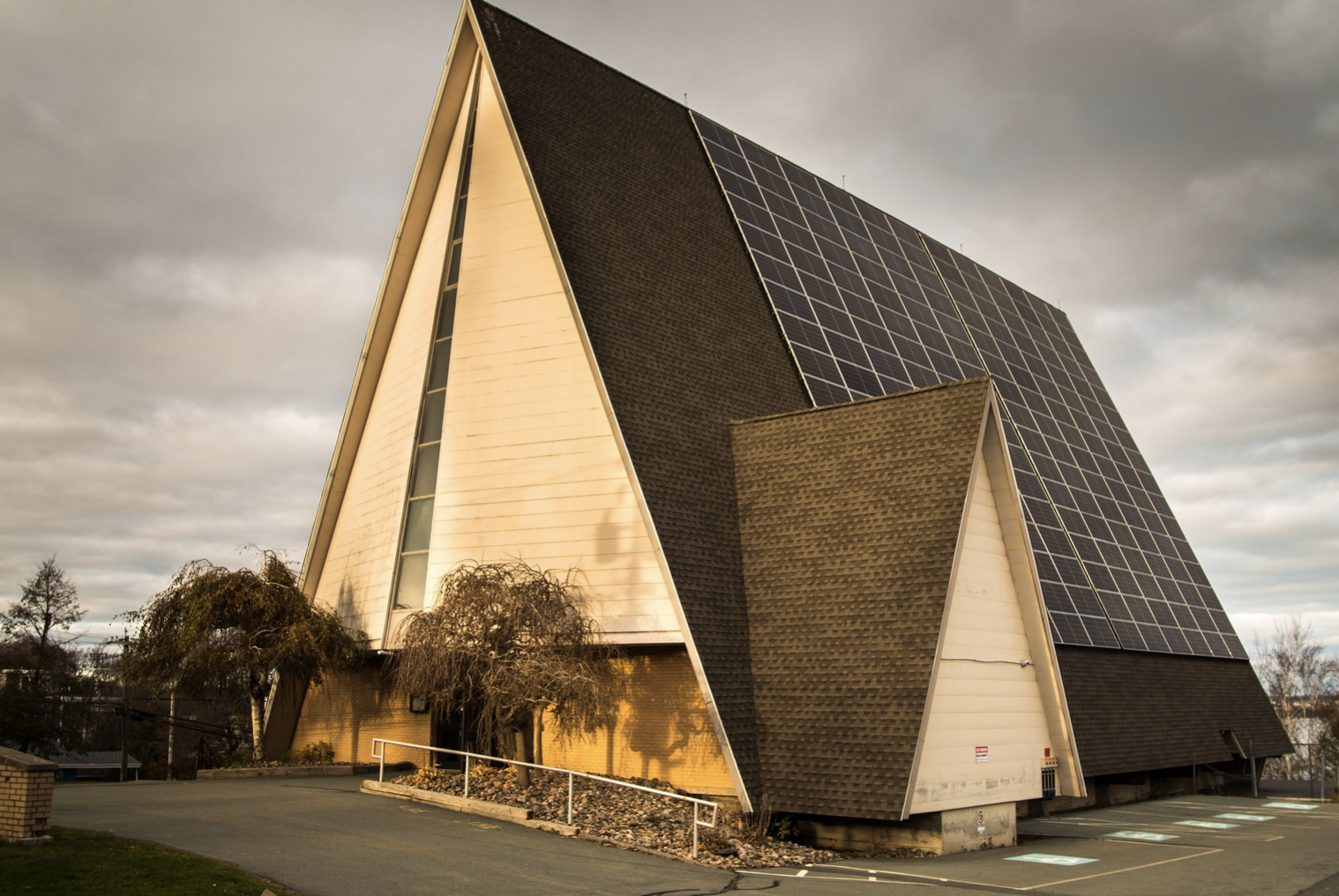
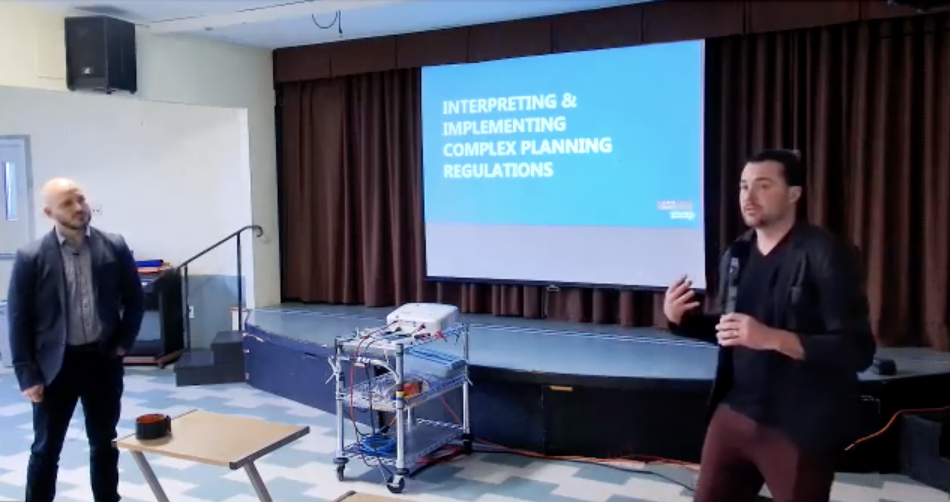
SCANS Seminar: Building Codes and Energy Efficiency | November 13, 2023
By Astrid Zhang
The Seniors College Association of Nova Scotia (SCANS) continued their weekly energy efficiency series for active citizens on October 24th. Led by energy professionals from EAC and Zzap Architecture & Planning, this session introduced the relationship between energy efficiency and building codes, giving attendees a better understanding of how the built environment contributes to the energy efficiency landscape.
WATCH: Energy and the Built Environment | November 13, 2023
During the latest SCANS session on energy efficiency, Chris Benjamin, Energy Coordinator for the Ecology Action Centre, talked about recent changes to Nova Scotia building codes and why they matter when it comes to securing long-term energy efficiency. He also covered the meaning of Net-Zero Energy Ready construction and how this new building standard could influence individual homeowners.
In addition, guest presenters Adam Read and Connor Wallace from Zzap Architecture and Planning delved into HRM’s planning policies and discussed the regulations and challenges when designing energy-efficient buildings.
For those who are interested in learning more, a recording is available on the official SCANS YouTube channel. Watch the video below.
Astrid Zhang is a Volunteer with Ecology Action Centre’s Energy & Climate team.
Interfaith Roundtable Discussion on Climate Change | November 8, 2023
By Molly Foster
On September 27th, the Ecology Action Centre collaborated with Faith & the Common Good and the Tatamagouche Centre to host an Interfaith Roundtable Discussion on Climate Change. The event brought individuals of various faiths and spiritualities together to discuss climate action.
Connecting Faith and Land | November 8, 2023
The Interfaith Roundtable Discussion on Climate Change aimed to create an inclusive platform for individuals of diverse faith backgrounds to engage in meaningful discussions about climate action, build connections, and inspire collective efforts to address the pressing issue of climate change.
The event began with a prayer from Elder Albert Marshall, reminding attendees of the deep connection between land and faith. He emphasized the power of faith in driving positive change and motivating people to care for the Earth. Attendees later participated in a guided tour of the land around the Tatamagouche Centre, encouraging participants to connect with the beauty of the natural world and reflect on the importance of preserving it.
The theme of interconnectedness continued throughout the day, as participants discussed how their respective communities were already working to combat climate change, and shared stories of how their beliefs inspired them to become environmental stewards. Through a combination of small group sessions and larger roundtable discussions, the event allowed for open and honest conversations about the challenges that each community faced, and offered space to contemplate solutions together.
Recognizing that their collective efforts could lead to a more significant impact, the event concluded with the formation of a network of faith leaders. This Interfaith Coalition for Climate Change is actively seeking the participation of more faith leaders who share their commitment to protecting the environment. For more information on how to join, please email molly.foster@ecologyaction.ca.
The Interfaith Roundtable Discussion on climate change was a remarkable event that showcased the unifying power of faith and spirituality in the face of environmental challenges. By bringing together people of different faiths, this gathering set the stage for a cooperative and compassionate approach to fighting climate change. As the Interfaith Coalition for Climate Change grows and takes shape, it offers a glimpse of a future where faith communities join forces to support climate action initiatives.
Molly Foster is a Building Efficiency Intern with Ecology Action Centre's Energy & Climate team.
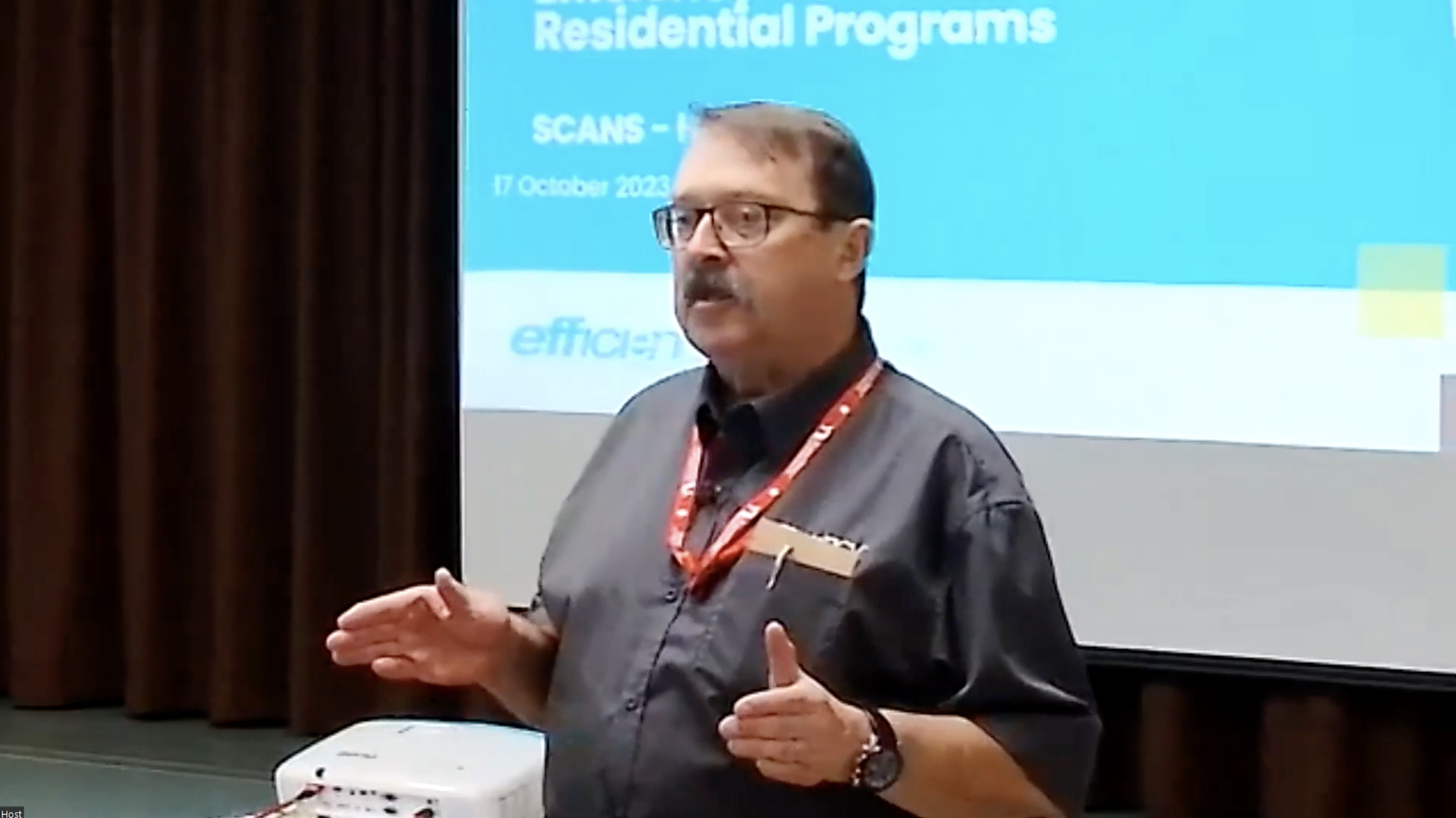
SCANS Seminar Showcases Efficiency NS Programs and Rebates | October 24, 2023
By Molly Foster
In continuation with their energy efficiency teaching series, the Seniors College Association of Nova Scotia (SCANS) invited guest speaker, Barry Walker, to discuss potential programs and rebates for homeowners and businesses in Nova Scotia.
WATCH: Sparking Sustainability and Savings | October 24, 2023
On October 27th, the Seniors College Association of Nova Scotia hosted the second seminar in their weekly course on Energy Efficiency for Active Citizens. Led by expert speakers, these classes introduce energy efficiency as a key element of climate action and offer insight on the clean energy transition.
In last week's seminar, guest speaker, Barry Walker, talked about where Nova Scotian energy comes from and how our energy landscape is changing. He also highlighted various Efficiency NS programs and rebates available to home and business owners. This information not only benefits seniors, but also contributes to the broader goal of forging a more sustainable and energy-efficient Nova Scotia.
Growing up near Shelburne, Nova Scotia, Barry began his education at Acadia University in the Faculty of Science and Engineering, graduating in 1977, subsequently attending the Nova Scotia Land Survey Institute and graduating in 1979. Barry's energy career began in 1980 at the Nova Scotia Power Commission, where he worked as an Energy Advisor. In 1982, he joined Efficiency Nova Scotia as a Public Outreach and Education Coordinator, working his way to his current position as Manager of Business Development for the Residential Sector. Barry also served with the Canadian Armed Forces from 1982 until his retirement in 2015.
For those keen on learning about potential energy savings, a recording of Barry's talk is available on the official SCANS YouTube channel. Watch the video below.
Molly Foster is a Building Efficiency Intern with Ecology Action Centre's Energy & Climate team.
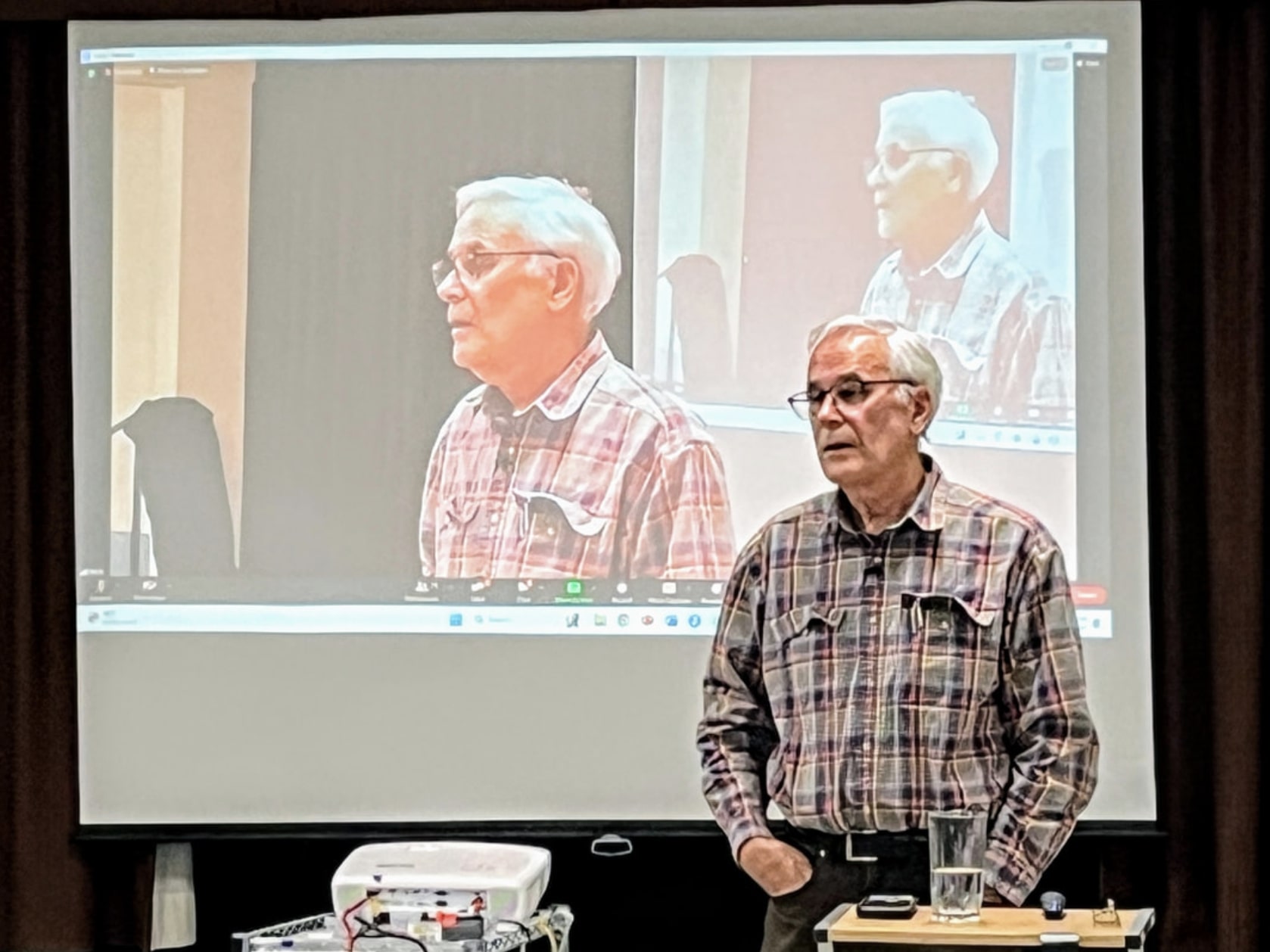
The Power of Seniors: SCANS Leads Seminar on Energy Efficiency | October 18, 2023
By Molly Foster
Last week, the Seniors College Association of Nova Scotia (SCANS) hosted its first seminar on energy efficiency, led by energy professionals Chris Benjamin and Brian Gifford. The seminar's goal was to equip seniors with the tools they need to make informed choices about their energy use.
WATCH: Seniors Embrace Sustainable Energy | October 18, 2023
On October 10th, the Ecology Action Centre and SCANS partnered to develop an energy efficiency workshop for seniors. The event attracted an impressive turnout, with 110 attendees participating both in-person and online.
Presenters covered various topics, from understanding the energy landscape to navigating potential savings and rebates, and shedding light on the challenges builders face when striving for better energy efficiency.
For those who missed the seminar or wish to revisit the insightful discussions, a recording is available on the official SCANS YouTube channel. Watch the video below.
SCANS is a community-driven organization dedicated to providing educational opportunities for seniors. They believe in lifelong learning, personal growth, and community engagement. This event was funded with the help of Efficiency Nova Scotia, an organization committed to helping Nova Scotians save energy, money, and the environment.
As we navigate an ever-changing energy landscape, events like this are crucial in paving the way for a more sustainable future. We applaud SCANS for their commitment to seniors' education and thank Efficiency Nova Scotia for their support in making the event possible.
Molly Foster is a Building Efficiency Intern with Ecology Action Centre's Energy & Climate team.

Electric Avenue 2023: Powering Up for an Electric Future | September 13, 2023
By Nikita Popli
On September 9th, Next Ride and its partners hosted an electric vehicle (EV) test drive event, held at the Canada Games Centre in Halifax.
Powering Up for an Electric Future | September 13, 2023
Industry experts were on hand to demystify Electric Vehicle (EV) technology and answer questions from members of the public. This proved to be an informative experience for all attendees. 
For those who've been contemplating switching to an electric vehicle, Electric Avenue offered the perfect opportunity to learn more. Diverse EVs, including the Hyundai Ioniq 5, Mazda MX-30, Tesla and even e-bikes, were on display and available for free test drives. Attendees had the chance to experience the quiet power and eco-friendliness of electric transportation firsthand.
Nearly 250 people participated in more than 200 test drives, including current EV owners, prospective buyers, and skeptics, all discovering the allure of electric mobility. I was there too, talking about EAC's electric school bus initiative. I spoke with parents and the public, rallying support for this crucial initiative to replace old diesel, gasoline and propane-fueled school buses with electric, highlighting the importance of sustainable transportation not only for today but for future generations.
Electric Avenue 2023 left attendees charged with enthusiasm for electric vehicles, showcasing the potential for a sustainable driving future in Atlantic Canada.
Nikita Popli is a Community Engagement Officer with Ecology Action Centre's Energy & Climate team.
Empowering Newcomers for a Green Transition: Astrid Zhang on Her Experience as an Energy Efficiency Intern | August 9, 2023
By Astrid (Xinyi) Zhang
With an estimated 15,000 new jobs per year emerging from Nova Scotia’s decarbonization, international students and other newcomers will play essential roles as part of the green workforce for a new economy. That is why employers and governments need to ensure newcomers have a positive experience in the environmental sector and receive the supports they need to contribute to this collective mission.
Newcomers must navigate many challenges | August 9, 2023
The Ecology Action Centre and Nova Scotia Community College International partnered to hold four Green Jobs for All program sessions in 2022 and 2023. These gatherings of employers and job seekers from around the worl provided valuable information and supports.
 As an international student myself, my primary aspiration at these events was to connect with individuals who were also navigating the green sector. Students engaged in small group discussions, sharing their observations and experiences in job seeking with peers facing similar challenges. These interactions provided insights and brought the community closer together.
As an international student myself, my primary aspiration at these events was to connect with individuals who were also navigating the green sector. Students engaged in small group discussions, sharing their observations and experiences in job seeking with peers facing similar challenges. These interactions provided insights and brought the community closer together.
The gatherings attracted a diverse group. Attendees included business students ready to explore green sector. We learned that green jobs focus on any work contributing to sustainability and equality, making it rich in opportunities across various fields.
Participants told stories of experiencing biased hiring practices they felt prevent newcomers from reaching their full potential in Canada. Structural and systematic changes promoting inclusivity and equal opportunities are needed.
Students found solace in having their barriers acknowledged by influential organizations, and peers validating their struggles. The sense of understanding and acceptance eased the anxiety of participants.
The impact of these workshops was evident in the follow-up survey results, which I compiled as an intern with Ecology Action Centre, via Dalhousie University. Most attendees recognized the essential role networking plays in the green sector.
They also recognized the importance of gaining insights from people already working in the environmental sector. For example, someone noted at Session 2 in February that the green sector is undeniably fast paced. It’s easy to feel overwhelmed. However, they emphasized the importance of maintaining a realistic outlook and focusing on achievable goals. A positive mentality goes a long way. This is sound advice for those approaching environmental work in Nova Scotia for the first time.
Another takeaway from the discussions is the significance of not being intimidated by hiring criteria. Candidates often disqualify themselves before applying for a position, feeling they don’t have a chance. But the reality is that there is rarely a perfect candidate for a job, and the key is to show how your skills will enable you to provide value to the organization in a given role.
As we look towards the future, experiences of event like Green Jobs for All can help shape an inclusive and sustainable workforce in Nova Scotia. By connecting with like-minded individuals and discovering valuable resources and mentorship, we can take meaningful steps toward a greener future.
Astrid Zhang is a recent Environmental Science graduate from Dalhousie University, and an energy efficiency intern at Ecology Action Centre.
Building an inclusive green workforce | July 31, 2023
By Astrid (Xinyi) Zhang
Nova Scotia, as a province with a significant immigrant workforce, needs new principles and policies to guide us through an inclusive transition. This is the conclusion of the Ecology Action Centre’s Green Jobs for All program, launched in 2021 by Noreen Mabiza, a newcomer from Zimbabwe herself, who now works for the Nova Scotia Department of Environment and Climate Change.
Toward a More Inclusive, Accessible, and Sustainable Workforce | July 31, 2023
“[There are] countless challenges for a newcomer, including language skills, understanding policies, projects, and [various people involved with the] green transition” says David Neira, a newcomer and an energy coordinator at Ecology Action Centre.
Nova Scotia, as a province with a significant immigrant workforce, needs new principles and policies to guide us through an inclusive transition. This is the conclusion of the Ecology Action Centre’s Green Jobs for All program, launched in 2021 by Noreen Mabiza, a newcomer from Zimbabwe herself, who now works for the Nova Scotia Department of Environment and Climate Change.
The first Green Jobs event for Nova Scotia Community College international students was held online in February of 2022, and it was followed by three well-attended events at Ivany Campus in 2023. The project identified considerable barriers faced by newcomers, offered support in the form of information, networking opportunities, and guidance.
 The goal of these events was to work toward a more inclusive, accessible, and sustainable workforce where no one is left behind. A key learning has been how essential collaboration is in the green transition, bringing individuals together with diverse insights on the challenges we face.
The goal of these events was to work toward a more inclusive, accessible, and sustainable workforce where no one is left behind. A key learning has been how essential collaboration is in the green transition, bringing individuals together with diverse insights on the challenges we face.
Neira says that the ‘green sector’ is fast paced and can easily overwhelm even the most experienced professionals. “But newcomers can be overcome this by attending events, researching on resources, and inquiring about supports from institutions.”
Environmental employers (including nonprofits, government departments, and private companies) have a crucial part to play in accommodating and supporting newcomers as their need for workers grows. That means proactively equipping job seekers with knowledge about their work, thus cultivating a skilled workforce, and introducing more accessibility to opportunities and training programs.
“Offering good benefits is also essential,” Neira adds. “Green employers must evolve to find the best ways. EAC offers the 4-day work week for example.” Creating a better work-life balance for employees, so they can do the difficult work of changing the world with energy and joy, also creates a more mutually supportive environmental community.
Employers in the green sector also face their own barriers when it comes to integrating newcomers from diverse backgrounds. It’s important for employers to build inclusive hiring practices, recognize skills (acquired locally or outside Canada), and create supportive working environments.
It’s also important to foster co-supports and collaboration among newcomers. Haruka Aoyama, a newcomer and clean energy strategist working for the province, took the initiative to create a LinkedIn group where newcomers in Nova Scotia can connect and share valuable resources and opportunities.
This resource encourages newcomers to seek help from those immigrants who have more experience in navigating barriers and job-hunting challenges. By networking and advocating, newcomers have a more powerful voice for policy changes with provincial and federal governments.
Astrid Zhang is a recent Environmental Science graduate from Dalhousie University, and an energy efficiency intern at Ecology Action Centre.
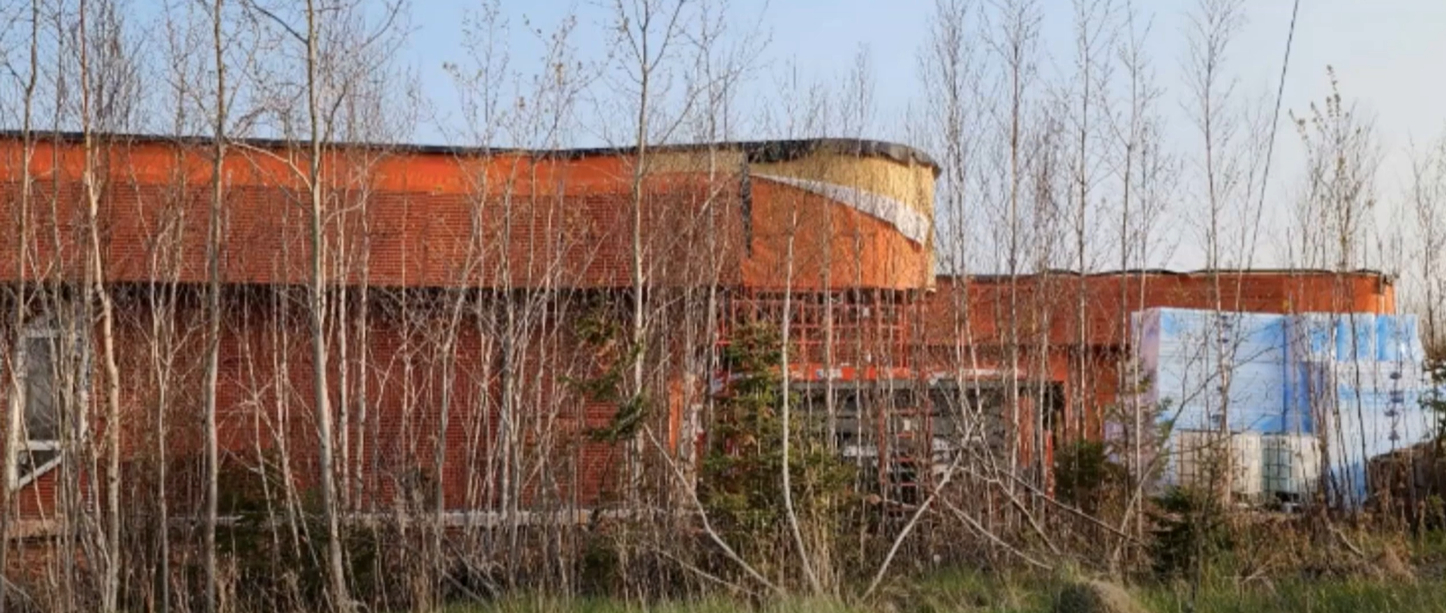
Netukulimk and the new NSNWA Centre | July 13, 2023
On May 30th, Ecology Action Centre hosted the Better Building Speaker Series webinar, which works to spotlight buildings that are more resilient, healthier and better for the environment. The Nova Scotia Native Women’s Association (NSNWA) is working to achieve all of this and more as the construction of the organization’s new centre for Healing nears completion. Check out the webinar recording and learn about what the new NSNWA centre has to offer.
Netukulimk and the new NSNWA Centre | July 13, 2023
The new Mi'kmaq Centre for Healing and Resilience serves as an example of how we can prioritize intersectional sustainability to build safe spaces for our communities. Indigenous consultation, landscape design and green architecture all play a role in making it happen. Zabrina Whitman is the founder of Young Soaring Eagle Consulting and works with Jordan Willet of Solterre Design and Sue Sirrs of Outside! Landscape Architects to provide an overview of the new centre and explain the values that drive the initiative. The concept of Netukulimk is unpacked and presenters showcase how the centre goes beyond sustainability to deliver valuable services to its visitors.
To find out more about upcoming webinars and view past presentations, visit the Better Buildings Speaker Series webpage, and subscribe to the Culture of Efficiency Newsletter to get notified about upcoming events.
The Better Buildings Speaker Series is sponsored by Efficiency Nova Scotia.
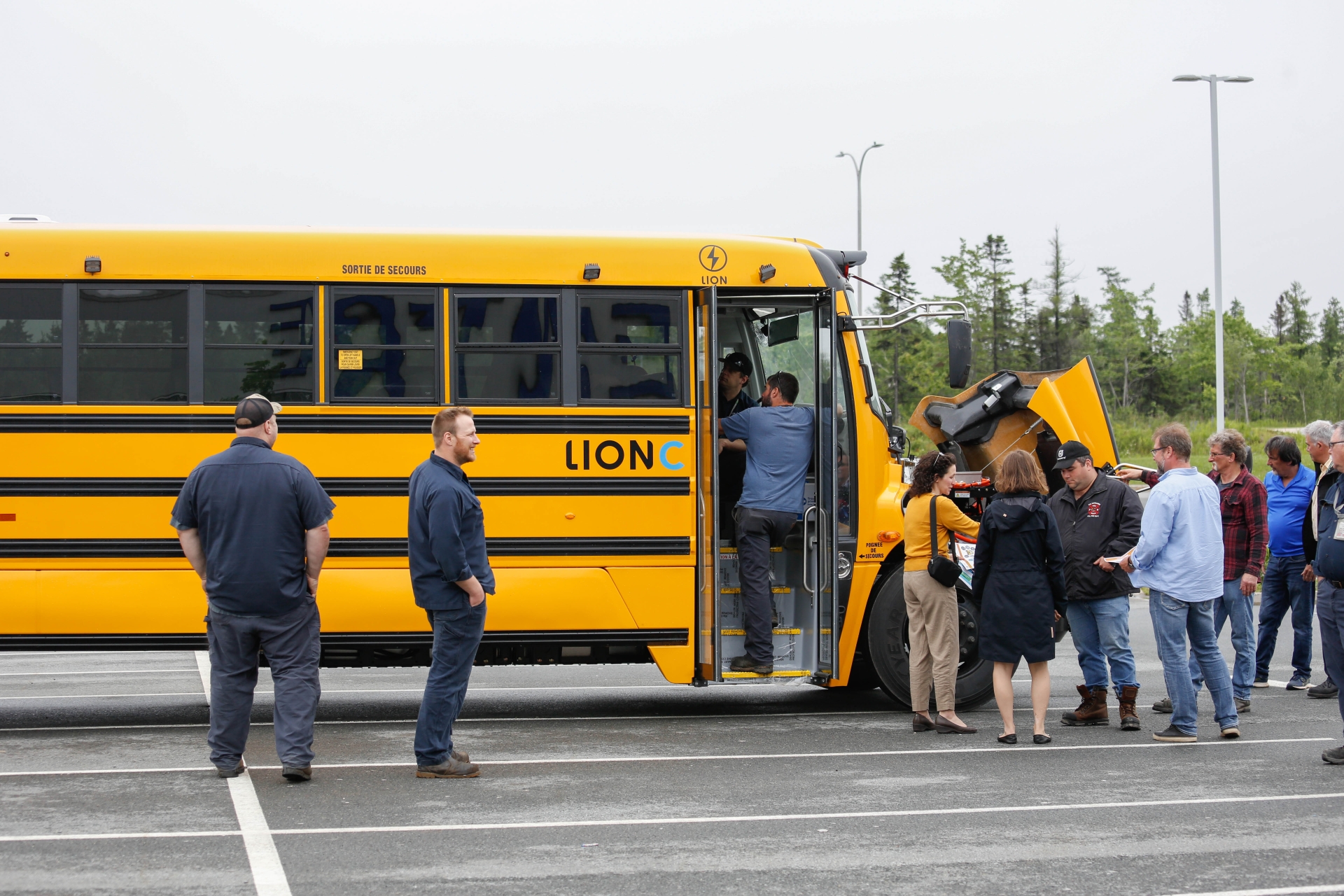
Highlighting the Future of Sustainable Transportation: Electric School Bus Showcase in Halifax | July 5, 2023
By Nikita Popli, Community Engagement Officer
On June 28, the Ecology Action Centre hosted an event highlighting the future of sustainable transportation. With no electric school buses currently operating in Nova Scotia, this showcase aimed to demonstrate the remarkable environmental, health, and economic benefits these buses can offer.
Electric School Buses in Nova Scotia | July 5, 2023
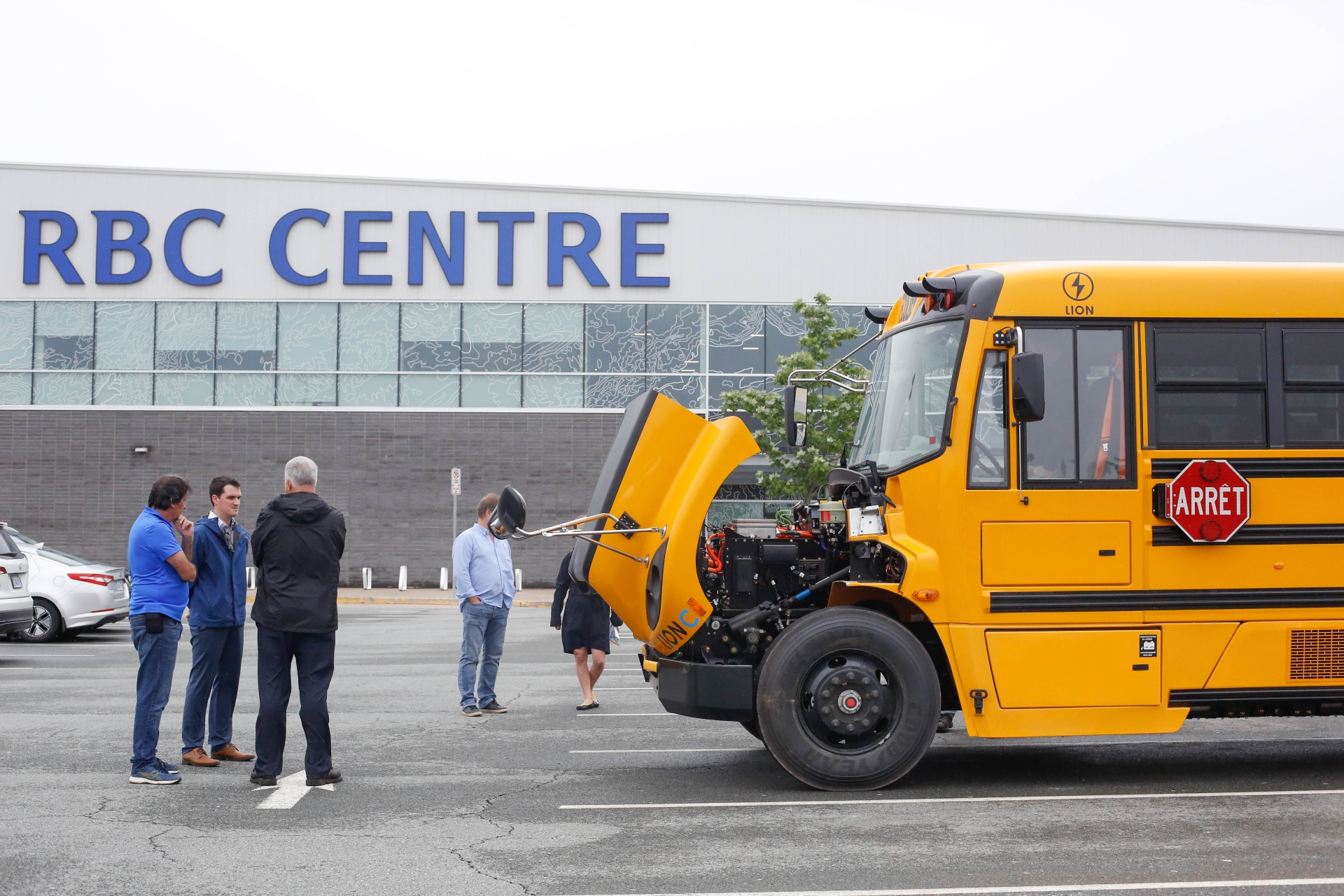
Prominent attendees at our Electric School Bus showcase included provincial and municipal decision makers, transportation managers from various school boards, and eager drivers who got the opportunity to take these eco-friendly buses for a test drive. The unanimous consensus was that the electric school buses were not only quiet, but also remarkably comfortable to ride in.
The star of the show was a Lion Electric Type C Electric School Bus brought all the way from Prince Edward Island, a province which already boasts an impressive fleet of 82 ESBs. Attendees had a chance to inspect the bus's battery and engage in insightful discussions regarding charging, operations, and maintenance. It was heartening to witness the enthusiasm of the drivers, who expressed a strong desire to operate these buses if they were deployed in the province.
This showcase not only shed light on the untapped potential of electric school buses but also provided valuable insights to decision-makers and transportation managers. The event served as a significant stepping stone towards creating a greener and more sustainable future for the students and communities of Nova Scotia.
Stay tuned for more updates on the progress of electrifying school transportation in our region!

Halifax-area Parents Want to Make a More Sustainable Future in the Face of Climate Change | June 22, 2023
By Thomas Arnason McNeil, Climate Policy Coordinator
On Saturday, June 10th, Ecology Action Centre hosted the event Parents Talk Climate in partnership with For Our Kids—a national network of parents connecting across the country to organize collective action on climate change. In the wake of devastating wildfires and the politicization of federal climate policy in Nova Scotia, parents and grandparents gathered at the EAC office in North-end Halifax to discuss their concerns about climate change and how to take action to create a more sustainable future for the next generation.
Talking Climate for Our Kids | June 22, 2023
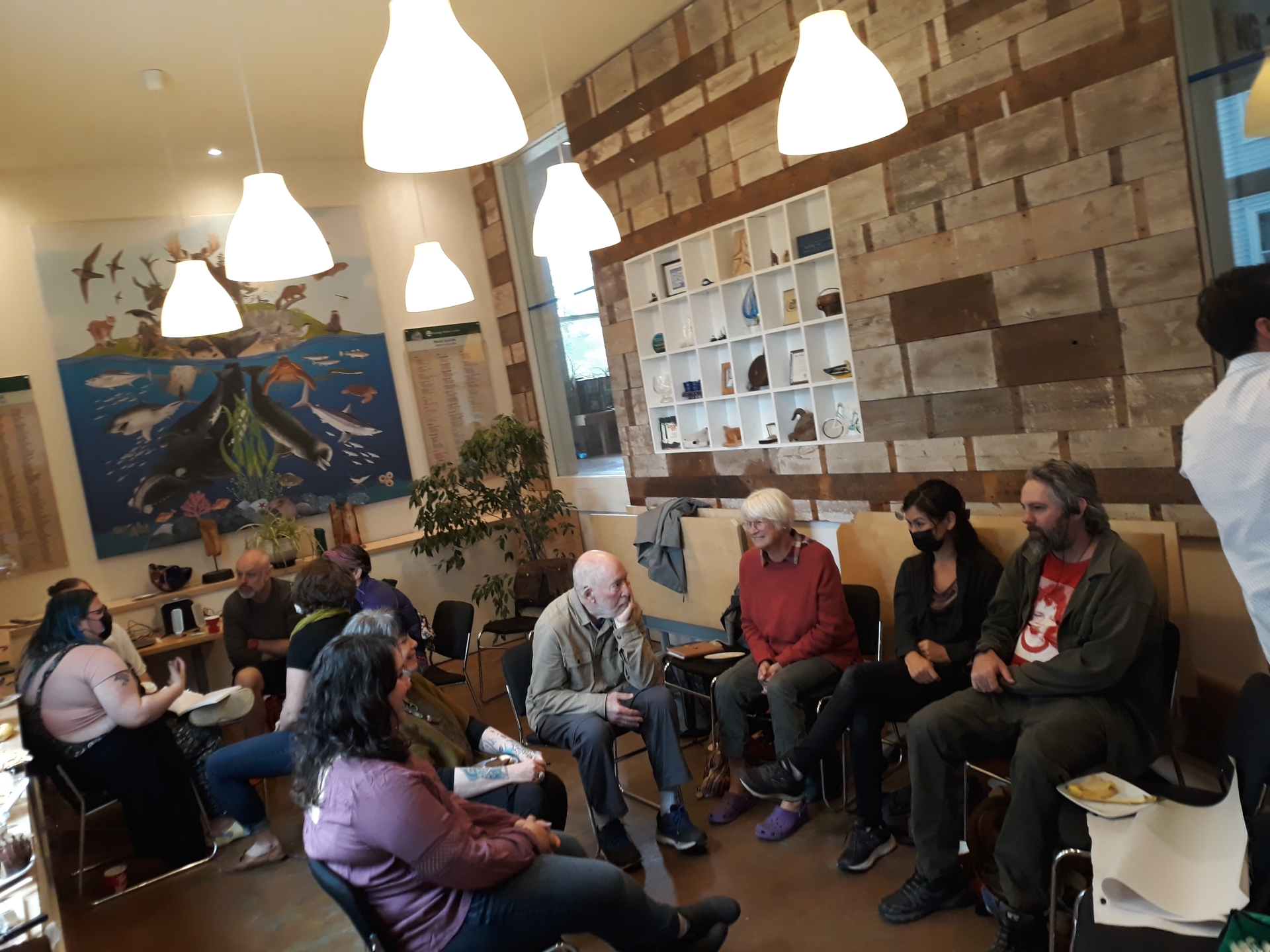 The event provided a forum to unpack climate anxieties, connect and empower parents concerned about a changing climate and discuss where parents could have the biggest impact. Participants had the opportunity to enjoy snack and a free meal, with access to childcare provided by a registered nurse (RN). Local organizer Darius Mirshahi helped to facilitate, drawing out key insights on how to take action in conversation with 16 participants.
The event provided a forum to unpack climate anxieties, connect and empower parents concerned about a changing climate and discuss where parents could have the biggest impact. Participants had the opportunity to enjoy snack and a free meal, with access to childcare provided by a registered nurse (RN). Local organizer Darius Mirshahi helped to facilitate, drawing out key insights on how to take action in conversation with 16 participants.
Regular meetings of this group will continue, with additional support provided by For Our Kids. Those interested in participating in monthly meetings should reach out to Sakura at sakura.saunders@gmail.com
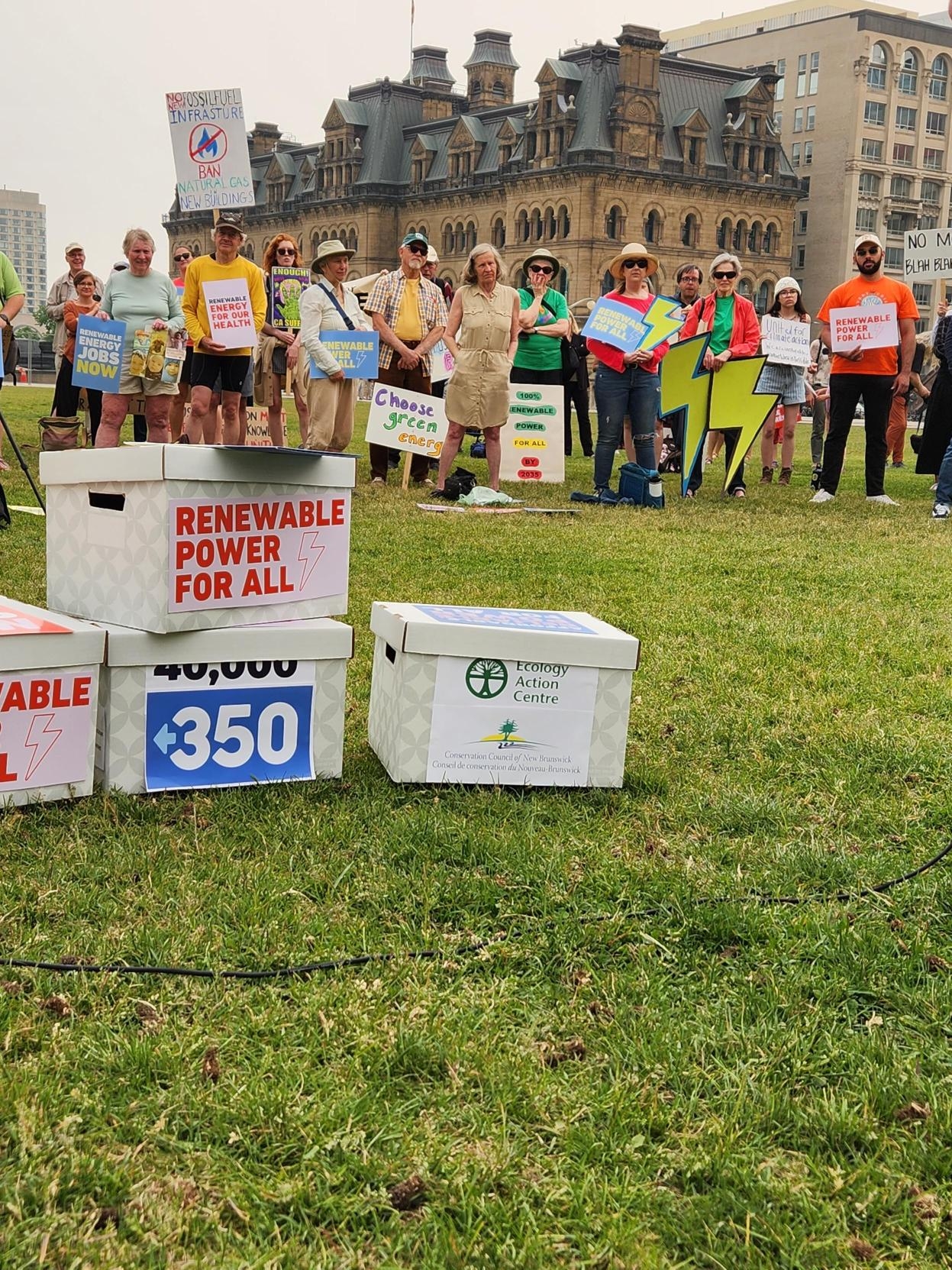
Ecology Action Centre & Friends Visit the Minister of Environment and Climate Change in support of Clean Electricity | June 20, 2023
By Brenna Walsh, Senior Energy Coordinator
On June 5, 2023, I had the pleasure to represent the Ecology Action Centre at a rally held on Parliament Hill in Ottawa to show support for strong Clean Electricity Regulations. The Clean Electricity Regulations are being developed by the federal government to provide a pathway for getting to net zero in the electricity sector by 2035.
Supporting a Strong Clean Electricity Regulation | June 20, 2023
This is something that can be done, and that Canada must do to meet its climate commitments, do its fair share to reduce emissions and remain competitive in a decarbonizing world. Global leaders are calling on all developing countries to make and stick to this commitment.
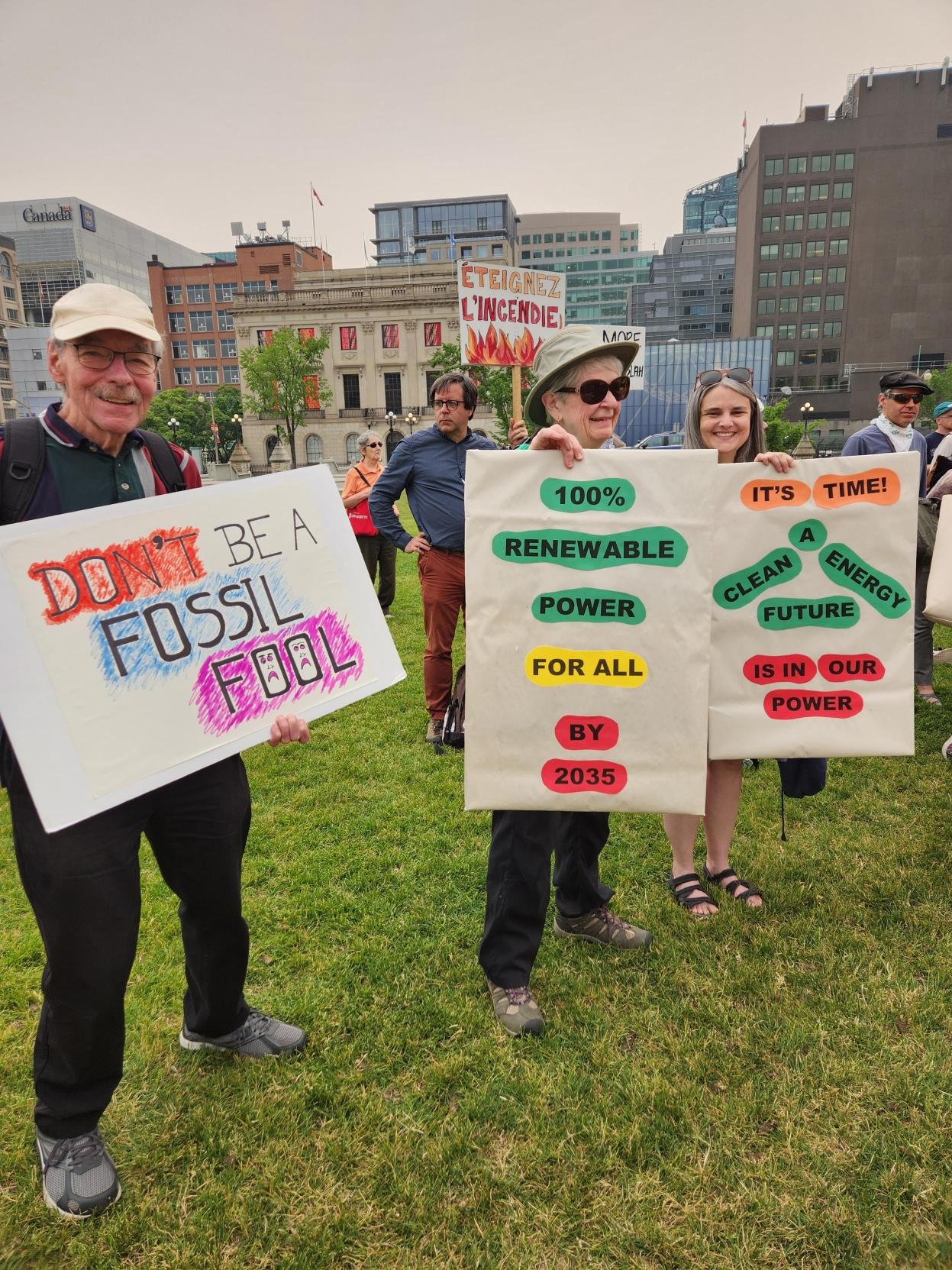 We had a fun rally. There were great chants, posters, and empowering speeches. However, there were also sombre moments, such as the spoken-word poem delivered by Olivia Onuk, an Ottawa-based artist and storyteller.
We had a fun rally. There were great chants, posters, and empowering speeches. However, there were also sombre moments, such as the spoken-word poem delivered by Olivia Onuk, an Ottawa-based artist and storyteller.
The Ecology Action Centre, together with eight other organizations, supported 40,000 Canadians in sending letters to Minister of Environment and Climate Change Steven Guilbeault showing their support for the Clean Electricity Recommendation. Minister Guilbeault addressed the crowd, highlighting the government’s commitment to getting to net-zero in the electricity sector by 2035.
"We committed during last election campaign to have a carbon-neutral grid by 2035 because it is the backbone of fighting climate change in Canada,” he said. "If you want to decarbonize the transportation sector, if you want to decarbonize our buildings, if you want to decarbonize our industry it has to start with electricity!”
Guilbeault was excited to receive the letters from across Canada, including many from Nova Scotians. The Minister came directly from a press conference about wildfires, which were burning across Canada, already the worst wildfire season Canada has ever seen in only the first week of June.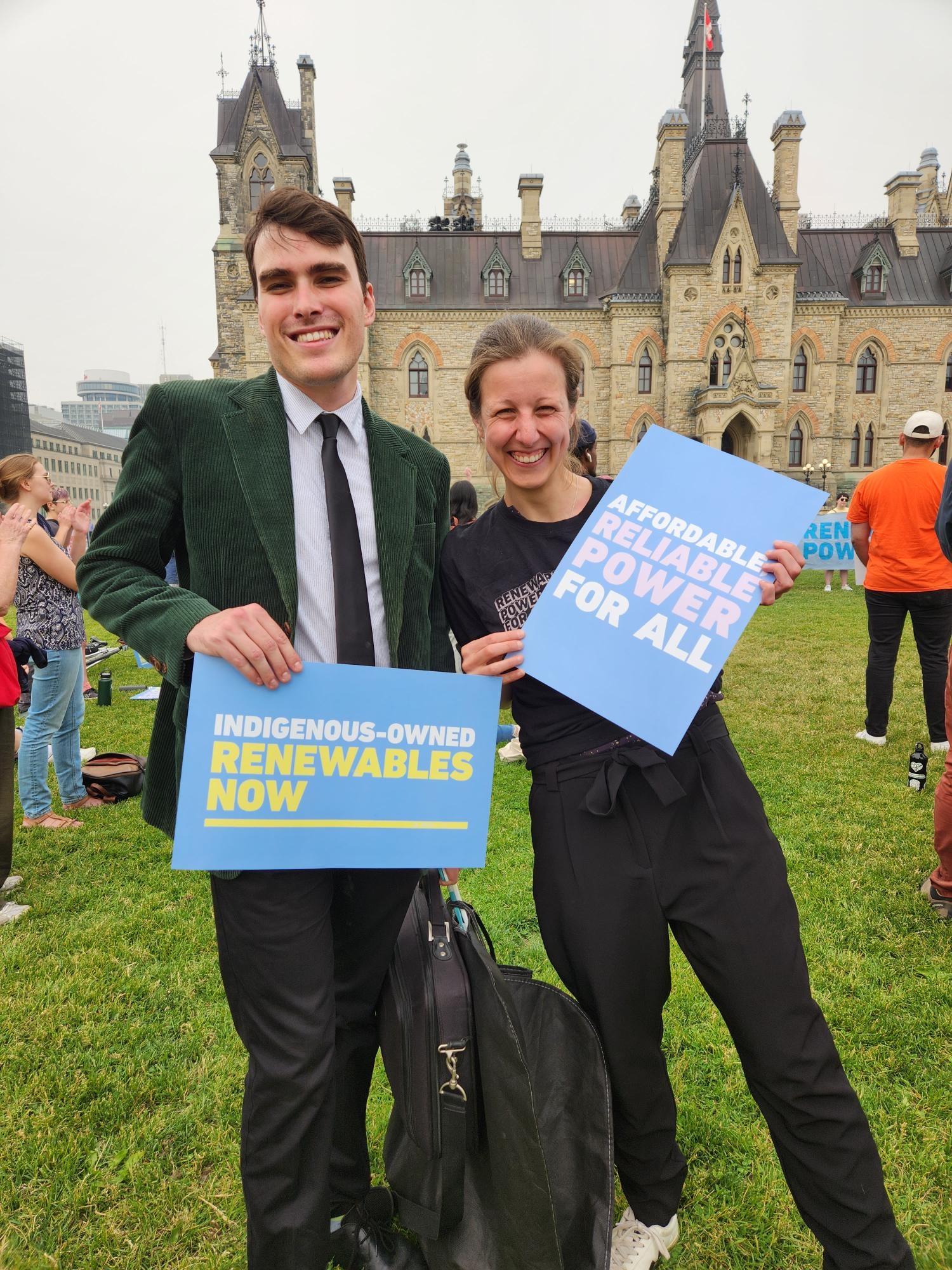
I arrived from Halifax the day before, where the wildfire smoke had finally started to lift. In Ottawa the streetlights came on at noon because the sky was so hazy.
Now is the time to put strong climate policies like the Clean Electricity Regulation in place. There is no time left to waste. This regulation can send a strong and lasting signal to phase out coal and gas on our electricity grids, transitioning to clean, affordable and reliable electricity for all.
The Clean Electricity Regulation will be tabled within months. It is important to let your representatives know you support a strong Clean Electricity Regulation as soon as possible. Keep an eye out for further opportunities throughout this summer to take action!
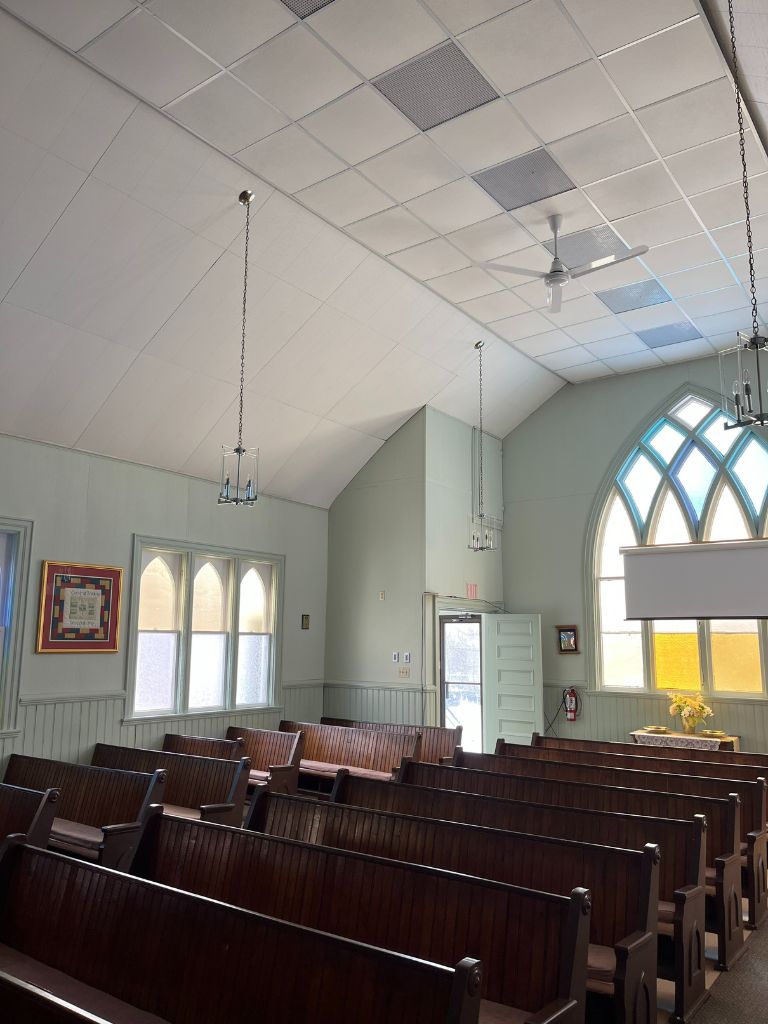
Prince Edward Island Helps Churches and Community Centres Help the Island to Net Zero | June 7, 2023
One might assume a church as old as that might be set in its ways, but MacKay says the tradition here is progressive, meaning as farmers they understand that their own survival — feeding their families — is linked to that of “Mother Earth.”
And in the case of an old church building, that meant decarbonizing. It all made perfect sense and was an easy sell, as it turned out.
How PEI Helps Faith and Community Centres Move to Net Zero | June 7, 2023
Alexander Sandy MacKay is the chair of trustees for Breadelbane Central Trinity United Church, which is located in an agrarian community of 170 souls in central Prince Edward Island. A very small community in Canada’s smallest province, Breadelbane and its United Church have a long history together.
“The church has been there over a hundred years,” MacKay says.
It is not only a place of worship. Central Trinity hosts a number of community groups, including the 4H Club. It is home to a soup kitchen. And it regularly hosts gatherings and other events.
One might assume a church as old as that might be set in its ways, but MacKay says the tradition here is progressive, meaning as farmers they understand that their own survival—feeding their families—is linked to that of “Mother Earth.”
And in the case of an old church building, that meant decarbonizing. It all made perfect sense and was an easy sell, as it turned out.
The work started, as it often does, with a bad oil furnace needing replaced.
"As a person who has converted to solar and electric heat pumps, I was eager to help move our church to becoming carbon neutral," he says. Through word of mouth, via Bedeque United Church twenty minutes west, MacKay learned about the Faithful Footprints program. He filled out some paperwork, talked to staff, and went to his congregation with a proposal and some options.
“Either spend $10,000 and still be on oil; or spend $10,000 and be carbon neutral.”
Easy decision, especially if Faithful Footprints could help, which it could if Central Trinity could find matching funding.
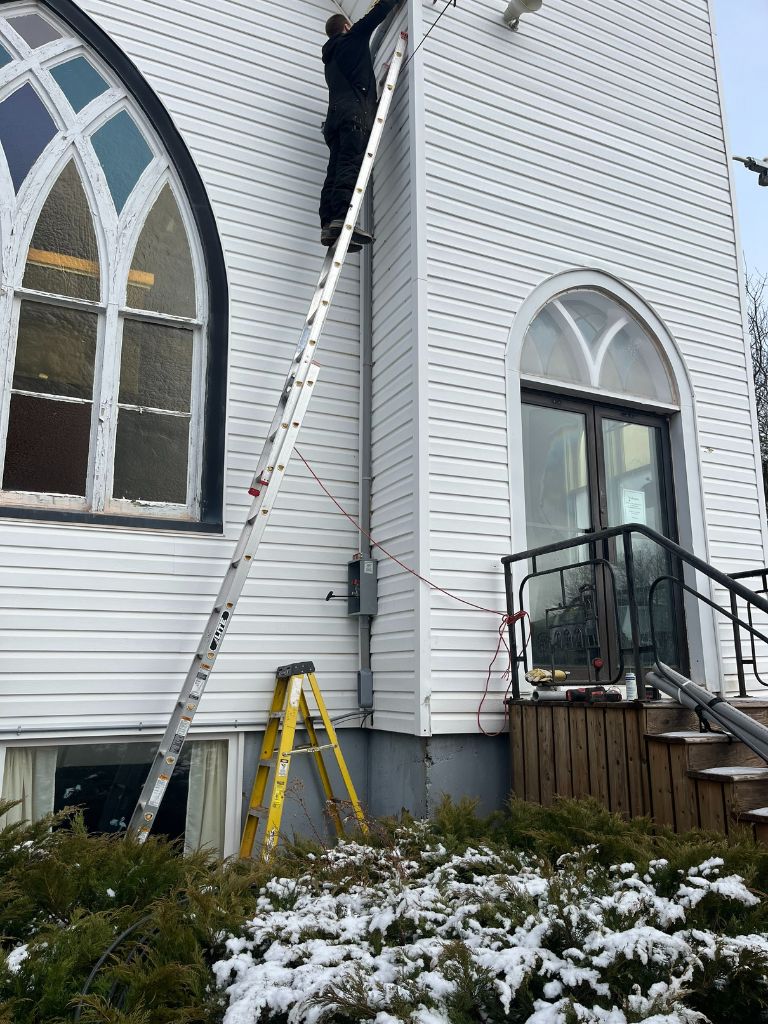
That matching funding was made easy too, thanks to PEI’s new Heat Pump Initiative, via the Department of Environment, Energy and Climate Action and the Department of Fisheries, Tourism, Sport and Culture. It is part of the province’s Net Zero Initiative and provides places of worship that host community events with free heat-pump installation up to a value of $20,000.
“The initiative started with residential buildings,” says Derek Ellis, who is the director of sustainability with PEI’s Environment, Energy and Climate Action Department. “Community centres and communities told us they also needed support, and less than a year later we extended the program to revitalize rural community centres, including faith buildings.”
That extension included a ramping up of sorts, recognizing that larger heat pumps and more financial support are needed for larger spaces.
“Clients can still do structural upgrades outside of that, which leaves room for envelope upgrades. This is part of our rural community revitalization program.” It recognizes that, just like Central Trinity, faith buildings on PEI are hubs of activity for many rural areas—they are heartbeats of community life.
Ellis says his department has tried to keep the process as straightforward as possible. There is an application form requiring basic information. An energy audit is encouraged, but not required. He says this program is a result of “strong political will” to move the province to net zero.
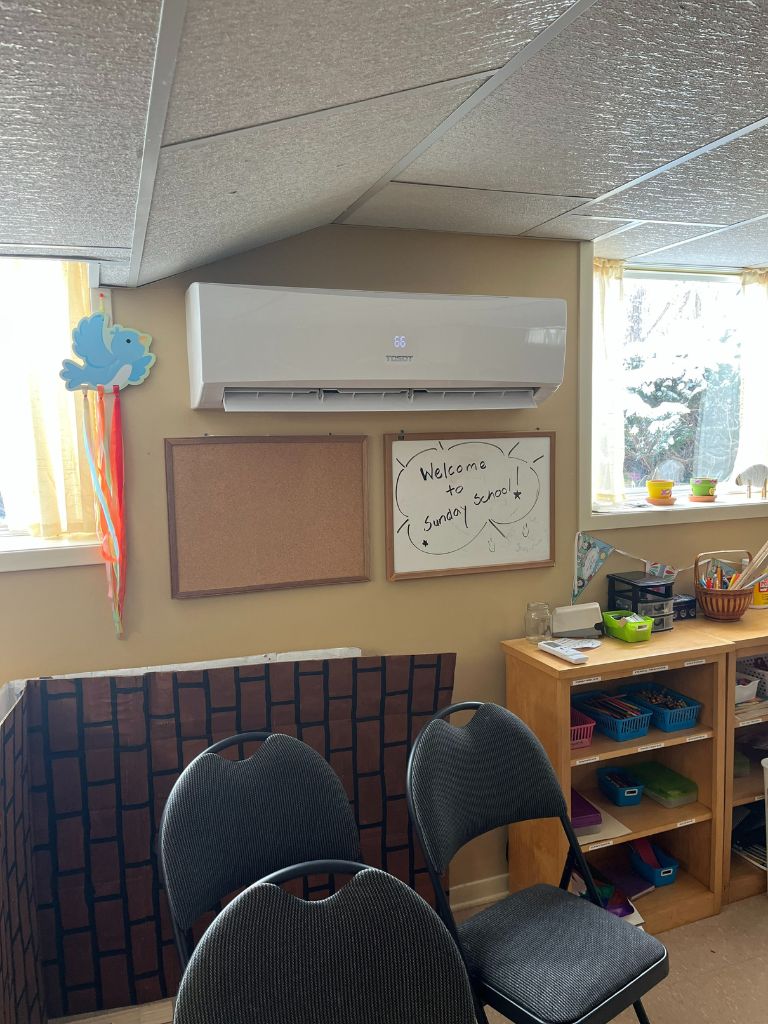
“Our minister, Steven Myers, travelled to Samsø, which is a net- zero island of 1,500 people in Denmark, much smaller than us. After that, I think he had a renewed confidence in our ability to get to that point. And Prince Edward Islanders understand the impact of climate change, we see the impact happening here. We saw it with Hurricane Fiona, for example.”
For program end users like Alexander Sandy MacKay of Central Trinity, that means more focus on creating a good plan for their old church building, with technical assistance from experts. Central Trinity decided to replace old lighting with high-efficiency LED, install a new commercial fan (which makes for more efficient climate control in all seasons), new EnerStar appliances, motion-sensor lights, a new hot water heater, and a new heat pump in the basement.
The total cost of the retrofit project was $60,000. Most of that is be covered by the provincial grant and Faithful Footprints funding.
"The impacts are easy to see," MacKay says. "We no longer have to worry about oil prices."
The heat pumps are connected to wifi. That means he also saves gas driving to and from the church to warm it up for community groups.
But Central Trinity isn’t finished yet. They are soon to sign a contract for solar panel installation, which they hope will eliminate the electrical bill altogether.
MacKay encourages other congregations to follow their Faithful Footprints path. He says that “many people in our congregation have already switched to heat pumps” as a result of the work done. “They see the benefits.”

Elder Albert Marshall Launches Book Introducing Two-Eyed Seeing to Children | May 25, 2023
Elder Albert Marshall from Eskasoni First Nation, who is a leading environmental voice in Unama’ki Cape Breton, has co-written with Louise Zimanyi a new children’s book. It is called Walking Together and presents in poetic sentences and gorgeous illustrations (by Anishnaabe artist Emily Kewageshig) a piece of visual storytelling, showing young readers the notion of Two-Eyed Seeing.
Elder Marshall was the first to apply this concept, from the teachings of Chief Charles Labrador (1932-2002) of Acadia First Nation, in a Western setting. Two-Eyed seeing is the powerful and reconciliatory idea that we can better understand, and care for the world, if we can see with the strengths of Indigenous knowledges and ways of knowing and from Western knowledges and ways of knowing.
In this interview with Chris Benjamin of the Ecology Action Centre (co-published by Atlantic Books Today), Elder Marshall explains why, at 83 years old and after decades of work toward a strong vision for the future, he decided to write a children’s book.
Read Albert Marshall's Interview | May 25, 2023
Chris Benjamin: This book is poetic, beautiful and powerful. Can you tell me a bit about how it came to be?
Elder Albert Marshall: Apparently this is the reason why it was written: How much Aboriginal students have been disconnected from nature. How much we are connected with nature. How much we are dependent on nature. Without that connection, you can’t feel something for it.
Hopefully this book will make that connection at a younger age. We have a lot of land-based training in the curriculum; this will be an introduction. Showing not just appreciation, respect, but protection of nature. Looking at the current state of our environment, in which cleansing capacity has been exhausted. Nature needs humans now for some form of intervention, using science to mitigate the damage.
At that tender age, how young Aboriginal people learn, you’re much more interested in visuals rather than text. The book has limited text. That allows for visual storytelling. Children are great at extracting story from visuals. And Aboriginal people tend to be visual learners.
I hope this will trigger something in them.
Benjamin: Can you talk a bit about Two-Eyed Seeing and this book for children?
Elder Marshall: The reason the phrase Two-Eyed Seeing was coined is that every creature has two eyes. I see everything from an Aboriginal lens. My culture and customs. With that perception, I know I was never meant to be alone. Two-Eyed Seeing enriches perspective. Now I have another perspective. This is a much more whole-istic way—whole as in w-h-o-l-e.
One eye limits what we see. Geographically, wherever we may be, we may become intimately connected with the environment. But it’s a global issue. The more connected we become, the better chance we have.
Benjamin: Ecology Action Centre has been working with Faith and the Common Good, connecting people from different faiths who want to act to protect the environment. People often seem motived by their sense of spiritual love, or even obligation. It seems the ways Indigenous people experience spirituality can be quite different from settlers. Do you have any thoughts on how spirituality relates to Two-Eyed Seeing?
Elder Marshall: As a Mi’kmaq person, before I feel completely well, my physical, cognitive, emotional, and spiritual realms all must be well. The spiritual connection has to be there.
If you are not fulfilling your inherent responsibilities, Great Creator gave us a cognitive mind. If we compromise ecological integrity, we can use the cognitive mind to repair it. We solely depend on Her. Our efforts should benefit all. If she’s not healthy, how can we be?
Netukulimk, in Mi’kmaw. Sustainability. We have the privilege to use gifts of Creator. We don’t have the right to compromise the ecological integrity of the area. We cannot compromise the Earth’s cleansing capacity.
Benjamin: Walking Together emphasizes the importance of stories. I’ve always liked Leslie Marmon Silko’s statement that stories are “all we have to fight off illness and death.” And I feel that’s true. But in this book you’re showing stories aren’t only a defence mechanism, that through them we “receive gifts of Mother Earth.” Can you talk about those gifts? 
Elder Marshall: Bedtime stories Aboriginal children used to hear, in all of those stories, there was never a human form in it. They were always based on other lifeforms. A squirrel or a rabbit or some other creature.
How much we are interconnected. Everything and anything we are involved with comes from the story.
If the story is told enough times, it becomes reality. It should guide us to our responsibilities.
I have to bear in mind, this generation and the next seven must benefit from my efforts. It is time to put our differences aside and start another narrative. Of hope. In which no one is allowed to start a project that damages ecological integrity.
Benjamin: I love the line in the book, “Sing the Lands and Waters awake after a deep rest.” That spirit of renewal seems really important right now as people become worried about the future of humanity on earth. Does Two-Eyed Seeing also offer us a means of having hope in protecting the nonhuman world? (And therefore humans too?)
Elder Marshall: It should become a fundamental principle of how we go through life while here. Actions must be in harmony with nature. Any project not ecologically sustainable, we must come up with an alternative.
Benjamin: A lot of planning right now, by governments, has to do with technological change. And I do think that matters, but what do you think they can learn about “the languages of the Land.”
Elder Marshall: I don’t believe the government is very much interested in preserving the environment for the future. The onus is on the people to tell them from here on in, we cannot continue with business as usual.
Benjamin: I so appreciate the reverence in the book. The words are poetic but it’s a very straightforward, teaching kind of poetic. And the artwork is stunning. Have you given much thought to the role of creativity and art in storytelling, in helping humans better care for the Earth?
Elder Marshall: The more you know about something … somehow it will connect us to this notion of compassion, responsibility, respect, the seeds of knowledge will be planted with as many people as possible, and there is hope.
“Nature has rights, humans have responsibilities.” Always be mindful and cognizant, every action you take must be sustainable.
Benjamin: Wela’lin.
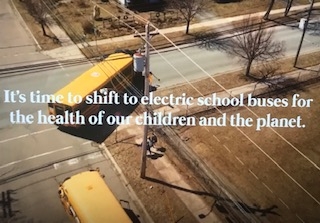
Time for Electric School Buses | May 8, 2023
On April 27th, we celebrated Healthy Environments for Learning Day (HELD) by promoting the transition from diesel-powered to electric school buses across Canada. We're excited to share our latest video showcasing the positive experience of a bus driver and school kids riding an Electric School Bus in New Brunswick! Not only does it provide a sustainable mode of transportation, but it also brings joy and excitement to the kids who ride it.
Jayne Loves Her Electric School Bus | May 08, 2023
We love this video about New Brunswick's first Electric School Bus driver, the pride she and her passengers take in being part of the green energy transition, its clean quietness.
But, unlike New Brunswick and Prince Edward Island, Nova Scotia currently has no electric school buses on the roads! You can help change this by joining our campaign for Electric School Buses in Nova Scotia, to create a cleaner, healthier future for our kids.

How Centennial United in Robert's Arm, NL Reduced Its Carbon Footprint | April 19, 2023
Contributed by Lloyd Colbourne, Chairperson, Board of Management
Windsor United Church is a small congregation in Roberts Arm, in the northern part of Newfoundland NL. They felt the call to modernize their fuel source and stop burning fossil fuels. But the price tag of about $26,000 for the four heat pumps needed for the space was intimidating. Undeterred, they put their talents to work and raised a third of the money, with the Faithful Footprints program supplying the rest. Here, in his own words, Lloyd Colbourne, Chairperson of the Board of Management for Centennial United, tells the story of how his church made a green transition.
Centennial United Decarbonizes | April 18, 2023
In 2022, the board of management of Centennial United Church in Roberts Arm, Newfoundland and Labrador, discussed how we could reduce our carbon footprint and do our part in saving our planet from climate change disasters. The obvious choice was to stop burning fossil fuel as our heat source and switch to clean electric source by using efficient heat pumps.
We then discussed how we could accomplish this process and have a warm comfortable building for our church congregation during weekly services and business meetings which were held in the church hall in the basement of the church. It was decided that heat pumps would be the solution to accomplish our goal.
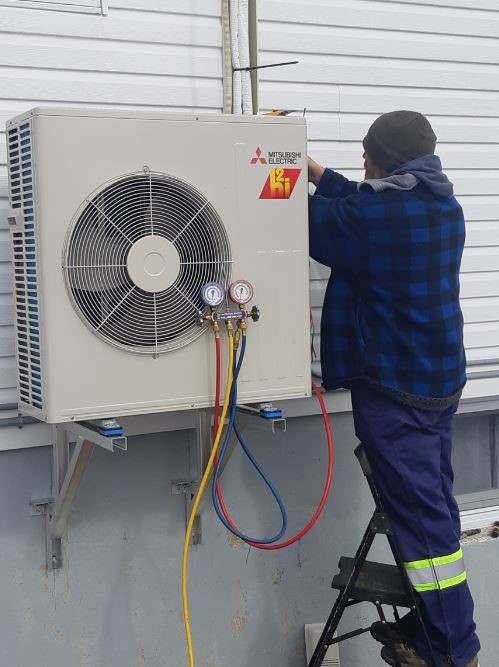
The next challenge was to get an expert to recommend the number of heat pumps required to heat the building, and estimate the cost of buying and installing them. After doing our research, we learned the most suitable heat pumps for our needs were the Mitsubishi brand. They were a moderately expensive brand but carried a ten-year warranty, and had great reviews.
We consulted experts in selling and installing this brand to give us a quote on the required number to satisfy our heating requirements. They recommended four heat pumps, 18,000 BTUs—three upstairs and one in the church hall, in the basement, at a total cost of $26,841.
Where could we get this vast amount of money with such a small congregation? We decided to have a Memorial Hymn Sing on the third Sunday in June, which was Father’s Day, to see how well our congregation, their family and friends would support our plan. We were astonished with the response, which was a very important lesson learned. “You never know what you can accomplish unless you try.”
We raised $8,300, which was a third of the cost. Where could we get the other two-thirds?
Our minister suggested we contact Faithful Footprints, which gave a grant to his former church in New Brunswick. I made an internet inquiry, followed by a telephone conversation, lasting more than an hour, with Stephen Collette, the building audit manager for Faith and Common Good, which administrates the Faithful Footprints program. He gave me a very positive response and encouraged us to make an application. The final steps were to gather the information required for the application, fill out the forms online, and click send.
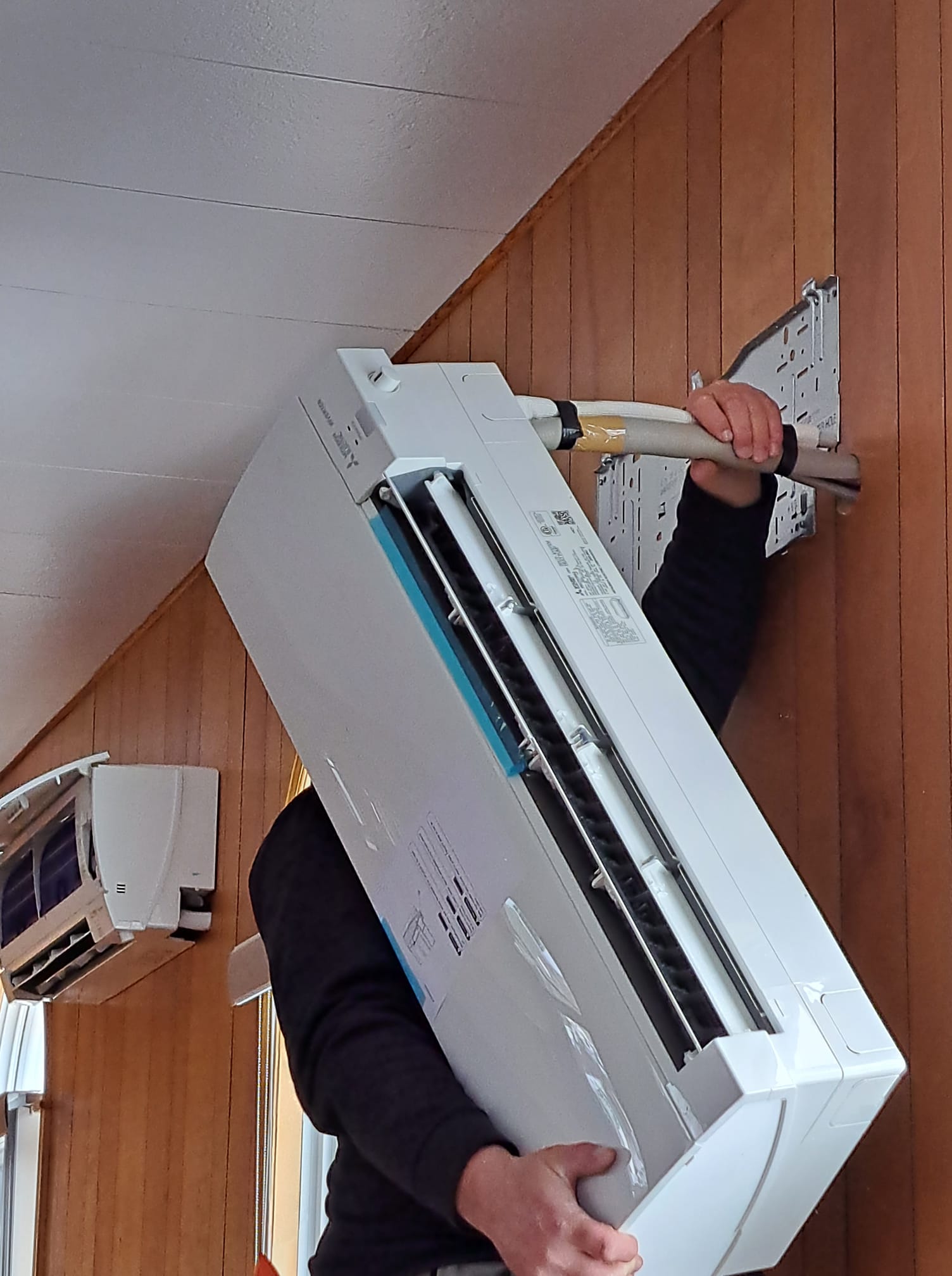
A short time later we received the astounding news that our application was approved. We ordered the heat pumps and in three weeks they were installed, on April 3, 2023. The heat pumps were dedicated on Earth Sunday, April 16, to let all our supporters know we have accomplished our goal of reducing our carbon footprint, to help the greening of the earth.
We will use the remaining funds to install LED light bulbs in all light fixtures in the church, new door seals to prevent heat loss, and purchase insulation for the attic, as well as removing and disposing of the old oil furnace.
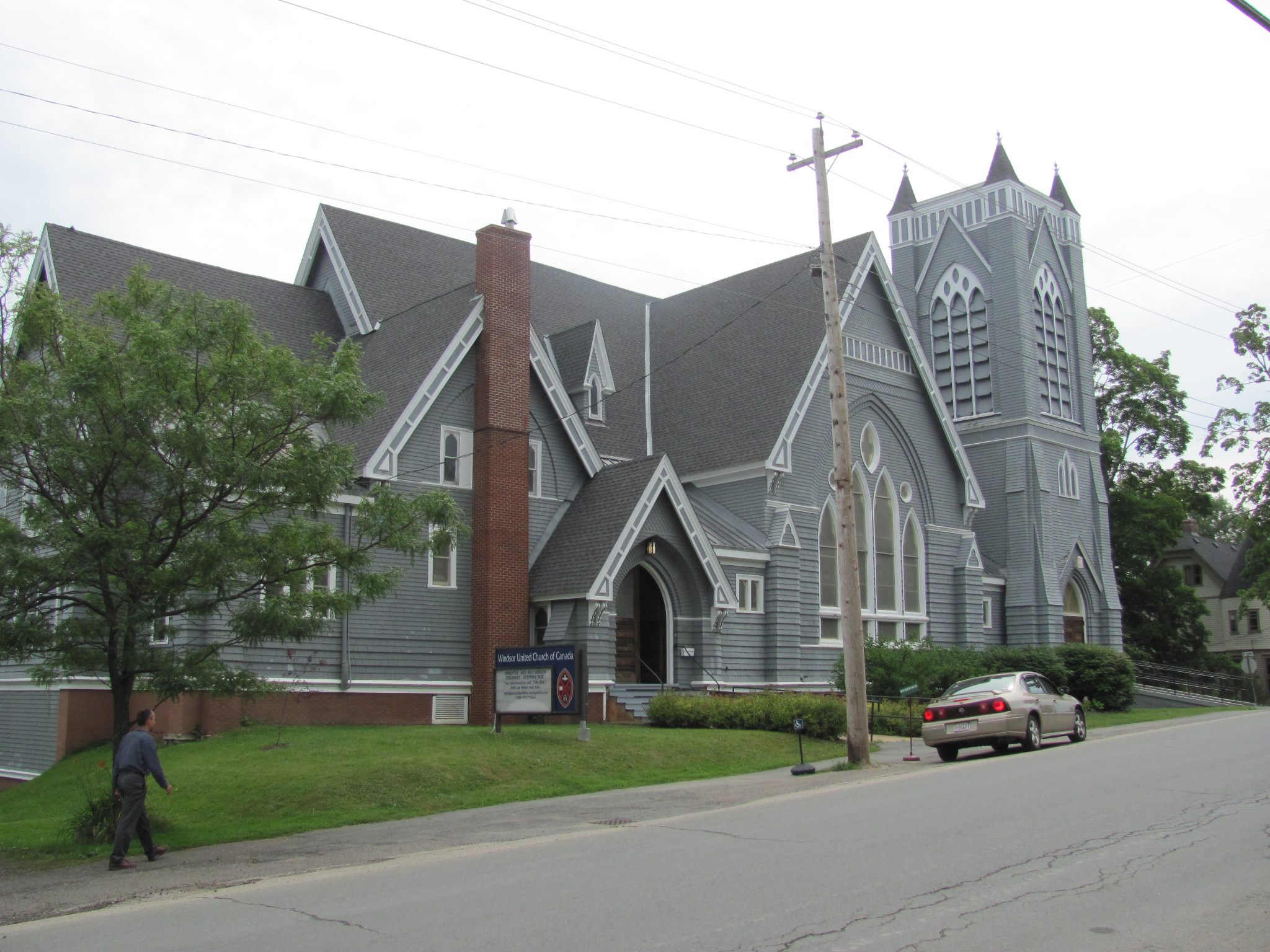
Windsor United Kicks the Oil Habit | April 6, 2023
Windsor United Church in Windsor, Nova Scotia is a late-Victorian beauty. Congregants and visitors can gaze upward over ornate wooden walls, 50 feet to the ceiling above. With a 5,600-square-foot sanctuary and a 2,600-square-foot annex and office space, it's also a beast. Last year, the congregation paid $18,000 in heating oil and $8,700 for electricity. But with funding from Faithful Footprints and Efficiency Nova Scotia, Windsor United has made the transition--oil is now a rarely-used backup, only for the coldest days.
How Windsor United is Kicking the Oil Habit | April 6, 2023
Tony Duke, who is on the property committee of Windsor United, recalls a moment when it hit them all, just how much oil they were saving. "One of our property members, " he says, "was there when the oil truck pulled up. The guy puts the nozzle in the pipe, flicks it on. Stops.
"He pulls it out, looks down, sticks it back in. Did it all again. And finally he said to our member, 'I haven't been able to put any oil in for the last two visits.'
"And we had been nervous about heat pumps being able to keep up with winter."
Admittedly, it's been a mild winter in Nova Scotia. Windsor United uses their heat pumps except on days below -8 degrees Celsius, which has been a rarity. But they were able to replace one furnace and use the other only for backup.
As is the case with any good energy retrofit, it's not just the source energy. One of the buildings biggest challenges was insulation, foam that had been installed in the 1970s--fifty years ago. It has since dissolved into a powder, Duke says. "So no insulation."
The formaldehyde foam used to insulate the attic in the 1970s had deteriorated to a powder that the team had to vacuum out before they had the sanctuary ceilings insulated with high density foam. Then, in 2023, they insulated all the exterior walls and the ceiling over the annex with high density cellulose.
The property committee--six people at the time, most of them in their seventies--was dedicated. Each day two or three would show up and help with the work, leading insulators up into the attic, crawling over ancient wooden beams. "I really admire the insulators for hauling hose up there to blow it in," Duke says.
The price associated with buying and installing enough heat pumps for the space was a larger deterrent, but the church trustees were also committed to the cause. One had installed solar panels on his own house and felt compelled to reduce impact on the environment. But Duke credits funding from Faithful Footprints, a funding program from the United Church Canada aimed at reducing the Church's carbon footprint 80 percent by 2030, and small-business rebates from Efficiency Nova Scotia, for swinging the balance. In all, the church invested $111,000 in energy retrofits. The majority, $69,000, was covered by the two programs.
The heat pumps have not only been sufficient for the winter, they've created a more comfortable climate in the office--where it used to get far too warm--and in meetings rooms and an assembly room. "Everybody has been amazed with the heat pumps," Duke says. "We're keeping them at a steady, comfortable temperature. Everyone is very pleased."
The next step is to replace all the lighting with LEDs, which will further improve efficiency and reduce greenhouse gas emissions. For Duke, the greatest reward is knowing their impact on the climate has been reduced. That's important for such a pillar of the community.
"The value is sustainability," he says, for the church and the planet. "We do a lot of outreach in community. We help the food bank. We do community activities like theatrical productions. Schools have concerts. A local AA group meets here. We’re not going to close the church."
Now, he hopes they can inspire other congregations. Windsor United is holding an open house on Earth Day, April 22, from 9:00-11:30 a.m. It is part of the national Faithful Footprints Retrofit Tours Earth Week Series.
"We want to bring congregations in surrounding communities in, and give them some positive reasons for going green. I strongly encourage other churches to take advantage of FF and other programs to reduce or even eliminate their carbon footprints."
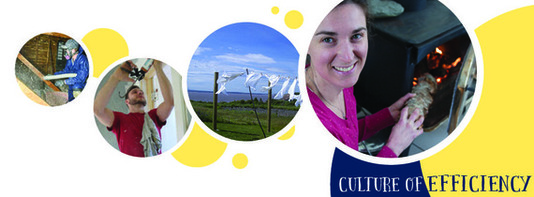
Culture of Efficiency Newsletter | March 27, 2023
The Ecology Action Centre publishes the Culture of Efficiency Newsletter on a monthly basis to keep subscribers up to date on energy efficiency news and events in Nova Scotia. This work intends to build community and provide Nova Scotians with information and opportunities they need to stay involved in energy efficiency movement. Subscribe here!
Culture of Efficiency Newsletter | March 27, 2023
Efficiency Nova Scotia Spring Rebate Campaign
Investing in a larger appliance for your home? From March 31 to May 20, 2023 Efficiency Nova Scotia is running their Spring Instant Savings Campaign. During this time, additional products will be added to a list of instant in-store product rebates that you can access automatically when you visit a participating location. You can save up to $400 at the checkout and collect savings over time with your energy efficient upgrades. Find rebates near you!
Better Building Speaker Series
Join EAC and three organizations collaborating to build the new Mi'kmaq Centre for Healing and Resilience which will be run by the Nova Scotia Mi’kmaq Women’s Association. Young Soaring Eagle, Outside! Landscape Architects and Solterre Design will discuss how the Resilience Centre prioritizes intersectional sustainability to build a safe space for the community. The webinar will be held on May 30 from 4:00 p.m. to 5:30 p.m. Register now!
Tell your MP to Take a Stand for Energy Poverty
The 2023 Federal Budget will be released next week on March 28 in the House of Commons. We don't know what to expect, but we hope the budget will include the government's plan to invest in and implement a low-income energy efficiency strategy that will extend support to the millions of Canadians who are currently excluded from home energy efficiency programs and who are struggling to meet their home energy needs. Although the budget is largely crafted at this stage, you can still encourage your MP to take a stand for energy poverty when it is tabled on the 28th. There is likely still more work to be done to ensure that energy efficiency reaches and benefits all Canadians. Email your MP now!
Heating Assistance Rebate Program
The Heating Assistance Rebate Program is now open to help low-and moderate-income Nova Scotians with the cost of home heating. Rebates are $1,000 (instead of $100 to $200) for qualified households. Eligibility criteria and certain supporting documents are needed. It should take around 8 weeks to get your rebate. There is no cost to apply for the rebate, you can apply online until March 31, 2023. Check your eligibility.
EV Charging Rebates for Multi-Unit Residential Buildings
Apartment or condo owners can apply for one of two rebates that make electric vehicle chargers more accessible.
-
The EV Ready Approach
-
The Standalone EV Charger
Both rebates are an option for new construction and existing buildings. Learn more about the rebates and how to apply by visiting Efficiency Nova Scotia's website. Learn more about the rebate!
Open Letter to the Minister of Environment and Climate Change
Citizens for Public Justice has an open letter to the Minister of Environment and Climate Change and are looking for signatories from the faith community.
-
The political asks of the letter include
-
Increasing Canada's greenhouse gas reductions target
-
Support for climate adaptation
-
Please sign the letter today and invite others to as well.
-
Creating a national strategy on Environmental Racism and Environmental Justice (Bill C-226)
-
Improving Canadian corporate accountability internationally, particularly on resource extraction issues (Bill C-262 and C-263)
LinkedIn Group for Newcomers
A new LinkedIn group has been created to help Newcomers looking to work in the green jobs sector! The group is intended to help newcomers connect and support one-another with career development. Follow the link below to join! Go to LinkedIn and join.
New Ice Project Accelerator
Indigenous Clean Energy (ICE) recently announced the launch of the Bringing It Home Project Accelerator! The Project Accelerator is a new program designed to support the start-up and development of Indigenous energy efficiency housing projects. Applications are open from March 8, to May 19, 2023. Apply today to become a Project Steward! Learn more and apply.
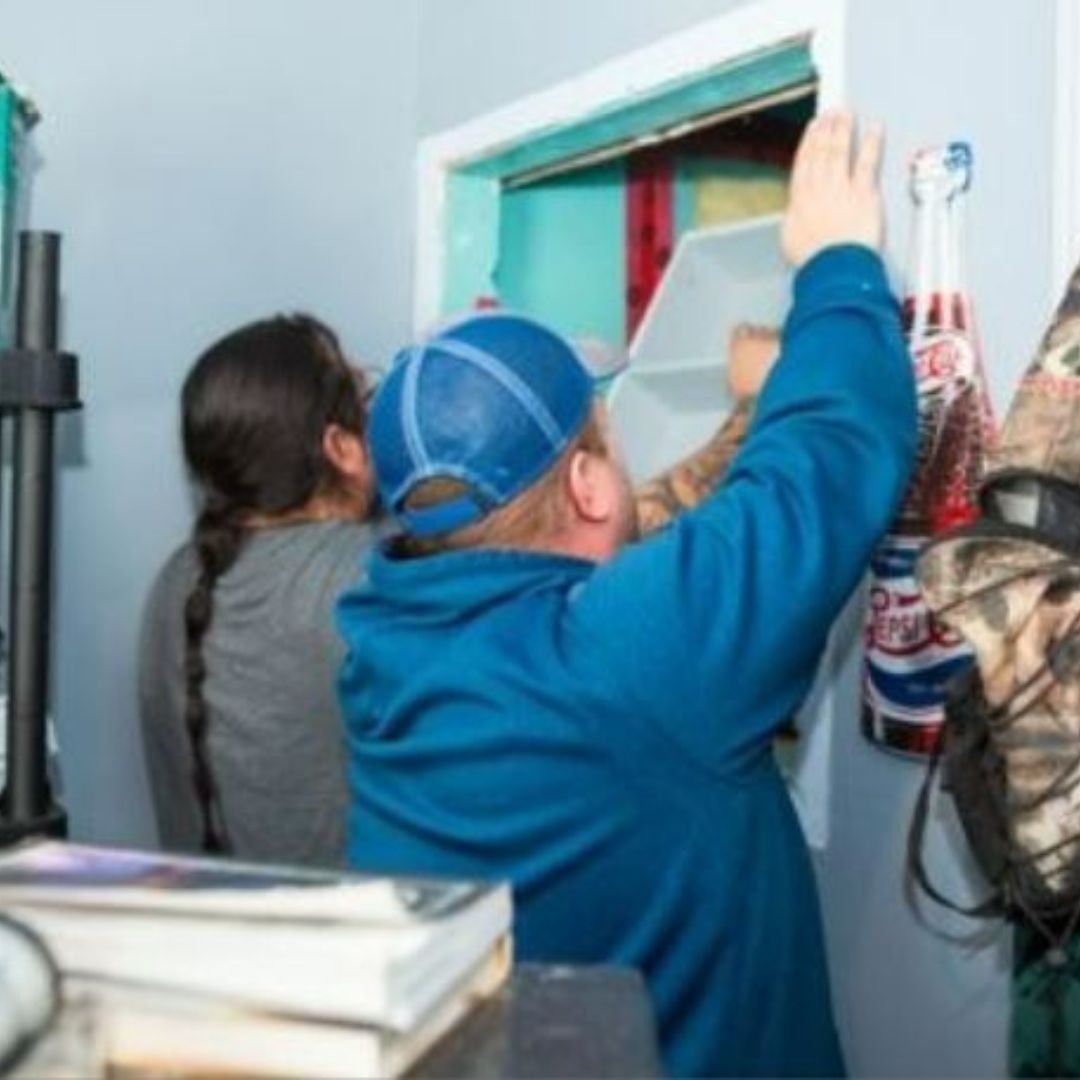
WATCH: Energy efficiency in Millbrook First Nation | March 20, 2023
In February 2023 the Ecology Action Centre's Energy & Climate Team visited Millbrook First Nation to meet with local experts and community members and talk about energy efficiency in the home. Watch this video for information about how to access rebates for new technology and how to maintain equipment for maximum performance and to save money.
WATCH: Energy efficiency in Millbrook First Nation | March 20, 2023
Please watch this video for information about how to access rebates for new technology like heat pumps, HVAC systems and light sensors and timers, and how to maintain equipment for maximum performance and to save money. Thank you to the Millbrook First Nation Housing Department for hosting the event and to our partners: Efficiency Nova Scotia, the Union of Nova Scotia Mi'kmaq and the Confederacy of Mainland Mi'kmaq.

WATCH: Decarbonization efforts by the United Church of Canada faith communities in Atlantic Canada | March 14, 2023
Created by the Regional Climate Justice Group of the United Church, this video looks at the efforts of congregations in Central Labrador and Nova Scotia to reduce their carbon footprint through energy efficiency initiatives, supporting a just transition and including environmental stewardship as part of everyday spiritual practice.
Supported by:


